 02/10/2010 20:45 02/10/2010 20:45 |
|
| | | OFFLINE | | Post: 21.133
Post: 3.770 | Registrato il: 28/08/2005
Registrato il: 20/01/2009 | Administratore | Utente Master | |
|


 Please see preceding page for stories posted earlier today, 10/2, including the full translation of the Holy Father's remarks after the concert last night.
Please see preceding page for stories posted earlier today, 10/2, including the full translation of the Holy Father's remarks after the concert last night.

 Strange to find this necessary and essential wrap-up of the Pope's visit in an Irish newspaper, of all places (a belated post on my part). An essential wrap-up because it takes into account the immediate material benefits of a papal visit to the host country, especially the host cities - an aspect that I do not recall having been adequately reported, if it was noted at all by media, in the Pope's previous trips.... The figures cited in this article underscore even more emphatically the egregious failure of the anti-Pope, anti-Church legions to downgrade the visit in any way!
Cities hail Pope’s visit a huge success
Strange to find this necessary and essential wrap-up of the Pope's visit in an Irish newspaper, of all places (a belated post on my part). An essential wrap-up because it takes into account the immediate material benefits of a papal visit to the host country, especially the host cities - an aspect that I do not recall having been adequately reported, if it was noted at all by media, in the Pope's previous trips.... The figures cited in this article underscore even more emphatically the egregious failure of the anti-Pope, anti-Church legions to downgrade the visit in any way!
Cities hail Pope’s visit a huge success
in terms of goodwill and commerce
By ELAINE SHERIDAN

Sept. 30, 2010
POPE BENEDICT XVI’s four-day visit to Britain was hailed a tremendous success after nearly half-a-million people turned out to see him in the flesh.
But there was also millions made by businesses across the country as a result of the first ever State visit here by a Pope.
Planes, trains, boats and automobiles brought pilgrims from far and wide to see the Holy Father in Scotland, the West Midlands and London during the momentous trip.
And the impact of the historic visit not only had a lasting spiritual effect on those places but economically it brought financial success to groups including hotels, restaurants, bars, retail outlets and travel companies.
Birmingham Chamber of Commerce spokesman John Lamb said the visit was immense — bringing an estimated £12.5million to the city.
He said: “The impact of the visit was immeasurable. It goes beyond pounds and pence, it’s a lot more than that. The global exposure that we got was priceless and the monetary value will be outweighed by the goodwill.”
Graham Bell, spokesperson for the Edinburgh Chamber of Commerce, echoed those sentiments, saying: “Before the visit there was considerable negative press in Britain. The reality is that the Pope absolutely charmed people when he got here and admitted his own preconceptions had moved on.
“Economically the State visit was very welcome. It shut Edinburgh for the day but I heard very little grumblings about that. But what the visit did do was show Edinburgh as Scotland’s capital on the world-wide stage. Millions of pounds in revenue were made by various organisations in the city and the place was absolutely heaving.”
He added: “It’s very difficult to calculate just now but we’re definitely not out of pocket from the visit, even though £4million was spent on the day — the benefits outweighed everything.”
Hotels were booked to capacity for the event and restaurants welcomed extra bookings over the four days.
Derek McDonagh from Jury’s Inn on Broad Street, Birmingham said the hotel did have increased bookings, with many travelling over from Ireland for the occasion.
He said: “We did indeed have a very successful weekend and some of this can be related directly to the Pope’s visit. I have seen a notable increase in Irish visitors and a lot of them were very excited about the Pope’s visit, in particular the children, which was great to see.”
And ferry company Stenaline said numbers were up on its northern route, with passengers travelling from Belfast to Stranraer to see the Holy Father on the Scottish leg of the tour.
Although official merchandisers would not comment on figures, it is estimated tens of thousands of pounds in revenue was made selling all sorts of memorabilia including candles, mugs, flags, T-shirts, cups and commemorative programmes to the masses.
[Modificato da TERESA BENEDETTA 02/10/2010 20:47] |
| |
|
| |
 02/10/2010 21:42 02/10/2010 21:42 |
|
| | | OFFLINE | | Post: 21.134
Post: 3.771 | Registrato il: 28/08/2005
Registrato il: 20/01/2009 | Administratore | Utente Master | |
|
 Honoring Cardinal Sodano
Honoring Cardinal Sodano
for major anniversaries
on his name day
Translated from the 10/3/10 issue of

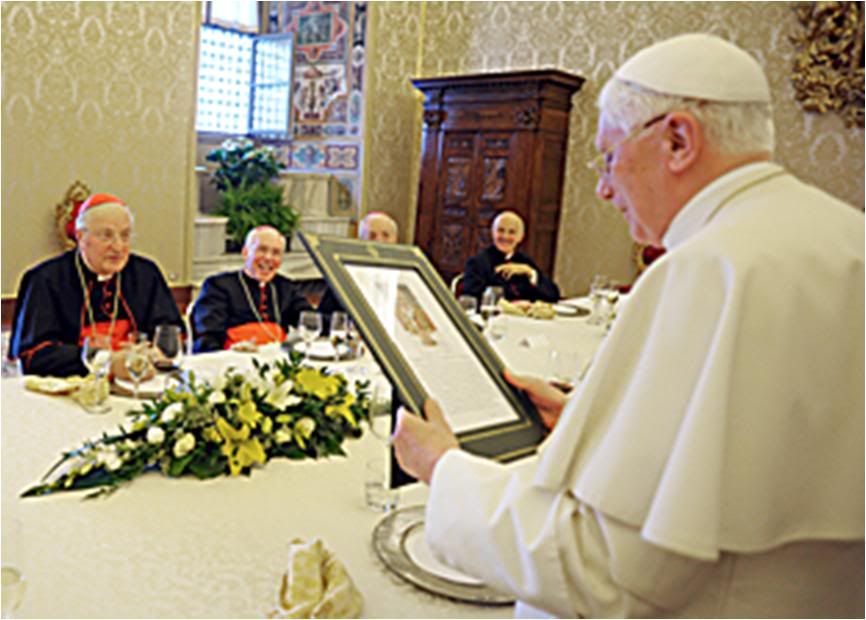
A luncheon in honor of Cardinal Angelo Sodano on Saturday, Oct. 2, in the Sala dei Paramenti (Hall of Garments) of the Apostolic Palace.
The occasion was the 60th anniversary of his priestly ordination and the 50th in service to the Holy See of the Dean of the College of Cardinals, who is 83. The anniversaries fall on his name day, the feast of the guardian angels.
The luncheon was offered by Benedict XVI. The guests included Cardinals Tarcisio Bertone, Roger Etchegaray, Giovanni Battista Re, Leonardo Sandri and Giovanni Lajolo; Archbishops Fernando Filoni, deputy secretary of state for internal affairs, and his foreign relations counterpart, Dominique Mamberti; Manuel Monteiro de Castro, secretary of the Congregation for Bishops and of the College of Cardinals; Mons. Peter Bryan Wells and Ettore Balestrero, counselors at the Secretariat of State; and the Pope's private secretaries, Mons. Georg Gaenswein and Alfred Xuereb.
At the end of the meal, the addressed words of gratitude to Cardinal Sodano and presented him with a framed letter and photograph to commemorate the occasion.
I certainly hope no one in the media will exploit this gracious fraternal gesture by the Holy Father to once more make malicious and invidious insinuations of any unholy alliance between him and Sodano (whom the media has portrayed as being responsible for 'protecting' figures like the now departed Cardinal Groer and Fr. Maciel from sex-abuse investigations when he was John Paul II's Secretary of State).
|
| |
 03/10/2010 00:24 03/10/2010 00:24 |
|
| | | OFFLINE | | Post: 21.135
Post: 3.772 | Registrato il: 28/08/2005
Registrato il: 20/01/2009 | Administratore | Utente Master | |
|
 From the blog of Fr. Thomas Rosica, who is the director of Canada's Salt and Light Catholic TV channel, here is the full text of a lecture given on Sept. 28 by John Allen to the University of St.Michael's College in Toronto. It's a very well articulated presentation, and I was hoping I would not have to dispute too many points, but there are quite a few that I felt needed a countervailing view, generally those points of contention that I have increasingly raised about Allen's reportage and commentary.
Covering the Vatican and the Church:
From the blog of Fr. Thomas Rosica, who is the director of Canada's Salt and Light Catholic TV channel, here is the full text of a lecture given on Sept. 28 by John Allen to the University of St.Michael's College in Toronto. It's a very well articulated presentation, and I was hoping I would not have to dispute too many points, but there are quite a few that I felt needed a countervailing view, generally those points of contention that I have increasingly raised about Allen's reportage and commentary.
Covering the Vatican and the Church:
A reflection on communications
challenges facing the Church today
by John L. Allen, Jr.

Oct. 1, 2010
My subject tonight is the much-bemoaned one of the Vatican’s PR problem. Complaining about the communications inadequacies of the Vatican is, of course, a favorite indoor sport among Catholics. My own personal favorite way of making the point is this: When I am asked what I think of the Vatican’s communications strategy, I usually say that as soon I see evidence they’ve got one, I’ll tell you what I make of it.
Much of that, naturally, is unfair. In the period since the Second Vatican Council, the Vatican has become far more sensitive to public communications than it once was, in keeping with Pope John Paul’s famous 1984 injunction that the Catholic Church should be a “house of glass” in which everyone on the outside can look in and see what’s going on.
When the Vatican communicates effectively, it often means that no controversy is stirred, no heartburn is generated, and hence no one notices. It’s only the meltdowns and debacles that grab attention.
Moreover, I think everyone who knows him personally would agree that the present Vatican spokesperson, Fr. Federico Lombardi, is a kind and deeply intelligent soul who does everything in his power to respond effectively and in a timely fashion to the legitimate questions reporters put to him.
It’s also the case, of course, that there is often a riot of voices speaking in and for the Holy See, and it’s beyond the capacity of anyone, Lombardi included, to keep them in concert.
That said, there is also abundant evidence of a chronic and serious weakness when it comes to relations with the media and with the broader public, some of which is institutional and historical, some of which is managerial and personal. That’s a problem not just for the Vatican but for all of you involved in the life of the Church, because, of course, you’re the ones left to pick up the pieces when the latest bomb explodes in Rome.
I want to examine the subject tonight in the hopes that it might not only prompt some ideas about the Holy See, but also some broader lessons about the whole enterprise of church communications.
Before coming to that, however, two caveats.
First, by examining the Vatican’s PR woes, by no means do I want to suggest that the problem lies entirely on the Church’s side of the equation. As a media professional, I am well aware of the almost shocking degree of religious illiteracy that characterizes a broad share of the working press, which leads to superficial and sometimes wildly inaccurate reporting on religion which wouldn’t be tolerated if the subject were politics or business or even sports or entertainment.
I’m also well aware of my profession’s penchant for controversy and crisis, and I would concede that some in the media, though I believe it to be a small minority, have axes to grind against the Church.
In other words, one could easily devote an entire lecture like this to the topic of the media’s inadequacies when it comes to the Vatican, rather than the Vatican’s problems with the media. Alas, I see no evidence that the New Jerusalem is scheduled to arrive anytime soon, and thus we are constrained to operate in the media environment as it presently exists. In other words, I intend to dwell tonight in the world of “is,” not the land of “ought.”
Second, I also don’t want to suggest that the challenges facing Roman Catholicism in the early 21st century can somehow be reduced entirely to matters of image and spin. Whether the question is the sexual abuse crisis, or the vocations shortage, or the implications of an accelerating demographic shift within Catholicism from the global North to the global South, we face weighty questions that can’t simply be massaged away with new “imaging” techniques.
At best, a more thoughtful PR approach can do no more than clear away the debris of misunderstanding and false debates, so that we can face the real challenges head-on … and the rest of the world can watch us doing so, without the burden of false assumptions about the church’s motives, priorities, and agenda.
With that, let me sketch how we’ll proceed. I’m going to briefly consider three recent case studies in Vatican communications, two of them cautionary tales about what not to do, and one of them an example of how to get things right. At the end, I’ll offer three lessons to be learned which I believe are widely applicable in the life of the Church.
Case Study One: The Trip to Africa
Pope Benedict XVI traveled to Cameroon and Angola in March 2009, marking his first trip to Africa. The specific motive for the trip was to present the working document for the Synod for Africa to take place later that year, but more broadly the Holy Father’s hope was to spotlight the incredible dynamism of the African church and so many African societies, as well as to raise global consciousness about the urgent humanitarian and development issues facing Africa.
Alas, precious little of that was reflected in reporting on the trip in the Western media, which was instead dominated by a firestorm created as a result of comments the Pope made aboard the papal plane from Rome with regard to condoms and AIDS.
In a nutshell, the Pope argued that personal responsibility, not condoms, is the key to resolving the AIDS crisis; indeed, he said, condoms make the problem worse. That line became the shot heard round the world, and generated a fierce backlash among anti-AIDS activists and secular society generally, especially in the West.
In an unprecedented move that foreshadowed things to come, the Belgian Parliament voted to formally censure the Pope, and the Spanish government under Prime Minister Zapatero announced that it would ship one million condoms to Africa in protest.
The “great condoms debate” utterly obscured any other feature of the trip for days, exacerbating impressions that the Pope and the Church are out of touch and so phobic about sex that we’re willing to ignore scientific and medical reality. Only much later into the media cycle did four other points become clear:
• Whatever one makes of the Pope’s comment, the sentiment is widely shared among the Catholic bishops of Africa. Almost to a person, they will tell you that the condoms which reach Africa are often expired and defective, and in any event, that a young African male often regards a condom as a kind of talisman that renders him immune to harm, thereby inducing him into even riskier behaviors.
In other words, this was an instance in which the Pope was speaking collegially, articulating the conviction of the local episcopacy, rather than imposing his own view.
[An aspect of the Pope's awareness of current events which the MSM almost always overlook is the direct 'briefing' he gets from his bishops around the world when they come to the Vatican during their once-every-five-years ad limina visit. This supplements the regular reports he gets through the Apostolic Nuncios in over 170 countries, the Congregation for Bishops and the Congregation for the Evangelization of peoples, not to mention worldwide Caritas and the Pontifical Cor Unum. A recent report on the Church underscored how the diplomatic network of the Vatican continues to be an excellent source of nation-based information as it was for much of the second millennium.]
•The same belief is held by a wide cross-section of other religious leaders in Africa. I know this because I interviewed the Imam of the National Mosque in Yaounde, the capital of Cameroon, who told me that his only regret about the Pope’s comment was that he didn’t wait until he had arrived so they could have said it together.
•There is empirical evidence to suggest that reliance on condoms is not the most effective anti-AIDS strategy. Research by Edward C. Green of Harvard University shows that programs emphasizing abstinence and marital fidelity have brought down infection rates more successfully than those which rely primarily on condoms. Green says that’s for three reasons: people often don’t use condoms correctly; they stop using them when they believe they know the other person; and condoms generate a false sense of security. [The main studies cited by Green and other researchers are not empirical evidence at all - they are full-blown epidemiological studies validated by statistical tests!]
•Many secular AIDS experts in Africa, unaffiliated with the Catholic church, also hold the same view. Vanessa Balla, a non-Catholic physician in Cameroon who treats AIDS patients, told me, “With condoms, people think they can do whatever they want. I’ve seen it myself … they take as much risk as possible.” Insisting that “it’s incredibly hard to watch young people dying of AIDS,” Ballas said the solution is “not condoms, but changing behavior.”
Knowing those four things may not ultimately change someone’s mind, but they obviously make the Pope’s comment far more difficult to simply dismiss. [But to those who mistrust subjective opinion, why can they not accept the validated studies by Dr. Green and other AIDS researchers that had been published in scientific journals including the British Lancet long before the Pope made his statement? Even if Lancet in March 2009 chose to conveniently forget that it had published such a study earlier! Why does not Allen himself accept the validity of those studies? Especially since there appear to be no comparable studies that contradict their findings!]
What lessons should be learned from this episode?
Let’s grant that Benedict XVI could not have traveled to Africa and ducked the issue of AIDS and condoms. Let’s also stipulate that Vatican officials could have, and should have, anticipated that whatever Benedict XVI said would attract wide interest, running the risk of being misrepresented or caricatured.
In that context, four steps suggest themselves.
First, the primary aim of Benedict’s six-day trip was to throw a spotlight on Africa, especially the dynamism of the Catholic church on the continent. Thus when the AIDS question came up on the plane, Benedict could have said something like: “That’s a very important issue, and I’ll talk about it two days from now during my visit to the Cardinal Léger Center for the Suffering on Thursday. For now, however, I want the focus to be on good news from Africa.”
Such a reply would have ensured that journalists had to file day-one stories on the broader African situation, without feeding impressions that the pope was ducking the condoms question. It also would have created global interest in his visit to the Léger Center, one of the most visually striking moments of the trip, as it put the pope in direct pastoral contact with sick and disabled people.
Second, when Benedict did talk about condoms, the Vatican could have arranged for him to be flanked by other African religious leaders — Catholic and Anglican bishops, Pentecostal preachers, Muslim imams, and leaders of traditional tribal faiths, all of whom would have echoed his argument. I can tell you from personal experience that they were not hard to find.
Third, the Vatican could have arranged to have secular African AIDS experts such as Balla on hand, with no ties to the Catholic church, who could have offered their expertise in support of the pope’s argument. Both the religious leaders and secular AIDS experts could have been made available to reporters at the press center in Yaounde immediately after the Pope’s speech.
Fourth, Lombardi and his aides could have assembled a packet of empirical studies demonstrating the limits of anti-AIDS efforts based on condoms, featuring the Green study from Harvard. That packet could have been distributed shortly before the Pope’s speech [It was not a speech, and Lombardi could not have anticipated what the Pope was going to answer. He only gives him the questions and perhaps, they discuss which ones to choose. But I don't think the Pope would even think of discussing what his answers would be!], so that it figured in the first cycle of stories and TV commentary.
Journalists should not have had to wait forty-eight hours to read about Green’s work in an op/ed piece in [SCThe Washington Post — a piece, by the way, that seemed to catch the Vatican completely by surprise.
None of this would have prevented protests about the pope’s remarks, especially given that there’s a legitimate debate to be had about the proper role of condoms in anti-AIDS efforts.
Such a strategy, however, would at least have made it more difficult to portray Benedict XVI as isolated, out of touch, and uncaring, which was the storyline that dominated the African journey.
{Coulda, woulda, shoulda! The Pope is a truthful and direct-speaking person. Does anyone really expect him, at age 83, after a lifetime of speaking his mind, to suddenly consider how he should answer any question posed to him in the light of its PR implications, much less to improvise a communications strategy on the spot? That is not his job at all.
In the end, the short-term negative fallout in terms of media coverage and the Pavlov-dog reactions of the robo-bureaucrats in Brussels and Madrid were reallycpar for the course, in terms of how MSM covers the Church and the Pope anytime they articulate positions that are anathema to the dominant worldview. They would simply have been displaced a few days until he spoke at the Leger Center of the same things.... On the plus side, articles about authoritative studies backing the Pope's statement got enough play - not equal, unfortunately - to at least bring them to public attention in a way that they did not get when they were first published as studies, because their results contradicted the facile and smug assumptions of the condom pushers! ]
Case Study Two: The Williamson Affair
Probably everyone in this room has at least a passing familiarity with the cause célèbre surrounding the traditionalist Bishop Richard Williamson of the Society of St. Pius X, whose 1988 excommunication, along with three of his colleagues, was lifted by Benedict XVI in January 2009.
Just days before that decision was announced, an interview with Williamson done by a Swedish television network was broadcast in which he repeated claims he had previously made in other venues that the Nazis did not use gas chambers and that no more than perhaps 300,000 Jews had died during the Second World War, as oppose to the conventional estimate of six million.
The global media storyline obviously was “Pope rehabilitates Holocaust-denying bishop,” creating a crisis in Jewish/Catholic relations, doubts within Catholicism about the pope’s commitment to the Second Vatican Council, and a huge public relations embarrassment.
In the wake of the affair, Benedict XVI took the extraordinary step of issuing a letter to the bishops of the world expressing his personal anguish and apologizing for the way it was handled. [That's a strange and extreme under-valuation of what was surely an epochal letter from a Pope, unprecedented in the modern Papacy - one that was reminiscent of the Apostle Paul's letters reproving the early churches for their shortcomings!]
Let’s grant that the Holy Father’s motives for taking this step were noble. [An example of Allen's often careless formulations! Does he think at all, God forbid, that a Pope's motives could be ignoble????] In tandem with his predecessors Paul VI and John Paul II, Benedict XVI obviously is motivated to try to heal the only formal schism to follow the Council, which was the rupture with the traditionalist movement launched by the late Archbishop Marcel Lefebvre.
Moreover, as a statement from the Secretariat of State would later (and I emphasize “later”) make clear, lifting the excommunications was the beginning of a process of readmission to full communion, not the end. The four prelates still have no warrant to act as bishops in the Catholic Church, and the Society of St. Pius X has no standing. If they want full reintegration, the traditionalists will have to accept the full body of Church teaching, including religious freedom and the importance of ecumenical and inter-religious dialogue.
Nonetheless, it should have been clear that if the Holy Father was going to take this step with a man whose track record on the Holocaust is so obviously troubling, it would spark wide controversy. We now know that insensitivity to public reaction was actually more mind-boggling than it appeared, [A point I will try to rebut further down] thanks to the recent book “Attack on Ratzinger" by the accomplished Italian Vatican writers Andrea Tornielli and Paolo Rodari.
For the first time, they published the minutes of a high-level Vatican summit on January 22, 2009, which took place two days after the German publication Der Spiegel broke the story of Williamson’s comments, and one day after Swedish TV actually aired the full interview.
The meeting brought together the most senior officials in the Vatican’s power structure to discuss how to present the Pope’s decision [to lift the excommunication] . Incredibly, there was no reference at all to Williamson’s interview, as if no one had bothered conducting even the most elementary search of the media for potential problems.
[I'm not excusing at all the incompetence on many levels of the Pope's most senior circle of advisers, but perhaps their being completely oblivious to the fact that Williamson could be a PR problem is not so incredible at all, nor that it was entirely due to insensitivity or lack of foresight.
It could be that they simply took it for granted that lifting the excommunication would be taken for what it means in canonical terms - namely, that the lifting meant a reconsideration of the original offense that had brought on the excommunication, and did not imply any other judgment on the individuals concerned. Nothing else about them was relevant to the issue of excommunication. In other words, not one of this inner circle was able to step out of their habitual - i.e., ecclesiastical - frame of mind.]
Also worth noting is that two key figures were not on the guest list for the Jan. 22 meeting: Lombardi, who had to explain the decision to the world’s media, and Cardinal Walter Kasper, who had to explain it to the Jews. [I bet it never occurred to anyone at all that Kasper's presence was even necessary, considering that all of them appeared to have been ignorant of Williamson's negationism! As to the failure to iinclude Lombardi in the disucssion, one must fault Cardinal Bertone for not thinking of it, since Lombardi is directly under his orders.]
Instead, an official of the Secretariat of State led a brief discussion about a proposed statement to the press, and the minutes reflect general agreement not to grant any media interviews. A canonist was commissioned to publish an article in L’Osservatore Romano explaining the decree, but only “after a few days.” [Which all goes to prove that not one person at that meeting was thinking outside the ecclesial box! Not one was able to put himself in the shoes of the layman reading the bare news, much less in the shoes of the usually religion-ignorant reporter who would write the story!]
Looking back, here’s the thing.
Even if Williamson had never given his interview to Swedish TV, anyone looking at the situation from a PR point of view should have anticipated that once the Vatican announced these four bishops were no longer excommunicated, reporters would look into their backgrounds. Had anyone in the Vatican spent even five minutes on Google searching under the name “Richard Williamson,” his troubling history on the would have leapt off the screen, which was a matter of public record long before he spoke to the Swedes. Indeed, here in Canada Williamson narrowly escaped prosecution under your country’s hate crimes law in the late 1980s for saying essentially the same thing.
[I've said this many times before: It is simply not true that before January 20, 2009, Williamson's views were that easily accessible online! I know because I did a search 1-2 weeks after the whole affair blew up, and it was only through painstaking back references from material posted after 1/20/09 that I found the Canadian reference from the 1980s and a later article in Catholic Herald. Two sources! Not exactly a wealth of references.]
Armed with that information, the Vatican could have issued its detailed Feb. 4 statement along with the decree itself, to explain from the outset that these guys have not been “rehabilitated,” but rather given an opportunity to clean up their act. They could also have organized a press conference, so there would be TV sound bites assuring the world that this decision in no way signified a rollback on Catholic/Jewish relations or anything else.
[Again, one can look back and suppose that none of that was done because all those involved in any way with publishing the announcement considered it a simple 'good news' announcement that could in no way be controversial (except to opponents of the Lefebvrians) to be made on the day that concluded the Week for Promoting Christian Unity. Surely, no one would say they were all so incompetent across the board that they would not have done anything if they had been aware of all the implications and complications of that 'good news' announcement!]
Under any set of circumstances, failure to take such common sense steps is hard to explain. [I believe I have just presented such a set of circumstances and a plausible explanation for what seemed to be sheer incompetence and lack of foresight.][DIM]
Yet Williamson did give that interview to Swedish TV, and in that light, the revelation that the Pope’s top aides assembled two days after it went public and still seemed oblivious to the train wreck hurtling towards them is, to say the very least, alarming. [Yet none of those assembled are stupid people at all. Nor uncaring about the image of the Church and the Pope, and about wanting to get the message right and conveyed correctly. It could only have been narrowminded thinking confined within their usual ecclesial terms of reference that could have made them so naive and oblivious to factors that would have been obvious to a layman!]
Case Study Three: The Trip to the United Kingdom
There is by now a fairly wide consensus that Pope Benedict’s Sept. 16-19 trip to Scotland and England was a success. Part of that, to be sure, is merely the natural by-product of incredibly low expectations. [I disagree vehemently. If it had been a success for the simple reason that there were no embarassing incidents after all that negative hype, then yes, one might cite low expectations as a factor. But given that it was such a success on all levels - and a huge one, too, a TRIUMPH, in fact - it is uncharitable and more over, flat out wrong, to simply attribute that to 'low expectations'.]
Given the predictions of disaster that preceded the Pope’s arrival, anything that happened was destined to seem a pleasant surprise. It’s also true that one should not minimize the blowback: the estimated 10,000 people who marched through the streets of London on Saturday to protest the pontiff’s state visit represented the largest public protest this Pope has ever seen, and one of the largest in modern times.
[I don't know why Allen keeps saying this when there have been at least two gay gatherings in Rome in the past few years that were larger in terms of actual numbers (3,000 is the final number that the London police gave for the Protest the Pope march). Also, the Pope never saw the march, nor the ones in Rome, either, though he may have seen a few protest signs among the wellwishers in Edinburgh and London.]
Nevertheless, Benedict’s supporters easily outnumbered his opponents, as he drew large and enthusiastic crowds, generally surpassing the best-case estimates. Media coverage was constant and generally positive, and there’s considerable evidence that the Holy Father accomplished what he set out to do: Stimulate a national conversation about the role of religion in public life.
At the end of the trip, the editor of the Tablet – hardly a publication known as a Vatican lapdog – described the mood among British Catholics as “euphoric,” and Prime Minister David Cameron paid Benedict perhaps the ultimate British compliment by telling him that he had forced the Brits to “sit up and listen.”
By most accounts, the highlight of the trip was Benedict’s Sept. 17 speech in Westminster Hall, in the very location where St. Thomas More was tried and condemned in 1535 for refusing to acknowledge the King as the head of the Church.
Speaking before all the living former Prime Ministers of England and the cream of British civil society, Benedict made a forceful argument that religious believers and secularists need one another. Faith shorn of reason, he contended, becomes secularism and fundamentalism; reason without faith becomes inhuman ideology.
As someone who has covered all of Benedict’s seventeen foreign trips, I can testify that this was one of those rare instances in which the narrative that the media told about the trip, and the narrative the Pope actually came to deliver, more or less coincided. [How can Allen forget that the same thing happened in Turkey, and in the US, and in France, and in Sydney???? He has become victim and exponent himself of the MSM's Ground-Hog Day scenario about the Pope!]
From a PR point of view, what made the trip work? Two points seem most decisive.
First, Benedict directly addressed the sexual abuse crisis, beginning with forceful comments aboard the papal plane and continuing in three of his public addresses, including a homily at Westminster Cathedral. For the fifth time, he also met with a group of victims of sexual abuse.
Although the Church in the U.K. has largely been spared the massive sexual abuse scandals that have rocked Catholic communities elsewhere, it has been a dominant subject in the British media and has significantly influenced public opinion about the Church.
By dealing with it early and often, the Pope defused any potential criticism that he “doesn’t get it” or is attempting to duck the crisis. [And didn't he do the same thing on the way to Washington, on the way to Sydney, on the way to Malta? It was hardly unprecedented for him. In fact, he was being his usual consistent self.]]
Obviously, apologies by themselves don’t resolve the problem, and in fact Benedict finds himself in something of a box [An Allen self-certitude that I have disputed from the start, for all the reasons I cited before - chiefly, that a sincere expression of regret can never be repeated enough, and that it is not as if the Pope has nothing concrete to show in support of what he says and what he exhorts others to do]. Critics are increasingly quick to dismiss his comments and his encounters with victims as empty PR gestures, while even some of his friends wonder if continually apologizing is actually preventing the Church from moving on.
[#1) The critics will always scorn whatever the Pope says - but their attitude does not have any bearing on the actual consequences of the Pope's meetings with the victims; and #2) How can apologizing for very grave offenses whenever the occasion arises contribute to 'preventing the Church from moving on'? It's not as if the Pope's words of regret and apology are empty words unsupported by concrete efforts to do justice to the victims, bring their offenders to justice, and purify the Church of these sins. The Church did not and could not atone overnight for the excesses of the Inquisition, for example. Its atonement for all the sins that its members have committed in the name of the Church and of the Catholic religion is continuing and permanent. !]
Nonetheless, for the broad English public, to hear Benedict speak so candidly about the gravity of the crisis, and to express such determination to achieve both justice and healing, did at least allow them to listen to the rest of what he had to say.
Second, Benedict did not give his critics much ammunition, in the sense that he did not ride into town breathing fire about abortion, or condoms, or gay marriage, or any of the other hot-button issues in the Culture Wars. [That's an empty argument!When has he ever done that anywhere? Not even in Rome!]
Instead, his trip to the U.K. was a tour de force in what I’ve called his “Affirmative Orthodoxy,” meaning his determination to express traditional Catholic teaching in the most positive fashion possible. [And he has been very consistent about that from the start of his Pontificate - presenting Catholic doctrine as an omnibus YES to God's Word and will, rather than as a series of NO's. What he said in the UK, and how he said it, is no more a tour de force - as if it was something special that he brings out when he needs to - than his habitual messages from the Vatican, including his Angelus messages and seemingly circumstantial remarks, such as saying farewell for the summer to the staff at Castel Gandolfo!]
In that spirit, Benedict went to the roots of the relationship between faith and secularity, making a two-pronged case: A) in a society that prizes tolerance and diversity, believers too deserve a place at the table; B) once that right of citizenship is established, believers have something vital to contribute to a democratic society seeking to realize broad humanitarian aims.
Pitched that way, [Has he ever presented his arguments on faith and reason, and on the rightful place of faith in the public discourse, any other way????] the Pope’s argument came across as thoughtful, constructive, and impossible to write off as the ravings of a religious fanatic. [Have any of Benedict's statements, as Joseph Ratzinger and as Pope, ever been remotely considered, even by his thoughtful detractors, as 'the ravings of a religious fanatic'? C'mon, Mr. Allen, stop putting up straw men that are not relevant to the argument!]
In the end, Benedict’s “Affirmative Orthodoxy” actually made his critics seem like the out-of-touch extremists. It was hard not to laugh, for example, when Benedict was embracing the poor and sick at St. Peter’s Residence in London, run by the Little Sisters of the Poor, at the very same time that Richard Dawkins was denouncing him as an “enemy of humanity.”
Conclusion
From this brief survey of three case studies in Vatican and papal communications, what can we learn? Three broad conclusions seem to suggest themselves.
First, see the train wreck coming. [If the Pope had seen the movie Taxi Driver, he would probably retort, "You talking to me???"]
If a Church leader is going to do something controversial, prepare the ground. [See, the assumption is that a 'Church leader' necesssrily knows he is doing or saying something 'controversial'! In the best of worlds, he should, but this isn't the best of worlds.]
Naturally, this does not mean that Church leaders should never do anything controversial – were that the rule, they’d never do anything.
But one can easily anticipate that public statements about condoms and AIDS, or opening the door [What door was opened for Williamson by the Pope? In fact, the unexpected consequence of Williamson's sudden international notoriety was to have him sidelined and silenced indefinitely by the FSSPX itself!] for figures with a record of Holocaust revisionism, will be explosive and therefore should be “packaged” in such a way that the ensuing debate is at least about the real issues, and not about caricatures and mistaken assumptions.
Second, get in front of the story. In both the case of the Africa trip and the Williamson affair, the Vatican eventually issued terrific statements that laid out the facts and provided important context, making the statement or decision in question seem far more defensible.
In today’s media environment, however, “eventually” is the functional equivalent of “never.” Had those statements been issued beforehand, they would have put an utterly different frame on the public debate. Coming days or even weeks after the fact, however, they amounted to too little, too late.
[That is all very true. Perhaps that is why Joaquin Navarro Valls was quite effective as a Vatican spokesman. He was a layman who had long and previous experience with the world of secular media. He knew the usual sins of media and was therefore better prepared to be in front of a story as well as backstopping it. He was not constrained by the ecclesiastical thinking ingrained by decades of habit into senior prelates, which, for all their sophistication and exposure, neither Cardinal bBrtone, for instance, nor Fr. Lombardi, have been able to transcend when necessary.
For the Vatican to presume, for instance, that the whole world would immediately grasp that lifting the ecommunication from the FSSPX bishops was 'good news' for the cause of unity within the Church was to ignore that most Catholics themselves do not really understand the basics about excommunication. Considering the widespread and habitual ignorance of most reporters assigned to report on the Vatican, every announcement made by the Press office should be accompanied by a simple handout primer on the subject on hand!]
Third, emphasize the Catholic “yes.” In other words, when tackling a delicate issue in the public square, it’s always wise to begin with the value to which the Church is saying “yes,” rather than the behavior or law or climate of opinion to which it says “no.” This is the heart of Affirmative Orthodoxy, and it’s worth allowing the Holy Father himself to describe it.
Benedict’s most detailed explanation of Affirmative Orthodoxy came in a 2006 interview with German journalists just after his visit to Valencia, Spain, for a World Congress of Families.
Handicappers had anticipated an Ali-Frazier style showdown with Socialist Prime Minister José Luis Rodríguez Zapatero, who for many European Catholics looms as an avatar of radical secularism.
Instead, Benedict avoided direct confrontation and repeatedly accented the positive, insisting before a crowd of more than 1 million people: “Christian faith and ethics are not meant to stifle love, but to make it healthier, stronger and more truly free.”
Reporters pressed Benedict to explain why he had seemingly pulled his punches with Zapatero. Here’s the exchange, as it was recorded by the German radio outlet Deutsche Welle:
Question: A month ago you were in Valencia. Anyone who was listening carefully noticed how you never mentioned the words “homosexual marriage,” you never spoke about abortion, or about contraception. Clearly your idea is to go around the world preaching the faith rather than as an “apostle of morality.” What are your comments?
Pope Benedict XVI: Obviously, yes. Actually I had only two opportunities to speak for 20 minutes, and when you have so little time you can’t say everything you want to say about “no.”
Firstly you have to know what we really want, right? Christianity, Catholicism, isn’t a collection of prohibitions: it’s a positive option. It’s very important that we look at it again because this idea has almost completely disappeared today.
We’ve heard so much about what is not allowed that now it’s time to say: we have a positive idea to offer … I believe we need to see and reflect on the fact that it’s not a Catholic invention that man and woman are made for each other, so that humanity can go on living: all cultures know this.
As far as abortion is concerned, it’s part of the fifth, not the sixth, commandment: “Thou shalt not kill!” We have to presume this is obvious and always stress that the human person begins in the mother’s womb and remains a human person until his or her last breath. … But all this is clearer if you say it first in a positive way.
That, ladies and gentlemen, strikes me as a winning strategy indeed for Church communications.
And thank you, Mr. Allen, for ending your talk with Benedict's own words. Which prove beyond a shadow of doubt - if proof was needed at all - that he is not the naive, bumbling and stumbling Pope who often leaves a train wreck behind him, as unfortunately, you more than occasionally say outright in your own reports and commentaries!
[Modificato da TERESA BENEDETTA 03/10/2010 02:27] |
| |
 03/10/2010 03:51 03/10/2010 03:51 |
|
| | | OFFLINE | | Post: 21.136
Post: 3.773 | Registrato il: 28/08/2005
Registrato il: 20/01/2009 | Administratore | Utente Master | |
|
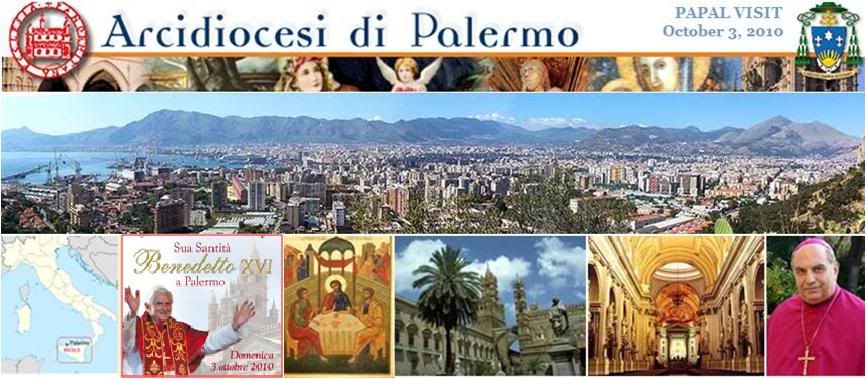 Benedict XVI's visit:
Benedict XVI's visit:
Hope for a demoralized city
by Franco La Cecla
Translated from the 10/3/10 issue of

The Holy Father arrives today in a city which is the symbol for a more general situation - that of the South of Italy, which in the last 15 years has seen a widening socio-economic gap from the regions to the north.
The reasons are the general crisis that has aggravated its specific circumstances: a society that has been fundamentally blocked in its roles and its possibilities.
Palermo, my city, is in fact held in a straitjacket that makes it difficult for young people, the less protected, and the have-nots to move ahead.
This has led to an enormous diaspora of young people (but even of men in their 40s and 50s, along with their families), a draining of vital energies that are frustrated here and which seek hope elsewhere.
Left behind, the weakest members of society remain easy prey to organized crime, and in the best of cases, to the worst kind pf welfare assistance.
In this city, one is often employed only because someone has done you the favor of being allowed to work in a jungle of under-employment and under-contracted jobs or 'socially useful work'.
A noticeable decline of services and institutions makes life in Palermo ever more impoverished and risky.
A paradoxical example is that of urban services, which has been privatized and which has led to teh suspension of a large part of the clean-up of city streets and other public places.
If one goes through the popular neighborhoods of the city center - Danisinni, Albergheria, Kalsa itself, which will be the setting for the Pope's visit - one will observe ever more concerning pockets of poverty, the closing down of asylums and structures intended to help and protect indigent children, women, families and young people in need.
The degradation which Don Puglisi* denounced decades ago in the neighborhoods most prey to the Mafia is even worse and more widespread today, according to the parish priests of Brancaccio (where Don Puglisi worked and was assassinated), of Borgo and rundown suburbs like Zen and Bonagia.
* [Don Puglisi (Fr. Puglisi) will be mentioned often during the visit. Pino Puglisi was a parish priest in Palermo who decided to fight the Mafia openly, urging his parishioners with the call "What if someone did something?". In 1993, a gunman walked up to him in front of his parish church and shot him pointblank. In 1999, the diocese of Palermo launched the cause for his beatification.]
Volunteer workers find it increasingly difficult to find resources, room to work in, or a listening ear in institutions - and violence is starting to take hold in situations which appeared to have reached some equilibrium, according to the sanitation workers in the Danissini neighborhood behind the Cathedral.
Church officials have often made appeals to city institutions, the mayor, the communal council not to forget the citizenry, especially those who are most in need.
Unemployment has increased alarmingly - Palermo has one of the highest rates in the country. The lack of concern and the ongoing degradation of urban life has led to desperate moves by the people, who have set street fires and roadblocks and occupied City Hall to manifest their despair.
Yet in this frontier-like atmosphere, the city has not skimped on spending for superficial work designed to provide a facade, to the point that it has even affected one of the most beloved popular religious feasts in Palermo. The feast of Santa Rosalia is losing its populist character as it is being transformed by city authorities into a mediatic and showy kermesse.
In the city, hope is embodied by some courageous parish priests, by a civilian society that rebels against paying protection money, and by an unexpected capacity to 'coexist' on the part of immigrant communities.
In fact, Palermo has not experienced any case of racial discrimination among thousands of Tamils, Sri Lankans, Cape Verdians, Mauritians, Filipinos, and North African immigrants. They have been integrated to the point that they now participate inhe'acchianata', the penitential ascent of Monte Pellegrino, dedicated to Santa Rosalia.
In short, there is also a Palermo that hopes and works so that the city may remain a livable place with or without the help of its institutions.
Palermo has a great tradition of vitality and variety, with a populist component that brings substance to the city's many feast days with their creative participation, even if never before has this magnificent citizenry been so humiliated.
Benedict XVI's visit could give the city a vital boost of hope.
ABOUT PALERMO
 It is rather shocking to read such a blunt account of Palermo by a native, when one has thought of it all along as the exciting, colorful and exotic metropolis that is a heady, bewildering tourist delight for its unique overlay of cultures - and whose patches of urban blight one considers to be part of its raffish character much as it is in Naples. Anyway, objectively....
It is rather shocking to read such a blunt account of Palermo by a native, when one has thought of it all along as the exciting, colorful and exotic metropolis that is a heady, bewildering tourist delight for its unique overlay of cultures - and whose patches of urban blight one considers to be part of its raffish character much as it is in Naples. Anyway, objectively....
Palermo is the regional capital of Sicily, which is the largest and most heavily populated (about 5,000,000) island in the Mediterranean. The city itself has about 900,000 residents.
The area has been under numerous dominators over the centuries, including Roman, Carthaginian, Byzantine, Greek, Arab, Norman, Swabian and Spanish masters. Due to this past, to the cultural exchange that for millennia has taken place in the area, the city is still an exotic mixture of many cultures. Many of the monuments still exist giving the city a somewhat unique appearance.
The city of Palermo, including the province of Palermo, has around 1,300,000 inhabitants and has about 200 km of coastline. The old town of Palermo is one of the largest in Europe, full of references to the past.
Palermo reflects the diverse history of the region in that the city contains many masterpieces from different periods, including Romanesque, Gothic, Renaissance and baroque architecture as well as examples of modern art.
The city also boasts a rich vegetation of palm trees, prickly pears, bananas, lemon trees and other tropical verdure. The abundance of exotic flora was noted by the German writer Goethe who in April 1787 visited the newly opened botanical gardens, describing them as "the most beautiful place on earth".
Over 2,700 years old, the city was founded by the Phoenicians, but named by the Ancient Greeks as Panormus meaning 'the largest port of all'. Palermo became part of the Roman Republic, the Roman Empire and eventually part of the Byzantine Empire, for over a thousand years. From 827 to 1071 it was under Arab rule during the Emirate of Sicily when it first became a capital.
Following the Norman reconquest, Palermo became capital of a new kingdom (from 1130 to 1816), the Kingdom of Sicily. Eventually it would be united with the Kingdom of Naples to form the Two Sicilies until the Italian unification of 1860.
It is Sicily's cultural, economic and touristic capital. Numerous tourists are attracted to the city for its good Mediterranean weather, its renowned gastronomy and restaurants, its Romanesque, Gothic and Baroque churches, palaces and buildings, and its nightlife and music. Palermo is the main Sicilian industrial and commercial center, the mains sectors being tourism, services, commerce and agriculture.
For cultural, artistic and economic reasons, Palermo was always one of the largest cities in the Mediterranean and is now among the top tourist destinations in both Italy and Europe.
A Sunday Times of London travel guide about Palermo last year began with these paragraphs:
What are we going to do about Palermo? Italian politicians are always asking this question. Because the Sicilian capital has long been a byword for corruption, vice and decadence – although the coffee’s quite fabulous.
So what do you do about Palermo? The answer is, you sit back and enjoy it – because this magnificently chaotic, sumptuously ancient city is one of southern Europe’s greatest spectacles.
In few other places can you find such heady flavours, jumbled so close together: the palazzi of medieval princes inhabited by families of paupers, catacombs full of corpses underneath restaurants full of billionaires.
In the old town, grandiose Baroque churches such as the Chiesa del Gesù gaze serenely over 1,000-year-old working-class quarters including the Albergheria; not far away, Rococo fountains splash in the shadow of palaces dating from Muslim times.
And the whole of it is set on a sparkling blue bay, under the noble Sicilian sun, next to one of the most high-fashion beaches in Europe: the Mondello.
That said, you still have to tread a little carefully. Millions might have been poured into Palermo – and many of the worst slumlands improved – but at night the dingiest corners maintain a soupçon of menace. And the Mafia, they say, still collect their ‘dues’ for ‘protection’.
But unless you want to set up a pizzeria in the middle of the barrios you won’t encounter this unsavouriness. What you will discover is a city of princes, a gangsters’ paradise, and the peerless capital of a flamboyant forgotten civilisation: Islamo-Norman Sicily. However you savour it, Palermo, like its coffee, is pretty perfetto.
 The Pope in Palermo:
The Pope in Palermo:
In memory of those who fell
at the hands of the Mafia
by Salvatore Izzo
[IMG]  [/IMG]
VATICAN CITY, Oct. 2 (Translated from AGI) - The sacrifice of Don Pino Puglisi, killed by the Mafia on September 15, 1993, and of judge Rosario Livatino, killed on Sept. 21, 1990, for both of whom the process of beatification is under way, and of the judges Falcone and Borsellini massacred with their escorts, and before them, the judges La Torre, Saetta, Costa, the police prefect Della Chiesa and the policeman Boris Giuliano....
And the heartfelt cry from John Paul II in Agrigento on May 9, 1993, to the men of the Mafia: "In the name of Christ, crucified and risen, who is the Way, the Truth and the Life, repent! One day, the judgment of God will come".
Cardinal Joseph Ratzinger had all this in mind when on March 14, 2000, he met in Palermo with theology students and answered their questions.
In his turn, he denounced "a new paganism which, in wanting to shelve God definitively, has ended up getting rid of men". In his answers, he evoked "temptations, sufferings, persecutions". But the Church, he said, "will remain nonetheless a source of life amd joy, a reason for hope".
"The Pope's visit will give everyone an impulse to reawaken a strong sense of responsibility" and will serve as "encouragement to look forward with hope and with the will to recover", said Mons. Mariano Crociata, emeritus bishop of Noto in Siciliy, now secretary general of the Italian bishops' conference, when interviewed on the expectations of the Church in Sicily from the Pope's visit to Palermo tomorrow.
He expcts the Pope to address himself above all "to the young people and to families who are so often tempted to pessimism and discouragement".
"We expect," said Archbishop Paolo Romeo of Palermo, "to hear words of hope. In the past three years, the Sicilian bishops have sought to focus their commitment on pastoral work for the family and for young people. For this, we have held regional and diocesan conferences. And so we thought of concluding the triennial with a conference of young people and families from all the churches in Sicily (18 dioceses). So, at the start of 2009, we decided to ask the Pope to come here and crown this stage of our work and to give us new encouragement for future work".
The churches in Sicily, working with young people and families, have undertaken concrete projects in five sectors: school and university, work, justice and the law, environment, and active citizenship.
Thus," said Mons. Romeo, "the Pope is coming for them, to accept the fruit of their work so far, and to inspire them to a new challenge in the field of education".
The cnetral moment of the Pope's visit will be the Mass on the meadow in the Foro Italico, followed by the Angelus. A hundred thousand faithful are expected for the Mass to be concelebrated by the Pope with 32 cardinals and bishops and 700 priests.
Also participating are 100 deacons, 250 members of the schola cantorum, 1,000 choristers from the lay faithful, 300 extraordinary ministers to assist at communion, and 2.000 volunteers.
Some 15,000 Sicilian youth will gather in the afternoon to hear the Pope at Piazza Politeama representing some 100 associations and movements.
Among the most active, the scouts of AGESCI - one of them will present to the Pope the awareness campaign against motorcycle thieves, one of 18 young people who will join the Pope onstage to express symbolically the affection and expectations of Sicilian youth.
In a message, the Bishop of Piazza Armerina, Mons, Michele Pennisi wrote, "Pope Benedict dares young people to ask themselves about the meaning of life and on the possibilities of finding answers to their urgent questions on truth, goodness, happiness and justice which are in the hearts of all men, through a personal encounter with Jesus Christ in the Church".
"He inspires young people and families to open themselves to Christian hope and urges them to responsible Christian witness in all fields of life".
It is in this context, the prelate says, that one finds "rejection of every compromise by the Christian community with the Mafia, a rejection sealed by the martyrdom of Don Puglisi, who was killed simply because he was faithful to his ministry".
Mons. Mario Russotto, bishop of Caltanissetta, adds that "young people ask not to be alone as they face the challenges of life" and also want "to recover confidence in the Church".
Russotto, who is the responsible official in the Sicilian bishops' conference for pastoral work with famlies and with young people, says that "We must nourish in them a desire for the future". He notes that "our consumer society, and even our institutions, often speak aobut the youth without ever speaking to them, and without letting them speak".
"In addition." he says, "we must educate the young to take work initiatives, not to be content with carrying the bags for this or that politician or simply think of work as doing something behind a desk".
"They should also wean themselves away from every compromise that depends on assistance and welfare. They should learn to build a civilization of lofe, a new free society founded on faith and on solidarity".
At 5 p.m., Papa Ratzinger will meet with priests, religious and seminarians at the Cathedral of Palermo on the theme of vocations.
The rector of the Archidocesan Major Seminary of Palermo, Mons. Raffaele Mangano, will speak about a recovery of vocations in the last few years in the seminaries of Sicily. In Palermo, the seminary has 35 seminarians, with 12 more who started this year.
Earlier, the Pope will have lunched at the Archbishop's Palace with all the bishops of Sicily. The menu includes eggplant antipasto with chickpea fritters, pasta with eggplant stuffing, and seafood risotto. Dessert will be almond cakes and ricotta ice cream.
[Modificato da TERESA BENEDETTA 04/10/2010 02:19] |
| |
 03/10/2010 10:36 03/10/2010 10:36 |
|
| | | OFFLINE | | Post: 21.137
Post: 3.774 | Registrato il: 28/08/2005
Registrato il: 20/01/2009 | Administratore | Utente Master | |
|
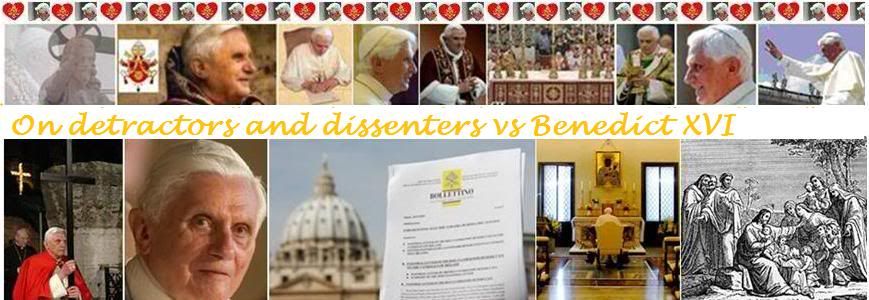 Barrister Neil Addison challenges
Barrister Neil Addison challenges
Robertson’s fiction passed off as fact

Oct. 2, 2010
The expatriate Geoffrey Robertson QC has returned to his homeland, Australia, to promote his work of fiction about the Vatican and sexual abuse that he’s presenting as factual truth, even when challenged about the facts.
Barrister Neil Addision, Director of the Thomas More Legal Centre, has written to the Sydney Morning Herald in an attempt to expose Geoffrey Robertson’s flim flam:
‘Geoffrey Robertson is disingenuous in claiming he does not want the Pope arrested and blaming the media .
In the British newspaper The Guardian on April 2, Robertson specifically accused the Pope of a ”crime against humanity” contrary to the rules of the International Criminal Court. It is only the realisation that this suggestion has made him look ridiculous in the eyes of other lawyers that has caused him to backtrack.
As far as the legal status of the Vatican is concerned, Robertson is presenting his personal opinion that the Vatican should not be a state and pretending that he is putting forward a legal argument.
More importantly, Robertson is pretending that the legal status of the Vatican is protecting abusive priests, but the reality is that Catholic priests and bishops throughout the world are citizens of their individual countries and not the Vatican and they are answerable to national law.
No country has ever suggested that the legal status of the Vatican has prevented the proper investigation of any allegations of abuse by any Catholic priest.
Neil Addison
National Director
Thomas More Legal Centre
Warrington (England)
Protect the Pope comment: Neil Addison is to be congratulated for doggedly pursuing Robertson around the world in an attempt to expose him as the Dan Brown of the legal profession.
|
| |
 03/10/2010 10:50 03/10/2010 10:50 |
|
| | | OFFLINE | | Post: 21.138
Post: 3.775 | Registrato il: 28/08/2005
Registrato il: 20/01/2009 | Administratore | Utente Master | |
|
 October 3, 27th Sunday in Ordinary Time
October 3, 27th Sunday in Ordinary Time
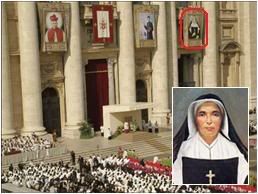 ST. MOTHER THEODORE (ANNE-THERESE) GUERIN
ST. MOTHER THEODORE (ANNE-THERESE) GUERIN
(France, 1798-Indiana, 1856)
Missionary and Founder, Sisters of Providence (USA)
Canonized by Benedict XVI on 10/16/2006
OR today.
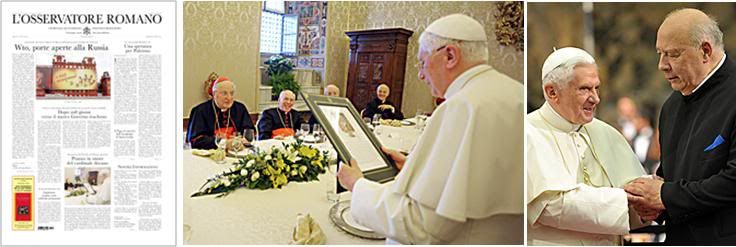 Papal stories on Page 1: A commentary on his visit to Palermo today (translation two posts above); the luncheon Friday to honor Cardinal
Papal stories on Page 1: A commentary on his visit to Palermo today (translation two posts above); the luncheon Friday to honor Cardinal
Sodano for major jubilees on his name day (article posted earlier on this page); and the Thursday evening concert in the Pope's honor
(reported earlier in the preceding page). Other Page 1 news: World Trade Organization opens its door to Russia; Shiite leader throws his
support to former Premier Al-Maliki to lead the new government in Baghdad, 208 days after national elections that saw the Sunni bloc
winning by a slight margin over the Shiites, causing a deadlock in forming a new government; and at Bambino Gesu Hospital in Rome,
physicians successfully perform the first implantation of an artificial heart.
THE POPE'S DAY
PASTORAL VISIT OF THE HOLY FATHER BENEDICT XVI
TO PALERMO
FOR THE REGIONAL ECCLESIAL ASSEMBLY
OF FAMILIES AND YOUTH
Sunday, October 3, 2010
P R O G R A M
08.15 Depart Ciampino airport for Palermo.
09.15 Arrive at the airport in Punta Raisi a Cinisi.
10.00 GREETING TO THE CITIZERY
Foro Italico di Palermo
10.30 MASS, Foro Italico
- Homily by the Holy Father
- Angelus led by the Holy Father
13.15 Lunch with the Bishops of Sicily
Archbishop's Palace, Palermo
17.00 MEETING WITH PRIESTS, RELIGIOUS AND SEMINARIANS
Cathedral of Palermo
- Address by the Holy Father
18.00 MEETING WITH THE YOUTH
Piazza Politeama, Palermo
- Address by the Holy Father
19.15 Depart from the airport at Punta Raisi a Cinisi
20.45 Arrive at Ciampino airport, Rome.
[Modificato da TERESA BENEDETTA 03/10/2010 18:55] |
| |
 03/10/2010 11:42 03/10/2010 11:42 |
|
| | | OFFLINE | | Post: 21.139
Post: 3.776 | Registrato il: 28/08/2005
Registrato il: 20/01/2009 | Administratore | Utente Master | |
|
 'Non Angli, sed angeli!:
'Non Angli, sed angeli!:
The Pope’s visit to Britain may be
the catalyst for revitalized faith
By Donal Anthony Foley

The visit of Pope Benedict XVI to Britain, September 16-19, marked a very special moment, and one which may still have wider repercussions for the rest of the world. Its high point was the beatification of John Henry Newman (1801-90) at Cofton Park in Birmingham.
This was the first papal visit to Britain since John Paul II arrived back in 1982. The country has changed much since then and it is clear that Pope Benedict’s reception was much more tenuous than that of his predecessor. [?????]
Prior to his arrival, more than 100,000 Brits asked for “certificates of de-baptism,” the Oxford biologist Richard Dawkins called for Benedict’s arrest for his “crimes against humanity,” and the media was eager to pounce on any misstep.
Yet this papal visit raised a couple of very important questions. Where is the Church in Britain going? What does the Holy Father now pray to happen in that formerly Catholic-rich country?
Before the Reformation, England was a very Catholic country, with devotion to Our Lady being particularly marked, to such an extent that the country was known as Our Lady’s “dowry” or special portion.
There has also been a long (and loving) link between the papacy and Britain. The historian Bede (d. 735) reports that upon seeing some Anglo-Saxon boys being maltreated in a Roman slave market, Pope Gregory the Great (pope from 590-604) exclaimed: “Non Angli, sed angeli” — “Not Angles, but angels” — and promptly sent St. Augustine of Canterbury and forty other missionaries to evangelize Britain.
Just a bit later, England supplied Rome with its first annual Peter’s Pence, and popes helped restore and anoint English kings from the eighth century onwards.
Henry VIII’s revolution changed all that and the ancient faith, including devotion to Our Lady and loyalty to the papacy, was overthrown through a mixture of brutality, propaganda and adverse historical circumstances.
This defection of England from the Catholic faith was perhaps the most significant event of the Reformation in that without it, the revolt against the Church might well have been confined to mainland Europe and perhaps not beyond.
The historian Warren H. Carroll points out that if Henry had remained faithful, allied to Catherine of Aragon (the daughter of Isabel and Ferdinand), he could have worked with the Holy Roman Emperor Charles V to restore Christendom.
This failure was all the more tragic, given that the United States ultimately became a Protestant country because of England’s rejection of Catholicism. If Spain, France and England could have worked together in North and South America, a new vibrant “Catholic” hemisphere could have been created in the West.
Perhaps much of the rivalry and dissension between the various European countries might have been avoided, and Christendom saved. Is it not possible to argue that if this had happened, many of the evils besetting the modern world may never have occurred?
But it was not to be, and so very gradually and painfully, over the following centuries, Catholicism had to attempt to regain its former place in Britain, particularly in the period following Cardinal Newman’s conversion on October 9, 1845.
Newman preached his famous “Second Spring” sermon in 1852, and it was in the years immediately following this that some remarkable prophesies were made regarding Catholicism in England. These came from two individuals who would go on to become canonized saints.
The first of these was St. John Vianney, the Curé d’Ars, who was visited in France by the first bishop of Birmingham, William Ullathorne, in May 1854. Ullathorne left this description of what happened as he was explaining to the Curé the need for prayers for tyrannized English Catholics:
“Suddenly he interrupted me by opening those eyes — cast into shadow by their depth, when listening or reflecting — and streaming their full light upon me in a manner I can never forget, he said, in a voice as firm and full of confidence as though he were making an act of faith. …‘I believe that the Church in England will recover her ancient splendor.’”
Similarly, one day toward the end of 1856, St. Dominic Savio heard that Don Bosco was planning a visit to Rome to see Pope Pius IX. Savio confided to Bosco that he wished he could speak with the Holy Father as well, as he had something very important to tell him.
Don Bosco agreed to try to pass on Dominic’s message, which was as follows: “Tell the Holy Father that in the midst of all the trials that await him, he should not lessen his special care for England. God is preparing a great triumph for the Church in that country.”
Don Bosco asked Dominic what made him say that, and he agreed to tell him, but asked that he keep it secret and tell no one but the Pope. Don Bosco said he would do that and then Dominic explained what had happened:
“I was making my thanksgiving after Holy Communion one day [when] I seemed to be in a wide plain. There was a great deal of mist, and people were groping about as though they had lost their way. I heard a voice say: ‘This is England.’ While I watched I saw another figure coming towards me. He wore robes just like those I have seen in the picture of the Pope, in our class room and in the refectory. He was holding a huge, flaming torch in his hand, and wherever he passed the mist disappeared. Soon it was as clear as mid-day. Then I heard the voice again. It said: ‘This torch is the Catholic faith which is to illumine England.’”
When Pius IX heard this story from Don Bosco he was greatly moved, and said to him: “What you have told me confirms me in my resolution to work with even greater energy for England, to which I already devote so much of my time and my prayers.”
So despite the presently critical situation of the Church in Britain, there is hope that there will be a return to the ancient faith. Both of those prophecies were made nearly 150 years ago, so obviously God’s plan for Britain is a long-term one.
Given the special relationship between the United States and Britain, a future revival of the faith in Britain could also have profound implications for the English-speaking world. Britain once had an empire, and was the world super-power, just as the United States now holds that position; Britain’s colonial legacy is the Commonwealth, which still has fifty-four member countries around the world.
Britain, despite its present deplorable spiritual and cultural state, is still very influential, with many countries continuing to look to her for inspiration and new ideas.
Just as the United States and Britain worked together to defeat Nazism in World War II, so in the future there is the possibility of a new common fight against the culture of death, as the influence of the Church steadily grows in the new evangelization, which has been so much encouraged by recent popes. Such a resurgence of the Church in such influential countries would be bound to have world-wide repercussions.
There is a real battle going on at the moment for the soul of Britain, a battle which the Church and those on the side of truth are losing, so the visit of Pope Benedict is undoubtedly an important spiritual moment that should be seized and not frittered away.
Pope Benedict’s courage and the prophecies of St. John Vianney and St. Dominic mean that the Catholic future of the United Kingdom is a lot brighter than might seem to be the case.
There are very good reasons for celebrating Pope Benedict’s visit, particularly since St. Dominic Savio’s vision clearly indicates that the papacy will be very bound up with the future re-evangelization of Britain, and by implication, the world.
Joseph Ratzinger took the name of Benedict, patron of Europe and founder of monastic life, so as to re-evangelize Europe, and that is no doubt underway.
So, what did our Holy Father want to teach the world by visiting the land of Thomas More, Edmund Campion, Margaret Ward and Cardinal John Henry Newman? Never tire of living and proclaiming the faith, never waver in discipleship, and do pray for this country, these people, that they may be both Angli et angeli!
Donal Anthony Foley has degrees in humanities and theology, and has had books and booklets on Marian apparitions published, including Understanding Medjugorje: Heavenly Visions or Religious Illusion? He has also had articles published in a number of magazines and newspapers, and runs Theotokos Books and a related website, www.theotokos.org.uk. This article appears in the October 2010 issue of HPR.
 The Battle of Britain:
The Battle of Britain:
Will Catholicism or atheism prevail?
By George Neumayr
Editorial

Issue of October 2010
In World War II, Great Britain survived an atheistic assault from outside the country. Today’s “Battle of Britain” comes from an atheistic assault inside it. British culture is crumpling under the growing weight of a fervent secularism that appears religious and an exhausted state religion that appears secular.
The once-claimed sturdy Anglican bridge between Christianity and the modern world has largely collapsed, leaving those thrashing around down below it to swim from the Thames to the Tiber or drown.
The Catholic Church in the United Kingdom, to be sure, has her own problems, but, as Pope Benedict’s historic September visit to Britain suggested, the country’s future could end up looking like its distant Catholic past. Pope Benedict stepped into the battle for that future not as a triumphant warrior but as a humble witness to the truth and grace contained in Christ’s Church.
The tone of Pope Benedict’s visit to Britain was set even before he got there. Asked by a reporter on the flight over what he could do to make Catholicism appear more “attractive” and “credible” to secularists and atheists in Britain, the Pope responded by challenging the premise of the question.
He noted that a Catholicism which thought in those superficial terms would become just one more dangerous ideology and power grab in a world that needs fidelity to Christ:
One might say that a church which seeks above all to be attractive would already be on the wrong path, because the Church does not work for itself, does not work to increase its numbers so as to have more power.
The Church is at the service of Another; it does not serve itself, seeking to be a strong body, but it strives to make the Gospel of Jesus Christ accessible, the great truths, the great powers of love and of reconciliation that appeared in this figure and that come always from the presence of Jesus Christ.
In this sense, the Church does not seek to be attractive, but rather to make herself transparent for Jesus Christ. And in the measure in which the Church is not for herself, as a strong and powerful body in the world, that wishes to have power, but simply is herself the voice of Another, she becomes truly transparent to the great figure of Jesus Christ and the great truths that he has brought to humanity…
It is for this reason, he continued, that the Church’s outreach to Anglicans and non-Catholics is not the competitive poaching of a man-made organization but the apostolic work of a divine one:
If Anglicans and Catholics see that both are not there for themselves, but are rather instruments of Christ, “friends of the Bridegroom,” as Saint John says; if both follow together the priority of Christ and not themselves, they draw closer together, because the priority of Christ brings them together, they are no longer in competition, each one seeking greater numbers, but are united in commitment to the truth of Christ who comes into this world, and so they find themselves also placed reciprocally in a true and fruitful ecumenism.
Ironically, the direct but civil Pope Benedict appeared to win over many non-Catholics in Britain while the self-consciously irenic Cardinal Walter Kasper proved too divisive to some.
The former head of the Pontifical Council for Promoting Christian Unity stayed behind after saying that flying into increasingly ethnic Britain makes him feel like he is entering a “Third World country.” Yet in a way Kasper’s “gaffe” was accidentally prophetic: British police arrested, though later released, six men of North African descent thought to be planning an attack on the Holy Father — a sobering reminder during the papal visit that the confusion of modern British life is due not just to wan and corrupted Christianity but also to the creeping Islamization aided by atheism that could take its place. [The comment about the arrested North Africans is inappropriate considering that they were released and that it seemed to have been a case of police over-zealousness.]
At a reception hosted by Queen Elizabeth II, Pope Benedict recalled “how Britain and her leaders stood against a Nazi tyranny that wished to eradicate God from society and denied our common humanity to many, especially the Jews, who were thought unfit to live.”
Benedict added that as “we reflect on the sobering lessons of the atheist extremism of the 20th century, let us never forget how the exclusion of God, religion, and virtue from public life leads ultimately to a truncated vision of man and of society and thus to a ‘reductive vision of the person and his destiny.’”
The Holy Father returned to this theme of the battle of Britain several times over the course of his visit, gently impressing upon the British elite that the moral relativism and de facto atheism which they invoke in the name of democracy only imperils it.
Standing not far from the spot in Westminster Hall where Thomas More was condemned to death, Pope Benedict made the unpopular point that democracy can turn tyrannical too, unless it rests on truths not subject to democratic vote, truths which reason apprehends and revelation reinforces.
Whether the English can win that battle against the 21st-century tyranny of the “dictatorship of relativism” remains in doubt, but the Holy Father through his speeches has certainly left behind in Britain a powerful light with which to dispel atheism’s darkness.
[Modificato da TERESA BENEDETTA 03/10/2010 12:19] |
| |
 03/10/2010 12:27 03/10/2010 12:27 |
|
| | | OFFLINE | | Post: 21.140
Post: 3.777 | Registrato il: 28/08/2005
Registrato il: 20/01/2009 | Administratore | Utente Master | |
|
 Holy Father has just concluded the Mass and Angelus in Palermo. Early photos here thanks to the French service of Vatican Radio online, which has retained the mini-slideshow discarded by the English and Italian services. According to the RV commentator of the Mass, police estimated the crowd at 200,000 - twice what had been expected.
ARRIVAL IN PALERMO
Holy Father has just concluded the Mass and Angelus in Palermo. Early photos here thanks to the French service of Vatican Radio online, which has retained the mini-slideshow discarded by the English and Italian services. According to the RV commentator of the Mass, police estimated the crowd at 200,000 - twice what had been expected.
ARRIVAL IN PALERMO
Having left Rome at 8:15 a.m. on an Airbus provided by Prime Minister Silvio Berlusconi, the Holy Father arrived in Palermo's Falcone e Borsellino airport in Cinisi one hour later, where he was welcomed by the Archbishop of Palermo, Mons. Paolo Romeo; the Archbishop of Monreale, Mons. Salvatore de Cristina; and by the Hon. Angelino Alfanoo, Minister of Justice representing the Italian government.
The Pope proceeded by Popemobile to the Foro Italico Umberto I on the shore of the Tyrrhenian Sea, where he received a formal welcome before the Mass from the Mayor of Palermo, Diego Cammarata, and from Archbishop Romeo, who is also president of the Sicilian bishops' conference.
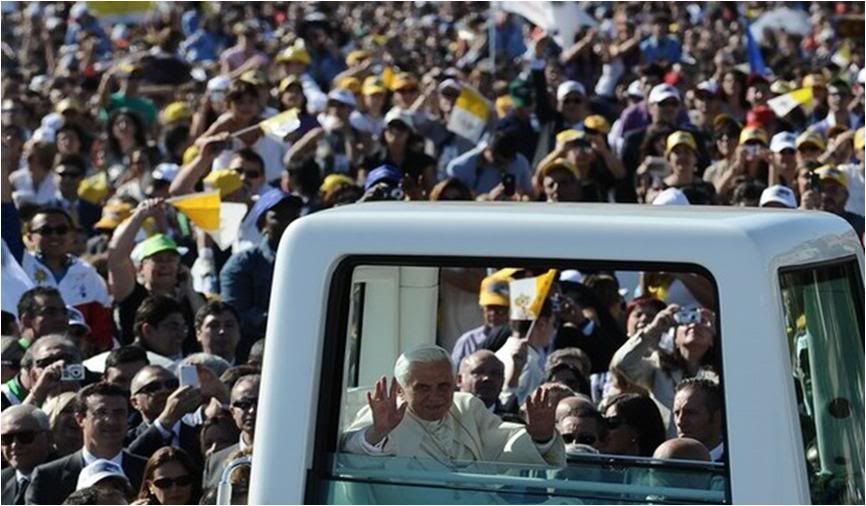
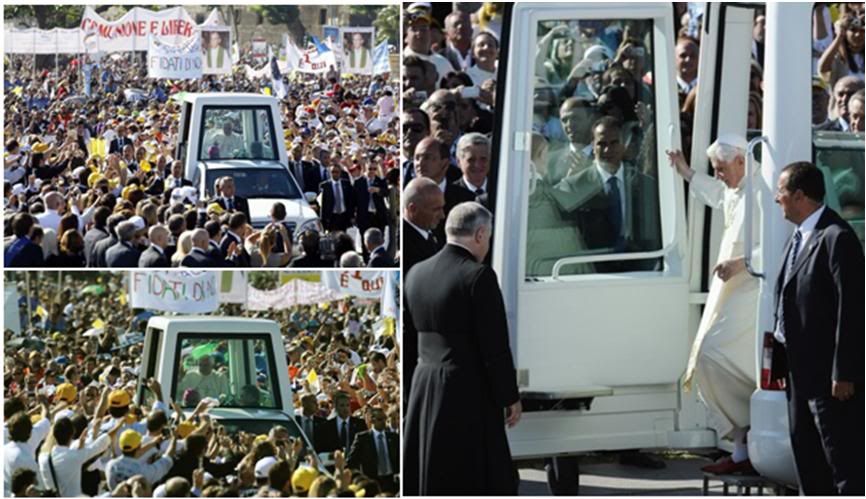
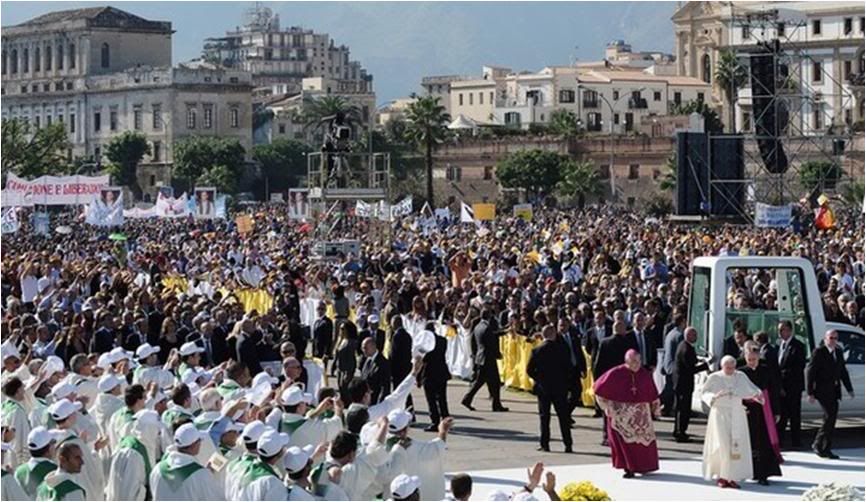
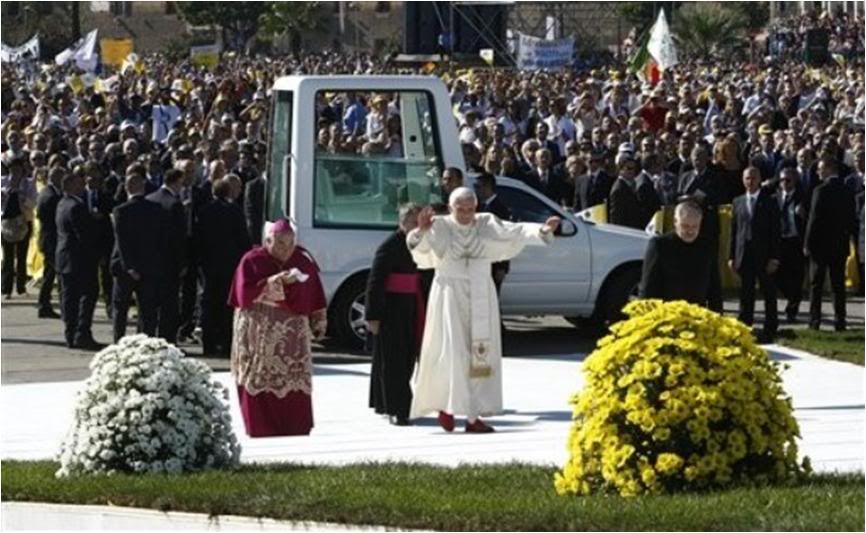
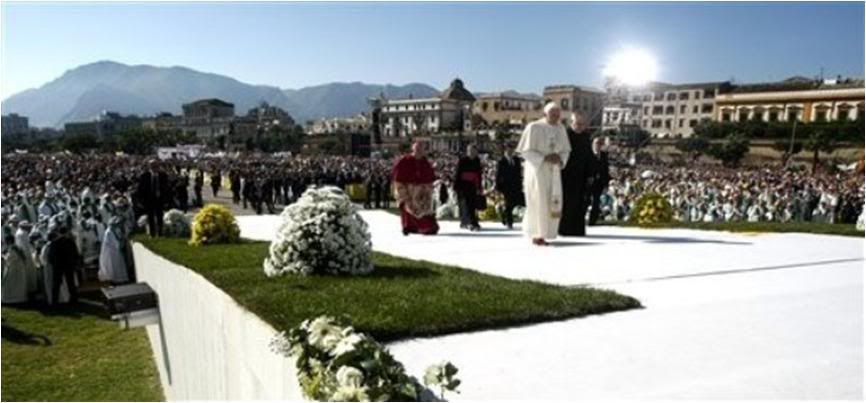
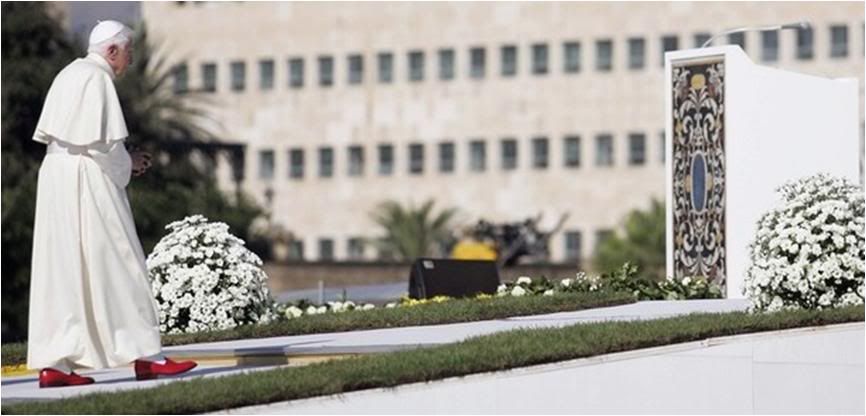
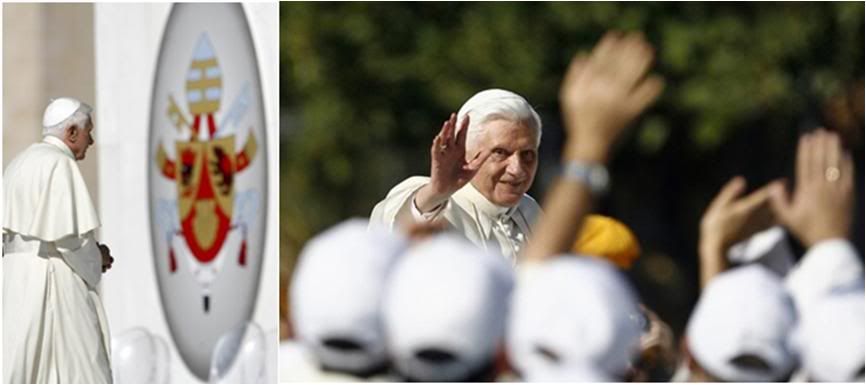
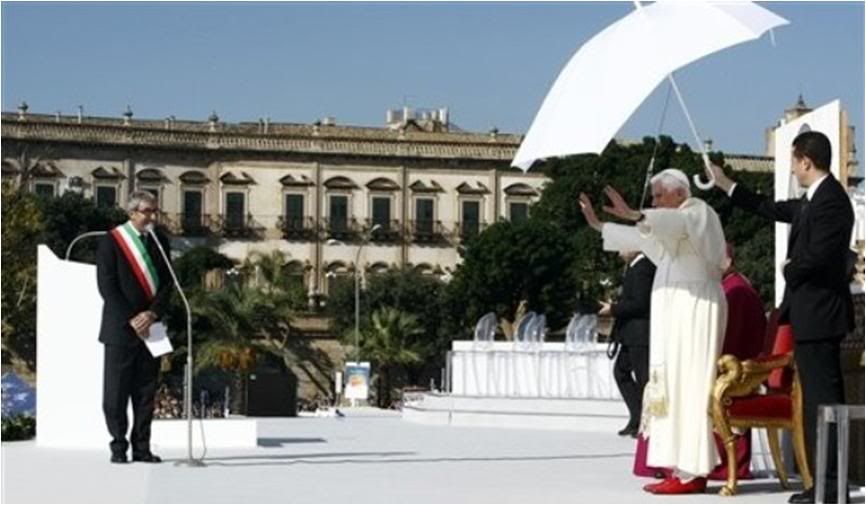
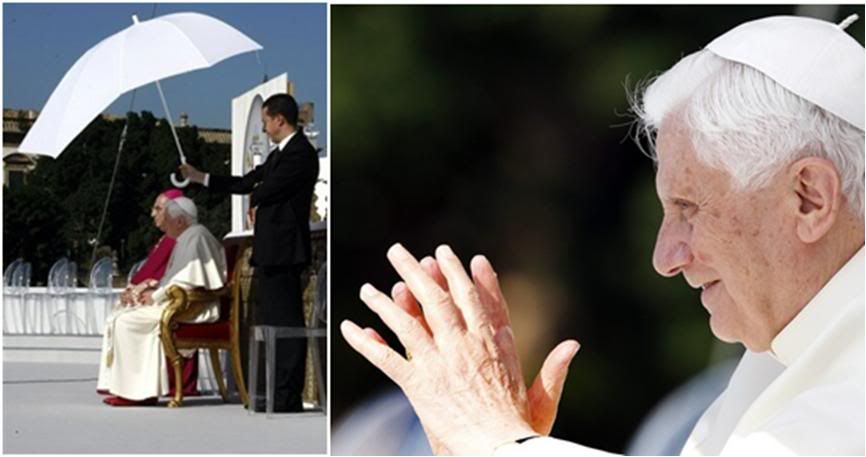
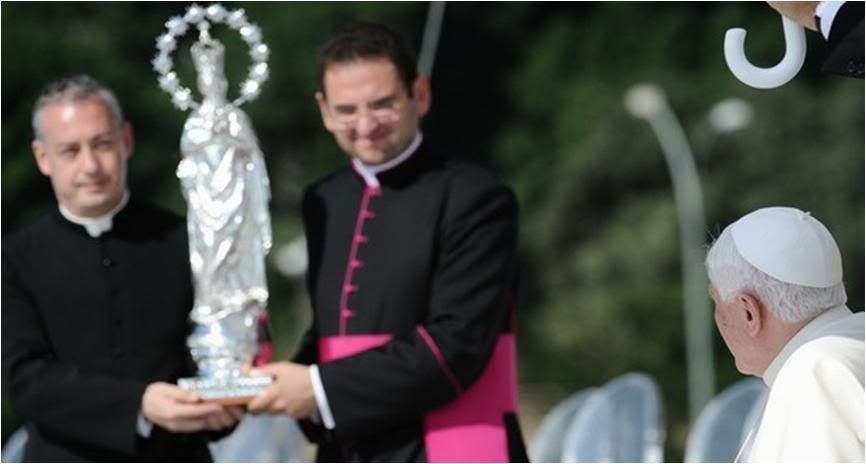 MASS IN PALERMO
Pope to Sicilians fighting
MASS IN PALERMO
Pope to Sicilians fighting
the Mafia: do not fear
By FRANCES D'EMILIO

PALERMO, Sicily, Oct. 3 (AP) – Pope Benedict XVI paid tribute Sunday to a priest slain by the Mafia and encouraged people in Sicily not to resign themselves to deep-rooted evil on an island where organized crime has held sway for centuries.
Sicilians had been hoping Benedict would use his words and presence during his first visit as pontiff to give a boost to efforts to try to rid the island of Cosa Nostra.
"The temptation toward discouragement, to resignation, comes to those who are weak in faith, to those who confuse evil with good, to those who think that, faced with often profound evil, there is nothing to do," Benedict told tens of thousands of faithful at Mass at a sunshine-drenched park alongside Palermo's waterfront.
The Pope cited the Rev. Pino Puglisi, who stirred consciences with his anti-Mafia preaching in one of Palermo's poorest and most heavily mobster-infested neighborhoods.
Since Puglisi was gunned down by the Mafia in 1993, his supporters have been clamoring for the Vatican to officially proclaim him a martyr, paving the way toward sainthood.
Among those recently backing an appeal for the Pope to beatify Puglisi were Oscar-winning director Giuseppe Tornatore and Italian novelist Dacia Maraini. But the Pope on Sunday made no mention of martyrdom for Puglisi.
[Puglisi's cause is already in process at the Congregation for the Cause of Sainthood. It is for them now to declare whether Fr. Puglisi's death was a martyrdom when they decide on his heroic virtues.]
Benedict in his homily acknowledged that many Sicilians endured "physical and moral suffering because of organized crime."
"Today I am in your midst to give witness with my closeness and my remembering (you) in prayer," the Pope said, sitting under a canopy to shield him from the late morning Mediterranean sun. "I am here to give you strong encouragement not to be afraid to clearly give witness to human and Christian values."
Benedict said the just must persevere even amid a "tremendous situation of violence, iniquity and oppression."
Evil-doers should be ashamed of offending God as well as society with their deeds, the Pope said in a likely reference to mobsters.
But nowhere in his homily did Benedict directly take to task the mobsters themselves, as his predecessor, John Paul II, did in one of his most emotional and vehement denunciations of that long papacy. [Dear Lord, a comparison yet again? As if to imply that Benedict XVI does not care enough or is not brave enough to make a similar denunciation!]
Then, amid a backdrop of ancient temples near Agrigento, John Paul in a trembling voice, lashed out in improvised remarks at the Mafiosi, demanding that they convert from their evil ways or suffer the wrath of God.
That was in 1993, a year after separate bombings engineered by the Mafia killed the island's two top prosecutors. John Paul hailed such slain servants of the state as "martyrs of justice, indirectly of faith." [In the Church's canonization process, martyrdom is declared when the candidate is slain in odium fidei - 'out of hatred for the faith'. The two slain prosecutors were not then (and are not now) the objects of any beatification process, yet John Paul II was careful to make the distinction.]
The murders also spurred a crackdown on the mob, leading to the capture of fugitive top Cosa Nostra bosses who had eluded the law for decades and a steady stream of Mafia turncoats breaking with their code of silence to cooperate with prosecutors.
Benedict's final event of the day is a pep rally for young people in the Sicilian capital's center.
Young people have recently been the main engine behind an anti-extortion campaign that gave shopkeepers and other local business owners across the island the courage to refuse to pay the mob so-called "protection money" and go to the police to denounce the extortionists.
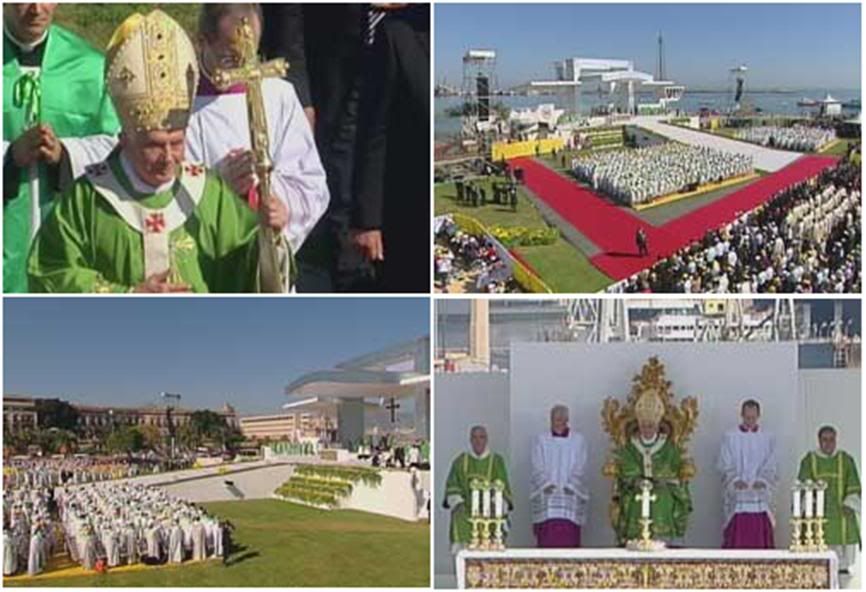
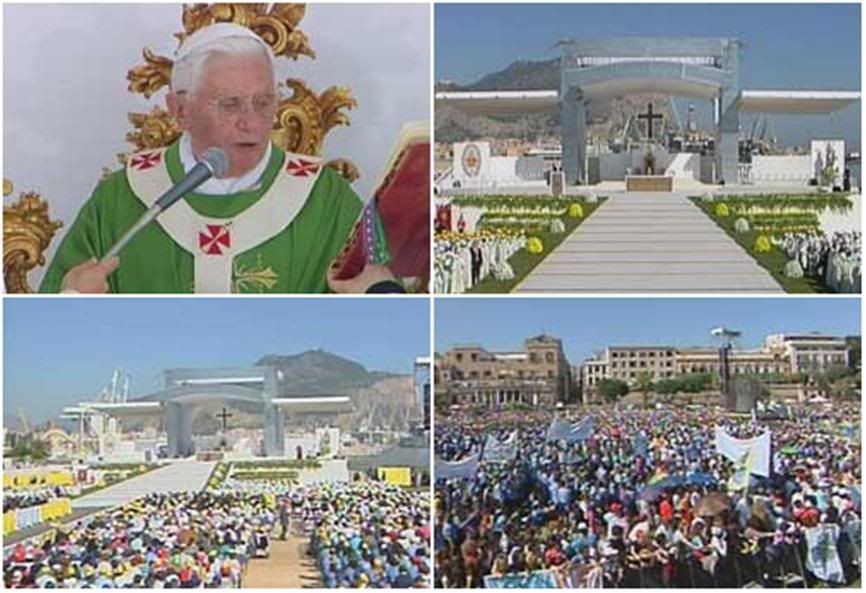 Sadly, it appears now that the line first indicated by the AP in its story above is the one now taken by other news agency reports on the Palermo Mass. And it gets worse, as the headline of the following Reuters story shows - even if the story itself does not get to what the headline says until the 6th paragraph.
Pope disappoints
Sadly, it appears now that the line first indicated by the AP in its story above is the one now taken by other news agency reports on the Palermo Mass. And it gets worse, as the headline of the following Reuters story shows - even if the story itself does not get to what the headline says until the 6th paragraph.
Pope disappoints
anti-Mafia activists

PALERMO, Oct. 3 (Reuters) - Pope Benedict encouraged Sicilians on Sunday to speak out about their problems, including organized crime, but disappointed activists who said he was not forceful enough and did not say the word Mafia.
Benedict, making his first visit to Sicily as Pope, said an open-air mass for tens of thousands of people near Palermo's port at the start of his day-long trip.
In his homily, the Pope spoke of many of Sicily's pressing problems, including high unemployment, and of those who were "suffering physically and morally
because of organized crime."
"I am here to give you strong encouragement not to be afraid to speak out clearly about human and Christian values
," he said.
Sicily is no longer the scene of the Mafia wars of the 1990s, but magistrates say the mob still does brisk business in drug trafficking, extortion and getting a slice of lucrative public works contracts for companies it controls.
Benedict's homily was sprinkled with phrases such as a biblical reference to "a tremendous situation of violence" and the need to be "ashamed by evil," but leading anti-Mafia activists said he did not go far enough.
"It is a great disappointment. I think the people of Palermo will be disappointed," said Rita Borsellino, whose brother Paolo, a leading anti-Mafia magistrate, was killed by a Mafia car bomb in Palermo in 1992.
"I was disappointed in the lack of force in what he said," she told Reuters. "I think it is indulging the Mafia too much to just call it organized crime and not call it by name. I hope he is stronger when he speaks to young people later today."
Dino Paternostro, a leading anti-Mafia activist in the town of Corleone made famous in the "The Godfather" films, also expressed disappointment.
"There were great expectations for what he would say. I really do hope he is stronger and more specific in the afternoon because the way things stand it seems like he is saying 'the Mafia is your problem'," Paternostro told Reuters.[Of course it is. It's a social, economic, cultural and political problem that has goine on for over a century that is not for the Church to resolve, but for the people and their local governments working together.]
Whatever Benedict says will inevitably be compared to a visit to Sicily by Pope John Paul II in 1993.
Before leaving the city of Agrigento, John Paul improvised a scathing and specific attack on the Mafia which has gone down in anti-Mafia history.
Speaking in a raised voice and with a clenched fist, John Paul thundered against Mafiosi, warning them directly that unless they "converted" to good, they would one day be subjected to God's judgment for their blood-letting and misdeeds.
Several months later on a sleepy summer night in Rome, bombs placed by the Mafia exploded in two churches in Rome, including the Basilica of St John in Lateran, the Pope's cathedral in his capacity as bishop of Rome.
Not to be boorish, nor to mean any disrespect for John Paul II, who is rightly remembered for his Agrigento statement, but he did not mention the Mafia by name in that imprecation, either... And obviously, more than a Pope's angry prophetic words are needed to resolve a problem that has been festering for over a century... There will almost certainly be more Christians who will pay with their lives for defying the Mafia before Sicilians are able to break out of the modus vivendi that their local officials appear to have settled into...
Forgive me! AFP has now filed its report on the Mass and it's not taking the hard line against Benedict XVI that AP, Reuters and other news outlets did:
Pope hits out at Mafia
on visit to Sicily

PALERMO, Italy, Oct. 3 (AFP) – Pope Benedict XVI denounced the "evil" of Italy's organised crime network on Sunday as he celebrated an open-air mass before tens of thousands of pilgrims in the heartland of the Sicily's Mafia.
Benedict's first visit to the island since becoming Pope in 2005 raised hopes among campaigners that he will help their struggle against the ever-pervasive Cosa Nostra.
The Pope said faith made humanity possible, even when the people of Palermo and across Sicily faced "a shortage of jobs, uncertainty about the future, moral and physical suffering, and organised crime."
"I am here to give you a strong incentive to not be afraid to testify clearly to human and Christian values, so deeply rooted in faith and in the history of this land and its people," he said.
He called on Sicilians, dogged by Mafia extortion and intimidation, to be "ashamed of evil, which offends God and man" and for the effects of organised crime which "injures the civil and religious community" to be brought into the open.
Organisers said around 250,000 people attended the Mass in bright sunshine in Palermo's giant Foro Italico square, overlooking the Mediterranean Sea.
"People of Sicily, look to the future with hope," he said. "Live with courage the values of the Gospel to shine a light on good. With the power of God, everything is possible."
The Pope arrived at Palermo's Falcone-Borsellino airport, named after two judges killed by the Cosa Nostra, the Sicilian Mafia, in 1992, before travelling through the city in his popemobile.
Residents hung banners from their houses welcoming the pontiff, but the atmosphere was subdued, in part due to restrictions on movement and a heavy security presence.
In 1995, Benedict XVI's predecessor Jean Paul II -- on the last of his five visits to Sicily -- attacked Mafia killings, saying "no man, no human association, no Mafia can change nor trample under foot the right to life."
Benedict XVI has already issued strong words against the Camorra, the dominant organised crime group in Naples, during an open-air Mass in the southern city in 2007, calling for "a struggle against all forms of violence."
Before the visit to Sicily, campaigners had called on the Pope to strongly condemn organised crime.
Benedict was to meet priests and nuns and members of religious communities in the city's cathedral, and then was due to address a gathering of 20,000 young people in a Palermo square.
The Italian Episcopal Conference, the organisation of Italian bishops, issued a report on the Mafia earlier this year, calling it a "real cancer" and "one of the deepest wounds" in Italy's more impoverished southern regions.
[Modificato da TERESA BENEDETTA 03/10/2010 18:57] |
| |
 03/10/2010 16:36 03/10/2010 16:36 |
|
| | | OFFLINE | | Post: 21.141
Post: 3.778 | Registrato il: 28/08/2005
Registrato il: 20/01/2009 | Administratore | Utente Master | |
|
 FLASH! Police say 250,000
FLASH! Police say 250,000
attended today's Papal Mass

PALERMO, Oct. 3 (Translated from Apcom) - According to the Palermo police, the crowd estimate for the papal Mass today was 250,000 - far above the 100,000 that had been expected.
If I remember correctly, that would make it the second largest attendance for a Mass by Benedict XVI outside of Rome (the one in Loreto in 2007 was 300,000). God bless the Palermitani.
The Holy Father is now at the Archbishop's Palace where he was to lunch with some 4o cardinals and bishops.
P.S. Fr. Federico Lombardi, Vatican press director, has had to issue a statement this afternoon on the attendance at the Papal Mass:
With respect to the number of persons who attended the Pope's Mass in Palermo, various news agencies continue to report the evidently erroneous number of 30,000. Please note that both city police and the carabinieri (state police) have given a crowd estimate well beyond 200,000.
Anyone who watched the TV coverage or has seen crowd photos taken at the Mass would know that 30,000 is just flat out wrong!
MASS IN PALERMO - 2
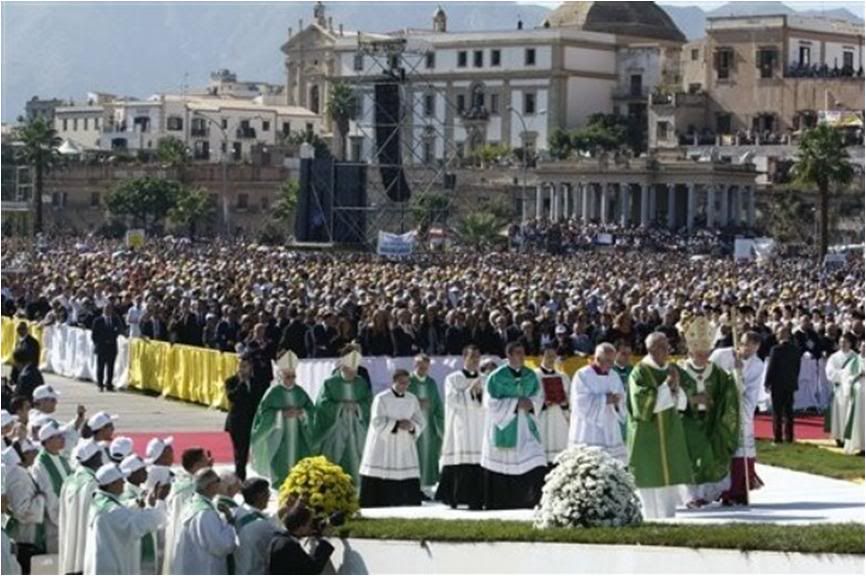
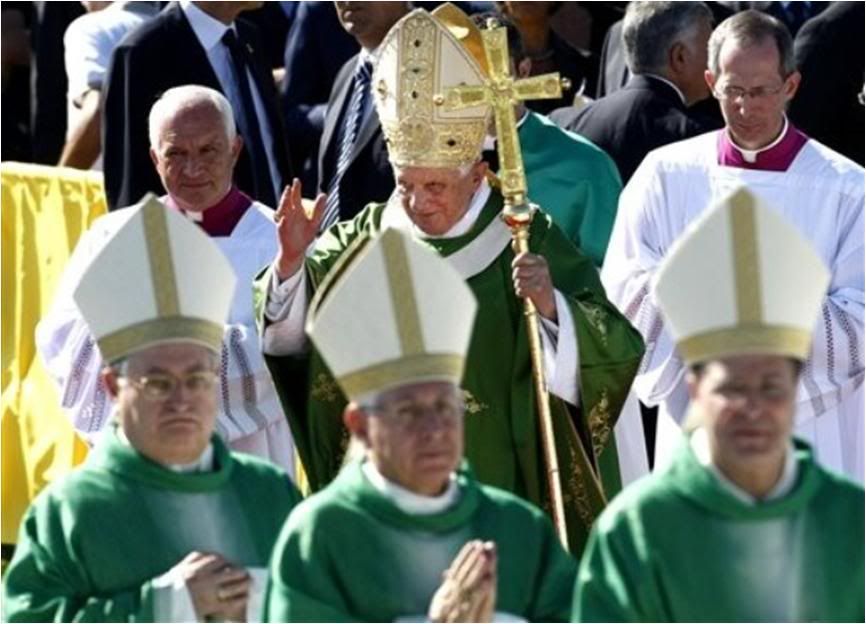
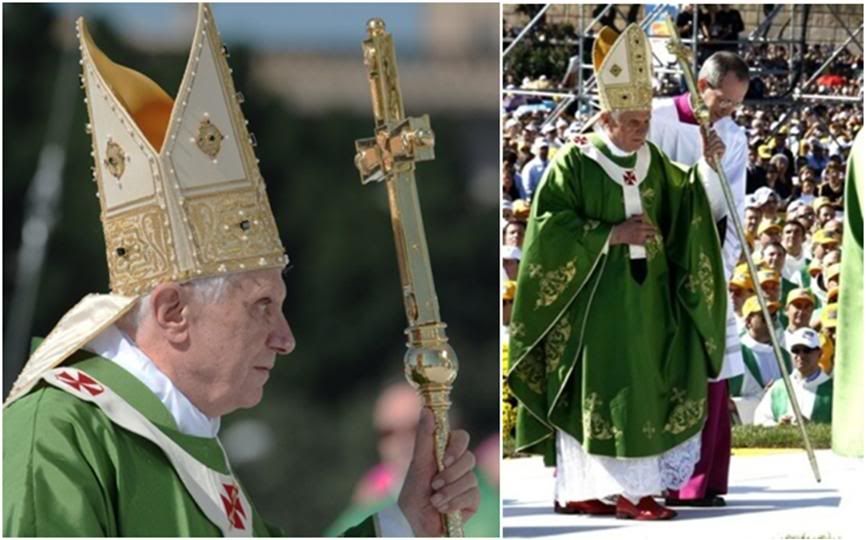
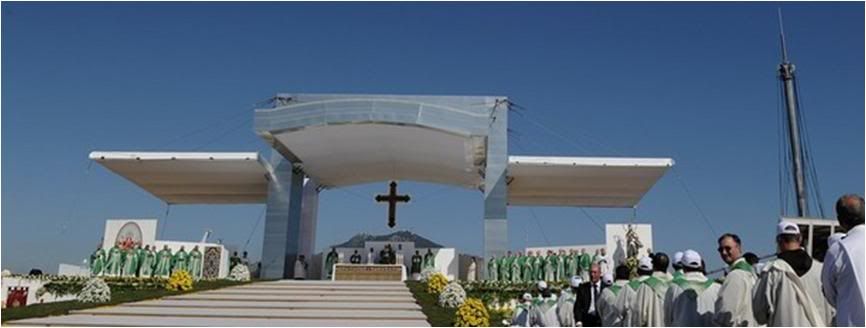
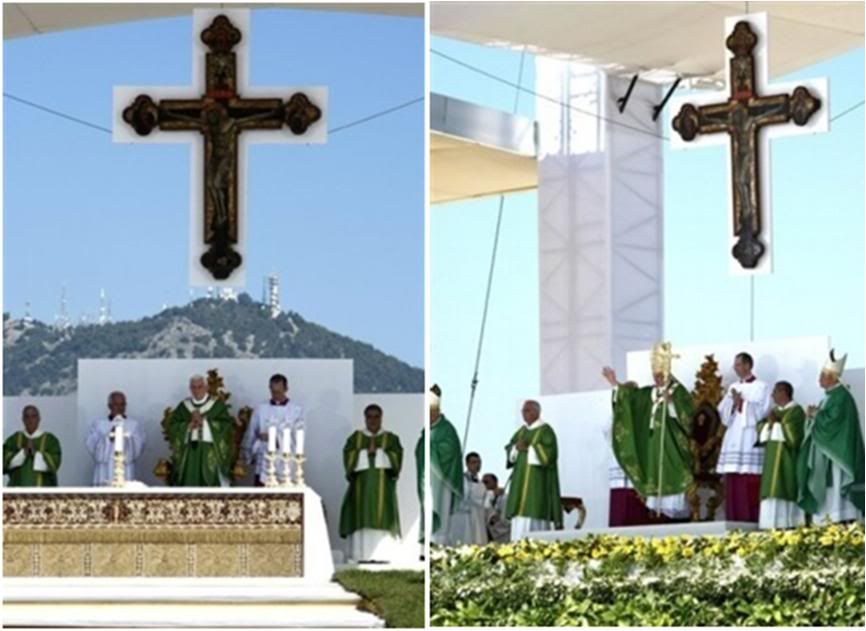
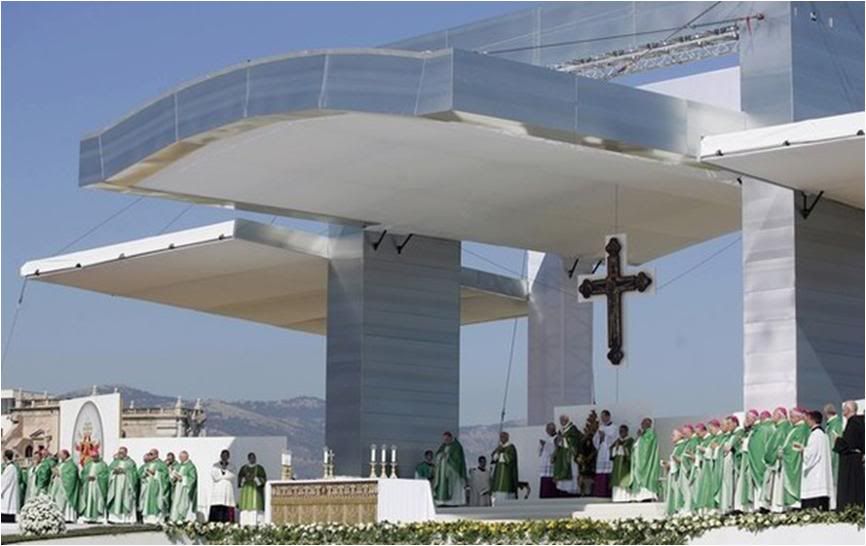
Here is a full translation of the Holy Father's homily:
Dear brothers and sisters:
It is my great joy to be able to break with you the bread of the Word of God and the Eucharist.
I greet you all with affection and I thank you for your warm welcome. I particularly greet your pastor, Archbishop Paolo Romeo. I thank him for the expressions of welcome which he addressed to me in the name of everyone, and also for the meaningful gift that he gave me.
I greet all the archbishops and bishops present, priests, religious, and the representatives of Church associations and movements, .
A special thought goes to Mayor Diego Cammarata, with gratitude for his words of welcome; to the Representative of the Italian government, and to all civilian and military authorities who have honored our gathering with their presence.
And special thanks to all who generously worked together to organize and prepare for this day.
Dear friends, my visit comes on the occasion of an important regional assembly of young people and families whom I will meet later today.
But I also come to share in the joys and hopes, labors and commitments, ideals and aspirations, of this diocesan community.
When the ancient Greeks landed in this region, as the mayor recalled in his greeting, they called it Panormo, which means 'all port' - a name that indicated security, peace and serenity.
Coming here among you for the first time, it is my hope that this city, inspired by the most authentic values of her history and traditions, may always be able to realize for its residents, as for the entire nation, the serenity and peace connoted by its name.
I know that in Palermo, as in all of Sicily, there is no lack of difficulties, problems and concerns. I think especially of those who live their existence concretely in precarious conditions because of the lack of work, of uncertainty for the future, of physical and moral sufferings, and as the Archbishop pointed out, because of organized crime.
Today I am among you to demonstrate my spiritual nearness and that I remember you in prayer. I am here to give you strong encouragement to have no fear in bearing witness with clarity to the human and Christian values that are so profoundly rooted in the faith and history of this territory and its people.
Dear brothers and sisters, every liturgical assembly is a space for the presence of God. Gathered together for the Holy Eucharist, the disciples of the Lord, immersed in the redemptive sacrifice of Christ, proclaim that he is risen, that he is living and is the giver of life, and testify that his presence is grace, strength, and joy. Let us open our heart to his word and receive the gift of his presence!
All the liturgical texts this Sunday speak to us of faith, which is the foundation of all Christian life. Jesus had educated his disciples to grow in the faith, to believe and to increasingly trust in him, in order to construct their own life on rock.
That is why they asked of him: "Increase our faith" (Lk 17,5). It is a beautiful request that they addressed to the Lord - it is the fundamental request: the disciples did not ask for material gifts, they did not ask for privileges, but they asked for the grace of faith, which orients and illumines all of life.
They asked for the grace to know God and to be in intimate relationship with him, receiving from him all his gifts, including those of courage, of love, and of hope.
Without responding directly to their plea, Jesus resorted to a paradoxical image to express the incredible vitality of the faith.
G]Just as a lever can move much more than its own weight, so is faith - even a pinch of faith - able to achieve unthinkable and extraordinary things, such as uprooting a great tree and transplanting it in the sea (ibid.).
Faith - to trust in Christ, to welcome him, to let him transform us, to follow him to the very end - makes possible things that are humanly impossible, in every reality.
The prophet Habakuk bears witness to this, in the first Reading. He implores the Lord, from a terrible situation of violence, iniquity and suffering. Precisely in this difficult and uncertain situation, the prophet introduces us to a vision that offers a mirror of the plan that God has been tracing and executing in history: "The rash one has no integrity; but the just one, because of his faith, shall live" (Hab 2,4).
The ungodly, he who does not act according to God, trusts in his own power, but he is relying on a fragile and inconsistent reality, and therefore, he will fold down, he is destined to fall.
The righteous, on the other hand, relies on a hidden but solid reality - he trusts in God and therefore, he will have life.
In past centuries, the Church in Palermo has been enriched and inspired by a fervent faith which found its highest and most successful expression in her saints, both male and female.
I think of Saint Rosalia, whom you venerate and honor, and who, from Monte Pellegrino, watches over your city, of which she is the patroness; as well as two other great saints of Sicily, Agatha and Lucia.
Nor must it be forgotten that your religious sense has always inspired and oriented your family life, nourishing values such as the capacity to give and to be in fraternal solidarity with others, especially those who suffer, along with innate respect for life - all of which constitute a precious legacy to be guarded jealously and to be deployed even more in our time.
Dear friends, conserve this precious treasure of faith in your Church - and may these Christian values always guide your choices and your actions.
The second part of today's Gospel presents another teaching, one of humility, which is nonetheless closely linked to faith. Jesus asks us to be humble and cites the example of a servant who has worked in the fields.
When he returns home, the master asks him to work some more. According to the mentality in the time of Jesus, the master had every right to do this. The servant owed his master his complete availability. And the master did not feel obliged to him at all for having carried out the orders he received.
Jesus makes us aware that, in front of God, we find ourselves in a similar situation: We are servants of God. We are not his creditors, rather we are always his debtors because we owe him everything, because everything is a gift from him.
To accept and to do his will is the attitude that we must have every day, at every moment of our life. Before God, we must never present ourselves as someone who believes he has done and therefore merits a great reward.
This is an illusion that can arise in anyone, even in persons who work the most in service to our Lord, in the Church. We must, instead, be aware that, in fact, we never do enough for God.
We must say, as Jesus suggests: "We are unprofitable servants; we have done what we were obliged to do" (Lk 17,10). This is an attitude of humility which truly puts us in our place and allows the Lord to be very generous with us.
In fact, in another Gospel passage, he promises us that "he will gird himself, have them recline at table, and proceed to wait on them" (Lk 12,37).
Dear friends, if we do God's will every day, with humility, without presuming to claim anything from him, then Jesus himself will serve us, help us, encourage us, give us strength and serenity.
Even the apostle Paul, in the second reading today, speaks of faith. Timothy is asked to have faith, and through faith, to exercise charity. Paul exhorts his disciple to revive in faith even that gift of God that is in him through the imposition of hands by Paul, that is, the gift of ordination, which he received in order to carry out his apostolic ministry as a co-worker of Paul (cfr 2Tm 1,6).
He must never allow this gift to be extinguished but must always keep it alive through faith. And the Apostle adds: "For God did not give us a spirit of cowardice but rather of power and love and self-control" (v.7).
Dear Palermitani and Sicilians: Your beautiful island was among the first regions in Italy to welcome the faith of the Apostles, to receive the announcement of the Word of God, to adhere to the faith so generously that even amid difficulties and persecutions, it has always germinated the flower of sanctity.
Sicily was and is a land of saints, from every situation in life, who lived the Gospel with simplicity and integrity. To you, the faithful laity, I repeat:
Do not be afraid to live and bear witness to your faith in the various sectors of society, in the multiple situations of human existence, especially in the most difficult.
Faith will give you the power of God so that you may always be trustful and courageous, to move ahead with new decisiveness, to take the necessary initiatives to give an ever more beautiful face to your land.
And when you encounter the world's opposition, listen to the words of the Apostle: "Do not be ashamed of your testimony to our Lord" (v.8).
We should be ashamed of of evil, of anything that offends God, of that which offends man. We should be ashamed of the evil that infects the civilian and religious communities through actions that cannot stand the light of day!
The temptation to be discouraged, to be resigned, comes to those who are weak in faith, to those who confuse evil with good, to those who think that in the face of evil, especially profound evil, nothing can be done.
On the contrary, he who is firmly founded in faith, who has full trust in God and lives within the Church, is capable of wielding the devastating power of the Gospel.
Thus did the saints live and act, those who flowered, in the course of centuries, here in Palermo and in all of Sicily, along with laymen and priests of our day who are well-known to you, as, for example, don Pino Puglisi.
May they watch over you collectively, and nourish in each of you the desire to proclaim, in word and deed, the presence and the love of Christ.
People of Sicily, look to your future with hope! Bring forth in all its light the goodness that you desire, that you seek and that you have! Live courageously the values of the Gospel in order to let the light of goodness shine. With the power of God, everything is possible.
May the Mother of Christ, the Virgin of Guidance, the Odigitria, who is so venerated by you, assist and lead you to profound knowledge of her Son. Amen.
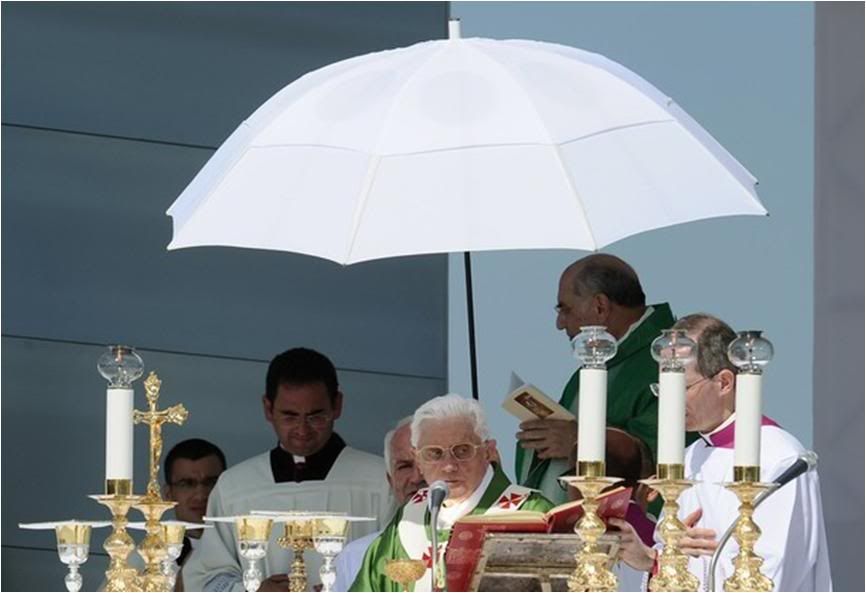
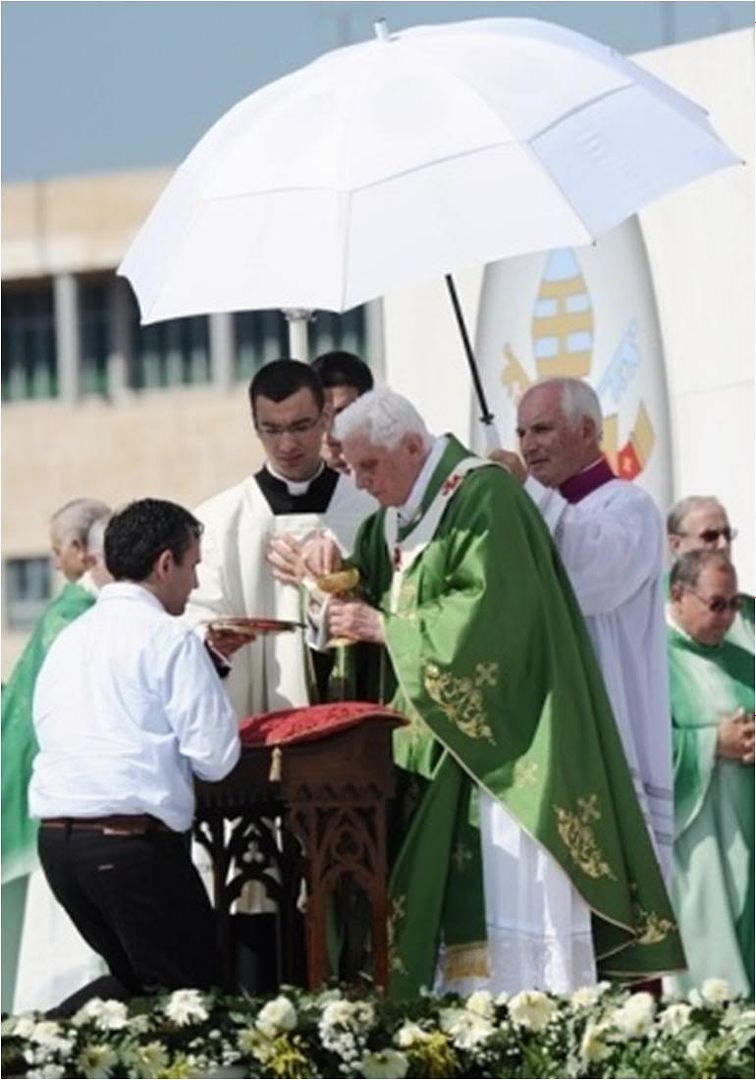 Pope prays that rosary may fortify
Pope prays that rosary may fortify
the faithful in theological virtues

Palermo, Italy, Oct 3, 2010 (CNA/EWTN News).- At noon on Sunday, Pope Benedict prayed that all people might be strengthened in faith, hope and charity through the intercession of Mary. He asked, in particular, that she lead the faithful to "walk quickly and joyfully on the way of holiness."
Pope Benedict prayed the Angelus with an estimated 250,000 people present in Palermo, Sicily at the city's Foro Italico park during his pastoral visit there.
Widely present among the attendees were banners bearing images of Fr. Pino Puglisi, a much-loved priest who was killed in Palermo by the Mafia in 1993.
Recalling the island's strong Marian devotion, Pope Benedict entrusted all Sicilian faithful to the Virgin Mary before the Angelus.
He especially asked Our Lady to support families in love and educational commitment, to make the "seeds" of vocations fruitful among young people and to give people "courage in trials, hope in difficulties and renewed impetus to do good.
"May the Madonna comfort the sick and all the suffering," he continued praying, "and help Christian communities so that no person be marginalized or in need, but that each, especially the smallest and weakest, might feel accepted and valued."
Mary, said the Pope, "is the model of Christian life" to whom "we ask most of all to help us walk quickly and joyfully on the way of holiness, in the footsteps of so many brilliant witnesses of Christ, children of the Sicilian lands."
Remembering the concurrent celebration of the beatification of Anna Maria Adorni in Parma, Italy, today, Benedict XVI cited her devotion to saying the rosary.
And in the Marian month of October, the Holy Father prayed that the "daily meditation of the mysteries of Christ in union with Mary, the 'praying Virgin', might fortify us all in faith, hope and charity."
Here is a full translation of the Holy Father's remarks before the Angelus prayers:
Dear brothers and sisters:
At this moment of profound communion with Christ, who is present and living in our midst and within us, it is a beautiful thing to address ourselves as an ecclesial family to His Mother and ours, the Most Blessed Mary Immaculate.
Sicily is constellated with Marian shrines, and from this place, I feel myself spiritually in the center of this 'network' of devotion which unites all the cities and towns of the island.
To the Virgin Mary, I wish to entrust all the People of God who live on this beloved land. May she sustain families in love and in the educational challenge. May she make fruitful the seeds of vocation that God sows broadly among the young. May she instill courage in trials, hope in difficulties, and a new impulse to do good.
May Our Mother comfort the sick and all who suffer, and help the Christian communities so that no one shall be marginalized or needy, but that each one, especially the least and the weakest, may feel welcome and valued.
Mary is the model of Christian life. From her I ask most of all to let you journey joyfully on the road to sanctity, in the steps of so many luminous witnesses to Christ, who are children of the Sicilian soil.
In this context, I wish to remind you that today, in Parma, Anna Maria Adorni was proclaimed Blessed. In the 19th century, she was an exemplary wife and mother, and later, as a widow, she dedicated herself to charity towards women in prison and in other difficulties, for whom she founded two religious institutes.
Mother Adorni, because of her constant prayer, was called the 'living rosary', and I am happy to point to this at the start of the month dedicated to the Holy Rosary.
May the daily meditation of the mysteries of Christ in union with Mary, the prayerful virgin, fortify us all in faith, in hope and in charity.
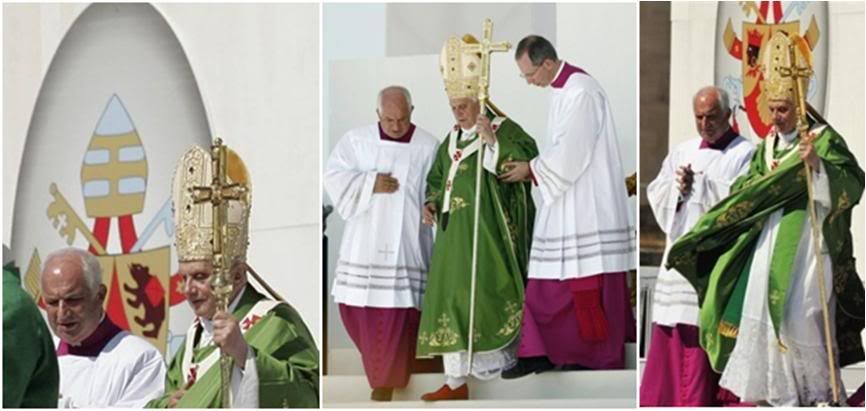
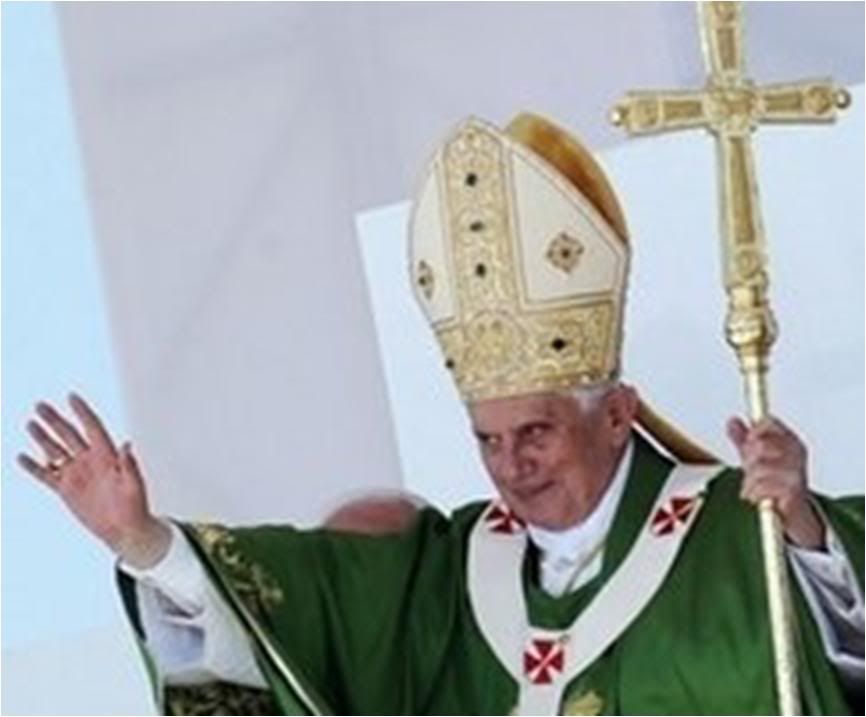
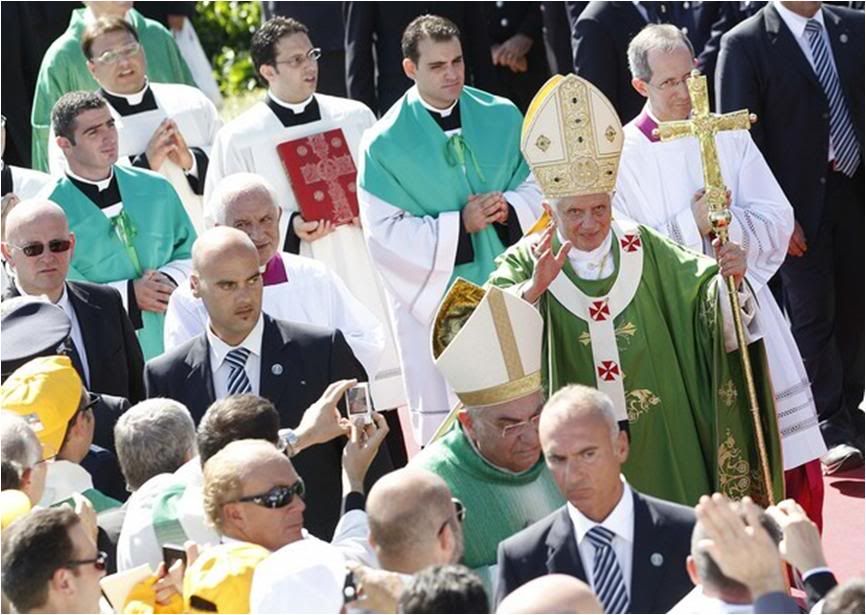
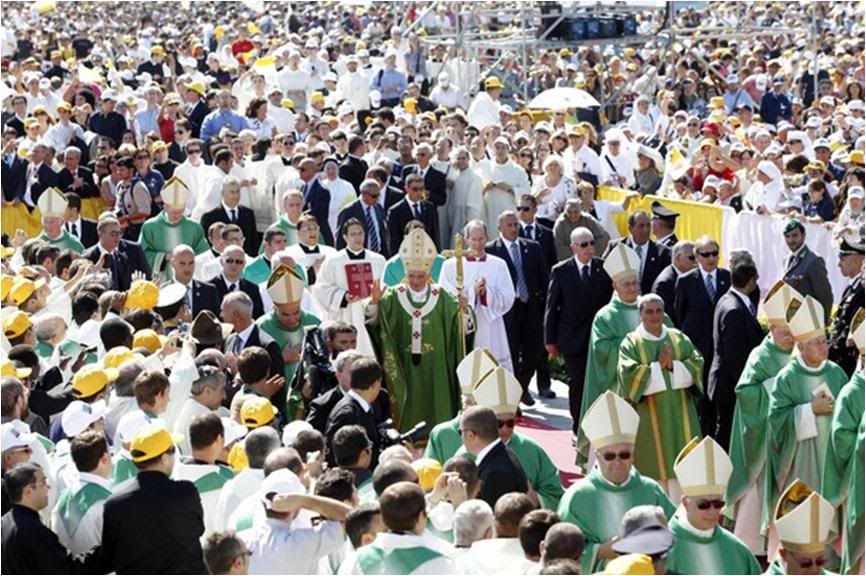
After Mass, the Pope proceeded by Popemobile to the Archbishop's Palace to lunch with the bishops of Sicily and for a midday rest.
At 4:30 p.m., before leaving the Archbishop's Palace, the Holy Father greeted the organizers of the visit.
The Pope then left the Archbishop's Palace and walked to the Cathedral of the Assumption, for a meeting with priests, religious, and seminarians. He was welcomed to the cathedral by its canons.
[Modificato da TERESA BENEDETTA 05/10/2010 05:03] |
| |
 03/10/2010 18:40 03/10/2010 18:40 |
|
| | | OFFLINE | | Post: 21.142
Post: 3.779 | Registrato il: 28/08/2005
Registrato il: 20/01/2009 | Administratore | Utente Master | |
|
 Robertson's bid to indict Pope
Robertson's bid to indict Pope
ends in unholy row:
Lawyer who would arrest the Pope
cannot even respect debate rules
by DAVID MARR

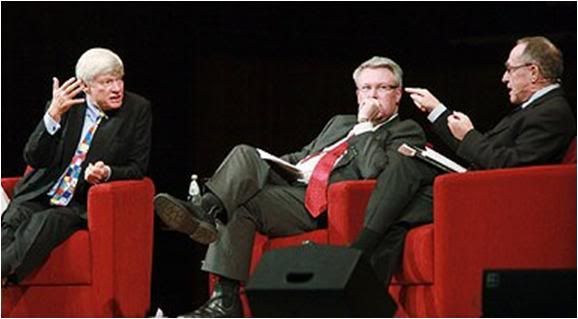 Robertson, the moderator, and Dershowitz during the debate.
Robertson, the moderator, and Dershowitz during the debate.
Sydney, Oct. 3 - "Let me start," said Geoffrey Robertson about 10 minutes into his pitch at the Festival of Dangerous Ideas, "by saying this … " The London QC of Sydney extraction was having problems with the clock as he called for the Pope to be arraigned for crimes against humanity.
The chairman tried warning gestures, civil glances and banged his glass on an empty Schweppes bottle. Nothing worked. Robertson had things to say and could not be stopped.
His adversary, Alan Dershowitz, provoked warm applause with his first words: "What I want to do in the time I've been allotted for my remarks …''
The Robertson v Dershowitz clash was the star turn at this year's talk fest at the Opera House. The Concert Hall was packed. Big crowds turned out all weekend to listen to speakers spruiking edgy ideas about war, terrorism, climate change, wealth, music and happiness.
But the really dangerous stuff came from the floor. That elegant old leftie Tariq Ali ("What we can learn from terrorists") sat aghast as a man on microphone 2 confessed to cheering as the twin towers came down. "At last," said this voice in the dark, "someone was serving it up to them." In a suddenly silent opera theatre one person applauded.
Ali brought cheerful news of Tony Blair's memoirs: "Activists in Britain have been picking up his book and putting it in the crime section."
Should the leaders of the coalition of the willing be prosecuted for war crimes, he was asked? "Blair and Bush certainly," Ali replied. "But not Kevin Rudd. He has trials enough of his own."
Dragging the great before the International Criminal Court was a theme of the weekend. For Robertson, the Pope as a head of state - "though the Vatican is the size of a golf course and no one is born there except by unhappy accident" - should answer to the ICC for the scandal of child abuse in the Church.
Dershowitz, the Harvard professor best known internationally for his defence of Israel, counter-attacked: "Do not sacrifice due process and separation of church and state on the altar of the terrible crime of child abuse." [Dershowitz discusses his arguments amply in the inrterview posted on this thread on 9/30 in the preceding page.]
He defended the Pope and defended the church - "It is far safer today than it was in the past" - but concentrated his attack on the notion that heads of state can so easily be brought before the ICC. That's why Dershowitz has a dog in this fight.
"Crimes against humanity must be part of an overarching plan or tactic," he insisted, a formula that fitted Yasser Arafat better than Benedict XVI.
But Arafat was never prosecuted for his crimes. "He should have been."
By the end, Robertson proved rather a trial for the festival organisers. He refused to allow his clash with Dershowitz be telecast by the ABC. [So much for sportsmanship. Robertson long ago decided to abandon fair play. Has he any shred of decency left?]
Organisers understand he plans a rematch in London and isn't keen for the world to see the out-of-town tryout. At some future date, the contest of the advocates will be streamed on the Opera House website.
[Modificato da TERESA BENEDETTA 05/10/2010 04:58] |
| |
 03/10/2010 19:25 03/10/2010 19:25 |
|
| | | OFFLINE | | Post: 21.143
Post: 3.780 | Registrato il: 28/08/2005
Registrato il: 20/01/2009 | Administratore | Utente Master | |
|
 MEETING WITH THE CLERGY,
MEETING WITH THE CLERGY,
RELIGIOUS AND SEMINARIANS
Cathedral of Palermo
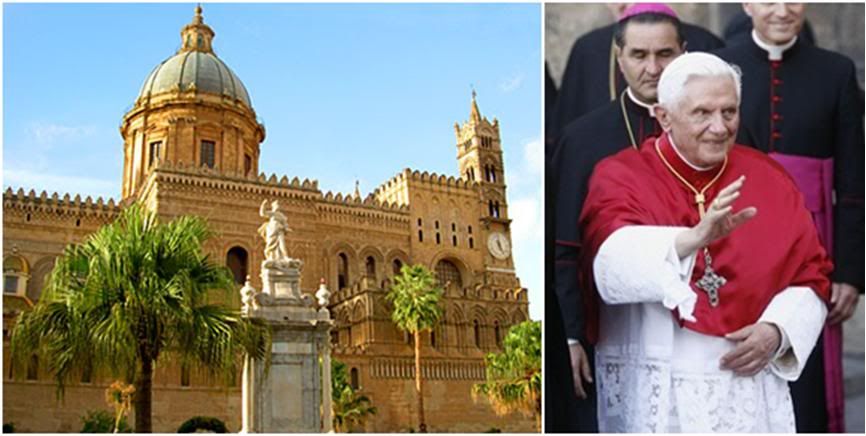 So who says Benedict XVI does not identify the Mafia by name?
Pope holds up Fr. Puglisi
So who says Benedict XVI does not identify the Mafia by name?
Pope holds up Fr. Puglisi
'killed by the Mafia'
as a heroic example

PALEREMO, Oct. 3 (Translated from Apcom) - The Pope today called on the priests of Palermo ti imitate 'the heroic example' of Don Pino Puglisi, the parish priest of Brancaccio who was killed by the Mafia in 1993. [Pino was the priest's nickname, from Giuseppino, the diminutive of his first name.]
In his address to the priests, religious and seminarians of Sicily at the Cathedral of Palermo this afternoon, Benedict said:
"The church of Palermo recently observed the anniversary (Sept. 15) of the barbarous assassination of Fr. Giuseppe Puglisi, who belonged to your presbyterate, and who was killed by the Mafia.
"He had a heart that burned with authentic pastoral charity: in his zealous ministry, he gave ample attention to teh education of children and youth, while he did all he could so that every Christian family in his flock would live up to its fundamental calling as the first educators of their children in the faith."
The Pope pointed out that the flock that had been entrusted to Don Puglisi's pastoral care has been able to draw from the spiritual legacy of a good pastor, whose cause for beatification is under way.
"I call on you," teh Pope concluded, "to keep alive his fertile priestly witness by imitating his heroic example".
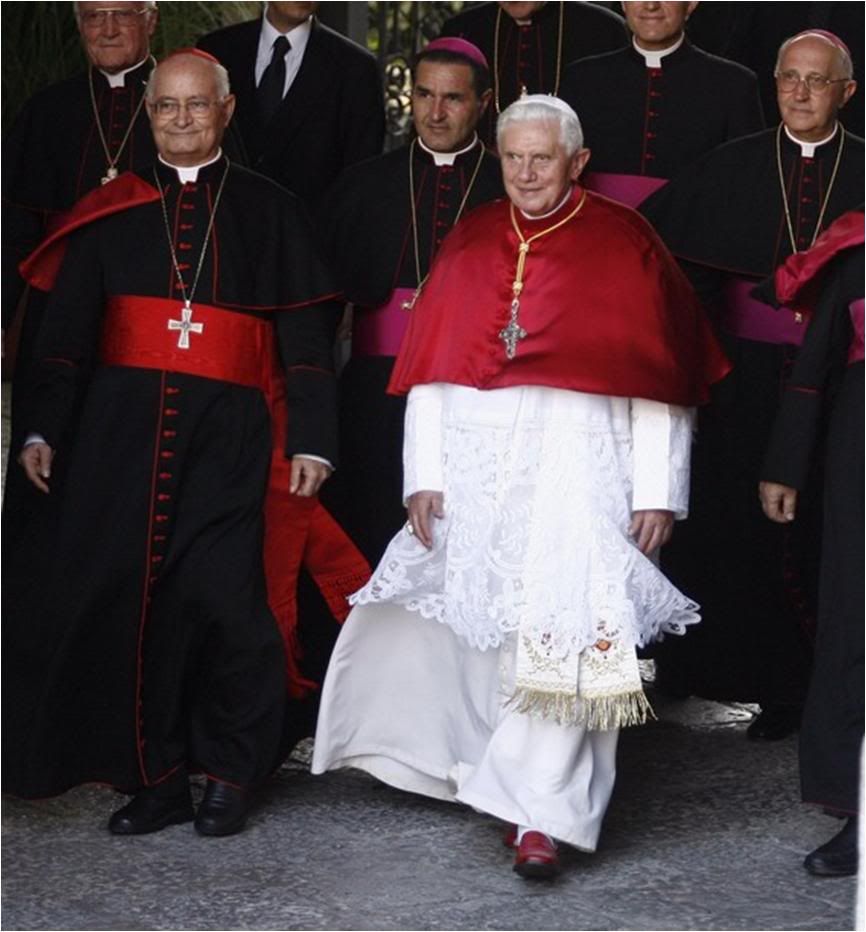 This is the only other news agency photo so far of the Cathedral event.
Here is a translation of the Holy Father's address in the Cathedral:
This is the only other news agency photo so far of the Cathedral event.
Here is a translation of the Holy Father's address in the Cathedral:
Venerated Brothers in the Episcopate,
Dear brothers and sisters:
During this pastoral visit of mine to your land, I could not omit a meeting with you. Thank you for your welcome!
I was glad to note the parallel drawn in the words of the Archbishop between the beauty of the Cathedral and that of the edifice of 'living stones' that you constitute.
In this brief but intense moment with you, I can admire the face of the Church in the variety of her gifts. And, as the Successor of Peter, it is my joy to confirm you in the one faith, and in the profound communion that the Lord has given us.
I express my gratitude to Mons. Romeo, and I extend it to the Auxiliary Bishop. To you, dear priests of this archdiocese and of all the dioceses of Sicily, and you, dear deacons and seminarians, and you, the religious communities and consecrated laymen, my most heartfelt greeting which I hope you will extend to all your fellow brothers and sisters throughout Sicily, especially to those who are sick and aged.
The Eucharistic Adoration, which we had the grace and joy to share just now, revealed to us and made us feel the profound sense of who we are: members of the Body of Christ which the Church is.
Prostrate before Jesus, here among you, I asked him to inflame your hearts with his love, so that you may be assimilated to him and you may imitate him in the most complete and self-giving to the Church and your fellowmen.
Dear priests, I wish to address myself to you first of all. I know that you work with zeal and intelligence, without sparing your energies. The Lord Jesus, to whom you have consecrated your life, is with you.
Always be men of prayer so that you can also be teachers of prayer. Let your days be marked by times for prayer, during which, following the example of Jesus, you may engage in regenerating conversation with the Father.
It is not easy to remain faithful to these daily appointments with the Lord, especially these days when the rhythm of life has become frenetic and our tasks absorb us in ever greater measure.
Nonetheless, we must convince ourselves that time for prayer is fundamental. In prayer, divine grace acts most effectively, giving fruitfulness to our ministry. So many things concern us urgently, but if we are not interiorly in communion with God, we cannot give anything to others. We must always find the time that we need to 'be with him' (cfr Mk 3,14).
The Second Vatican Council said about priests: "It is, above all, in eucharistic worship or synaxis that they exercise their sacred ministry" (Dogm. consti Lumen gentium, 28).
The Eucharist is the source and summit of Christian life. Dear friends, can we say that it is also that for us, personally, for our life as priests? How much care do we place in preparing ourselves for Holy Mass, in celebrating it, in remaining in adoration? Are our churches truly the 'house of God', to which his presence attracts people, who today, unfortunately, often feel the absence of God?
The priest always finds - in an immutable way - the source of his identity in Christ the Priest. It is not the world that determines our status, according to the needs and concepts of social functions. The priest is marked by the seal of Christ's Priesthood in order to participate in his function as the only Mediator and Redeemer.
This fundamental link opens for the priest the immense field of service to souls, for their salvation in Christ and in the Church. A service that should be completely inspired by Christ's love.
God wants all men to be saved, that no one may be lost. The Holy Curate of Ars said: "The priest must always be ready to respond to the needs of souls. He is not for himself, he is for others".
The priest is for the faithful: he inspires them and sustains them in the exercise of the common priesthood of the baptized, in their journey of faith, in cultivating hope, in living in charity, the love of Christ.
Dear priests, always pay special attention to the world of the young. As the Venerable John Paul II said once on this land: Open wide the doors of your parishes to the young so that they can open the doors of their heart to Christ! Never should they find your doors closed.
The priest cannot stay far from the daily concerns of the People of God. He must instead be very near to them, but as a priest, always from the perspective of salvation and the Kingdom of God.
He is witness and dispenser of a life that is different from earthly life (cfr Decr. Presbyterorum Ordinis, 3). He is the bearer of a strong hope, of 'reliable hope', that of Christ, with which to face the present, even if it is often effortful (cfr Enc. Spe salvi, 1).
It is essential for the Church that the identity of the priest be safeguarded, with its 'vertical' dimension. The life and the prsonality of St. Jean Marie Vianney, and all the many saints of your land, like St. Annibale Maria di Francia, Blessed Giacomo Cusmano and Blessed Francesco Spoto, are particularly illuminating and vigorous demonstrations of this.
The Church of Paltermo recently marked the anniversary of the barbarous assassination of donGiuseppe Puglisi, who belonged to this presbyterate, and was killed by the Mafia.
He had a heart that burned with authentic pastoral charity. In his zealous ministry, he gave ample attention to the education of children and youth, and at the same time, he did all he could so that every Christian family in his care lived its fundamental calling as the first educators in the faith of their children.
The people entrusted to his pastoral care have drawn from the spiritual wealth of this good shepherd, whose cause for beatification is under way. I call on you to keep alive the memory of his frutiful priestly testimony, by imitating his heroic example.
With great affection, I also address you who in various forms and institutions, live out your consecration to God in Christ and in the Church, with a special thought to the cloistered monks and nuns whose service of prayer is so valuable to the ecclesial community.
Dear brothers and sisters, continue to follow Jesus without compromises, as the Gospel proposes, thus bearing witness to the beauty of being Christian in a radical way.
It is your task especially to keep alive in every baptized person the awareness of the fundamental demands of the Gospel. In fact, your very presence and your lifestyle impose on the ecclesial community a valuable impetus towards the 'high standard' of Christian vocation.
Indeed, we could say that your existence constitutes a kind of preaching, very eloquent although often silent. Yours, dearest ones, is a style of life that is ancient and ever new, despite the reduction in your numbers and in powers.
But be confident: our times are not those of God and his providence.['I nostri tempi non sono quelli di Dio e della sua provvidenza'. ?????] It is necessary to pray and to grow in personal and community holiness. Then the Lord will provide!
With particular affection, I greet you, dear seminarians, and call on you to respond generously to the call of the Lord and to the expectations of the People of God - by growing in identification with Christ, the Supreme Priest, preparing yourself for your mission with a solid human, spiritual, theological and cultural formation.
The seminary is more than ever valuable for your future, because through total experience and patient work, it will lead you to become pastors of souls and teachers of faith, ministers of the sacred mysteries, and bearers of the love of Christ.
Live this time of grace with commitment, and keep in your heart the joy and enthusiasm of the first moment that you heard the call, and of your Yes, when, responding to the mysterious voice of Christ, you underwent a decisive turning point in your life.
Be obedient to the instructions of your superiors and those who are responsible for your growth in Christ, and learn from him to love every child of God and the Church.
Dear brothers and sisters, as I thank you once more for your affection, I assure you of remembrance in my prayers, so that you may continue with renewed impetus and strong hope the journey of faithful adherence to Christ and generous service to the Church.
May the Virgin Mary, our Mother, always assist you. May you be protected by Saint Rosalia and all the patron saints of Sicily. And may the Apostolic Blessing go with you which I impart from the heart to you and your communities.
Thank you.
[Modificato da TERESA BENEDETTA 04/10/2010 04:49] |
| |
 03/10/2010 19:40 03/10/2010 19:40 |
|
| | | OFFLINE | | Post: 21.144
Post: 3.781 | Registrato il: 28/08/2005
Registrato il: 20/01/2009 | Administratore | Utente Master | |
|
 MEETING WITH YOUNG PEOPLE AND FAMILIES
MEETING WITH YOUNG PEOPLE AND FAMILIES
Piazza Politeama
"Do not yield to the suggestions of the Mafia, which is a way of death, incompatible with the Gospel, as your bishops have told you so many times!"
- Benedict XVI to the young people of Sicily
Oct. 3, 2010
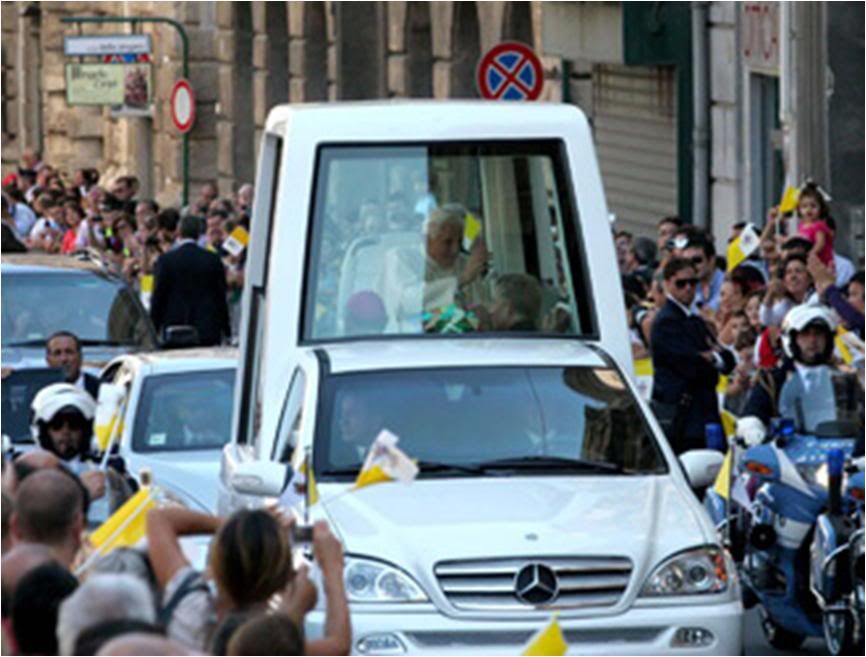
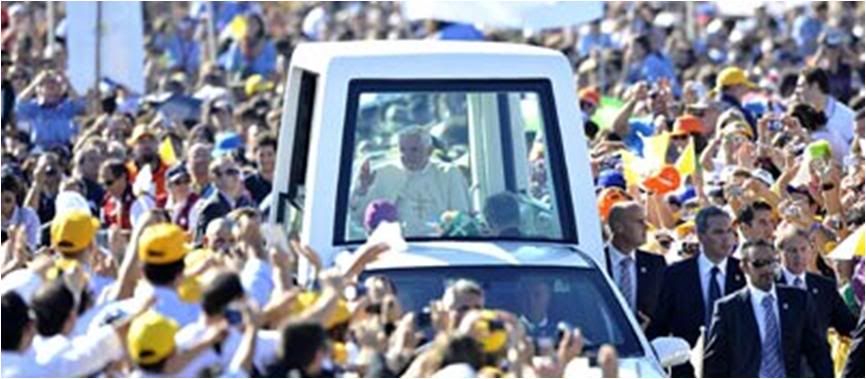
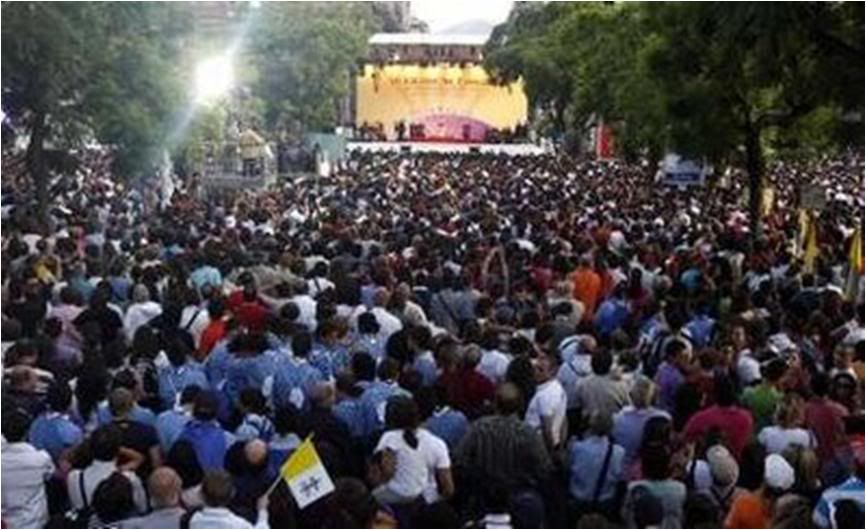
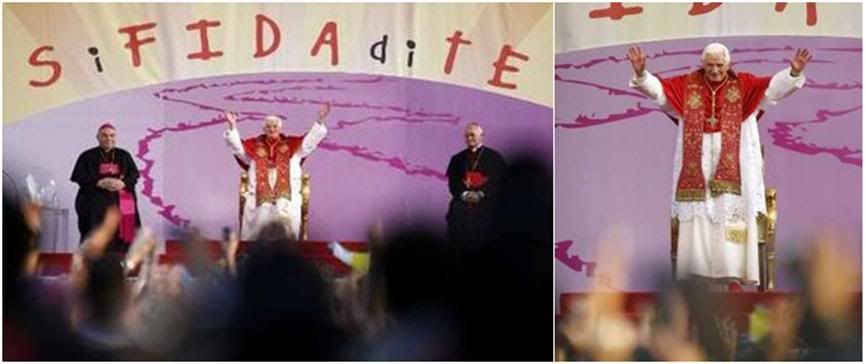
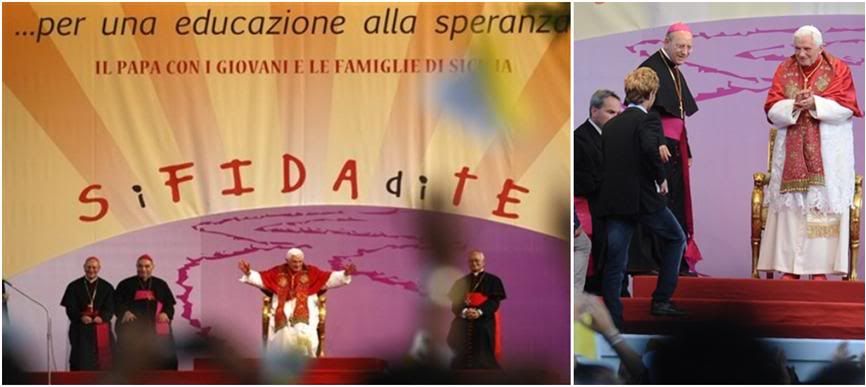 The streamer carries the pastoral motto of the Sicilian youth for the triennium: SI FIDA DI TE! - 'Have trust in yourself'
It's frustrating that these are all the pictures available so far from the newsphoto agencies from this event. No crowd shots other than the one general shot from the rear.
Benedict XVI condemns the Mafia
Translated from
The streamer carries the pastoral motto of the Sicilian youth for the triennium: SI FIDA DI TE! - 'Have trust in yourself'
It's frustrating that these are all the pictures available so far from the newsphoto agencies from this event. No crowd shots other than the one general shot from the rear.
Benedict XVI condemns the Mafia
Translated from

Oct. 3, 2010
Applause and shouts of approval followed the words that Benedict XVI said about the Mafia during his meeting with representatives of Sicilian youth at Piazza Politeama.
The Pope was interrupted twice with acclamation - after saying that "The Mafia is a way of death, incompatible with the Gospel".
Galeazzi is the Vaticanista for La Stampa. His blog entry is rather lengthy, and contains generous exceprts from the Pope's address. I just wanted to post his lead ASAP because of the implications in the Anglophone news agency coverage of the Mass this morning that somehow Benedict XVI was unable to denounce the Mafia by name....]
Here is a full translation of the Holy Father's address at Piazza Politeama. All of the Holy Father's texts today were very beautiful, as usual - great models of pastoral discourse, in which he manages to be both one's local pastor as well as the Universal Pastor. But this last one is extraordinary because he takes off from the example of the newly beatified Chiara Badano, who embodies very well the model of holiness that the Pope urges on everyone.
Dear young people and dear families of Sicily:
I greet you with great affection and joy! Thank you for your joy and your faith.
This meeting with you is the last event of my visit today to Palermo, but in a certain sense, it is the central one, because it was the occasion for the invitation extended to me - to your regional meeting of young people and families.
So I should start by thanking, first of all, Mons. Mario Russotto, Bishop of Caltanissetta, who is the responsible official for the pastoral care of young people and families at the regional level, and then the two young people Giorgia and David [who delivered greetings in the name of the gathering].
Dear friends, your greeting was more than just that - it was a sharing of faith and hope. I thank you from my heart.
The Bishop of Rome, wherever he goes, confirms Christians in their faith, but returns home confirmed in his faith, by your joy, by your hope!
Therefore, young people and families, let us take advantage of this encounter, of being together, which cannot be simply circumstantial or functional. It has a meaning, a human value, that is Christian and ecclesial.
And I wish to start off not with any reasoning, but with a testimony, of a story that was lived and is most relevant.
I think all of you know that last Saturday, September 25, in Rome, an Italian girl was proclaimed Blessed, and her name was Chiara Badano. I invite you all to get to know her: her life was brief but it is a stupendous message.
Chiara was born in 1981 and died in 1990 from an incurable illness. Nineteen years which were full of life, of love, of faith. And the last two years, also full of pain, but always borne in love and in the light, a light that radiated around her and came from within her, from her heart filled with God.
How was it possible? How could a girl of 17 live that kind of suffering, without human hope, but spreading love, serneity, peace, faith?
Obviously, it was the grace of God, but this grace was also prepared for and accompanied by human collaboration: that of Chiara herself, certainly, but also of her parents and friends.
First of all, her parents and her family. Today, I wish to underscore that in particular. The parents of Blessed Chiara Badano are alive. They were in Rome for the beatification - I met them later personally - and they are witnesses to the fundamental fact that explains everything: their daughter was filled with the light of God.
This light, which comes from faith and love, is one that they lit in her: Father and mother lit the flame of faith in the soul of their daughter and helped Chiara to keep that flame always alive, even in the difficult moments when she was growing up, but above all, during her great and long trial by suffering. Just as it was for the Venerable Maria Carmelina Leone who died at age 17.
This, dear friends, is the first message that I wish to leave you: the relationship between parents and children, as you know, is fundamental, but not only out of tradition, and rightly so, a tradition that I know is very much felt by Sicilians.
But there is something else that Jesus taught us: the torch of faith that is transmitted from one generation to the next. That flame which is present in the rite of Baptism, when the priest says: "Receive the light of Christ - the Paschal sign... a flame that you must nourish".
The family is fundamental because it is where the perception of the meaning of life first germinates. It germinates in the relationship with mother and father, who are not masters of their children's lives, but the first collaborators of God in the transmission of life and faith.
This happened in an exemplary and extraordinary way in the family of Blessed Chiara Badano, but it also happens in many families. Sicily has splendid examples of young people who grew like beautiful luxuriant plants, after having sprouted in the family, with the grace of the Lord and human collaboration.
I can think of Blessed Pina Suriano; Venerable Maria Carmelina Leone and Venerable Maria Magno, a great educator; the Servants of God Rosario Livatino, Mario Giouseppe REstivo, and so many young people that you know!
Often their actions are not known, because bad deeds make more noise, but they are the strength and the future of Sicily. The image of a tree is very significant for representing man. The Bible uses it, for example, in the Psalms.
Psalm 1 says: Blessed is the man who meditates on the law of thr Lord because he is "like a tree planted near streams of water, that yields its fruit in season" (v. 3).
These 'streams of water' can be the 'river' of tradition, the 'river' of faith from which we draw the lymph of life.
Dear young people of Sicily, be like trees that have roots in the 'river' of goodness. Do not be afraid to oppose evil! Together, you will be like a forest that grows, a silent force capable of bearing fruit, of bringing life and of renewing your land in a profound way.
Do not yield to the suggestions of the Mafia, which is a way of death, incompatible with the Gospel, as your bishops have told you many times.
The Apostle Paul takes up the image of the tree in his Letter to the Colossians, where he exhorts Christians to be "rooted and founded in Christ, firm in the faith" (cfr Col 2,7).
You know that these words are the theme of my Message for World Youth Day in Madrid next year.
The image of the tree tells us that each of us needs fertile ground in which to send down our roots, ground that is rich with nutritive substances which make the person grow: these are the Christian values, above all, love and faith, knowing the true face of God, awareness that he loves us infinitely, faithfully, patiently, to the point of giving his life for us.
In this sense, the family is a 'little church', because it transmits God, it tasnsmits the love of Christ, by virtue of the sacrament of matrimony.
The divine love that has united man and woman and that has made them parents is capable of inspiring in the hearts of their children the sprout of faith, the light of the profound meaning of life.
And here we come to another important element which I can only cite briefly: the family, although it is a 'little church', must live within the 'great Church', that is, within the family of God which Christ came to form.
Here, too, we have testimony from Blessed Chiara Badano, and all the young saints and blesseds: together with our original family, the great family of the Church is fundamental, as it is encountered and experienced in the parish, in the diocese.
For Blessed Pina Suriano, it was Catholic AC\ction - which is widely present in this land. For Blessed Chiara Badno, it was the Focolari movement. Indeed, even church movements and associations do not serve themselves but Christ and the Church.
Dear friends, I know your difficulties in the present social context, which are the difficulties of all young people and families today, particularly in southern Italy.
i also know the commitment with which you have sought to act and face these problems, alongside your priests, who are, for you, fathers and brothers in the faith, as Don Puglisi was.
I thank God that I have met you, because wherever there are young people and families who choose the way of the Gospel, there is hope. And you are a sign of hope not only for Sicily but for all Italy.
I have brought to you an example of holiness, and you are offering me yours: the faces of so many young people of this land who have loved Christ with evangelical radicalness, and your own faces, as in a mosaic.
This is the greatest gift that we have received: to be a Church, to be, in Christ, a sign and instrument of unity, of peace, of true freedom. No one can take this power away from us.
Take courage, dear young people and families of Sicily! Be saints! In the school of Mary, our Mother, put yourself at the full disposal of God, let yourselves be shaped by his Word and his Spirit, so that you may remain, even more, salt and light in your beloved land. Amen.
10/4/10
P.S. Making up for what the news agency photos did not show are these photos from

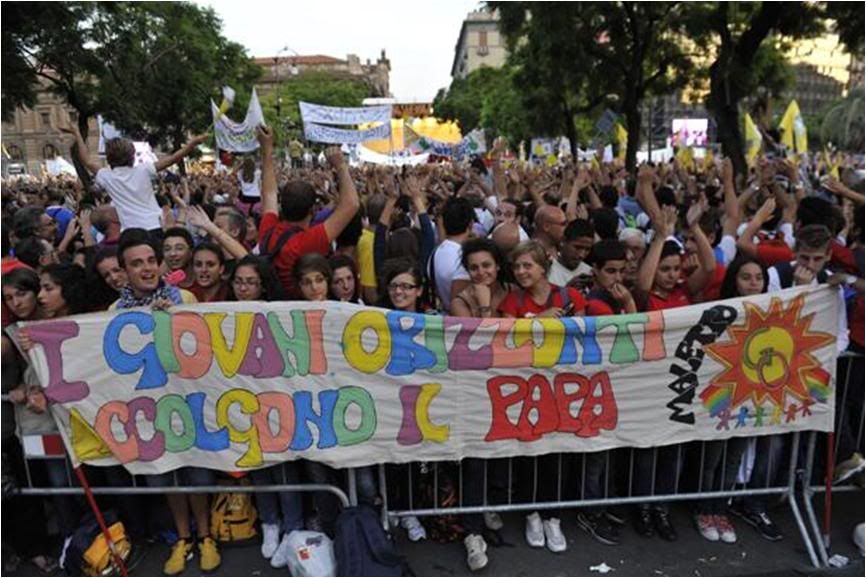
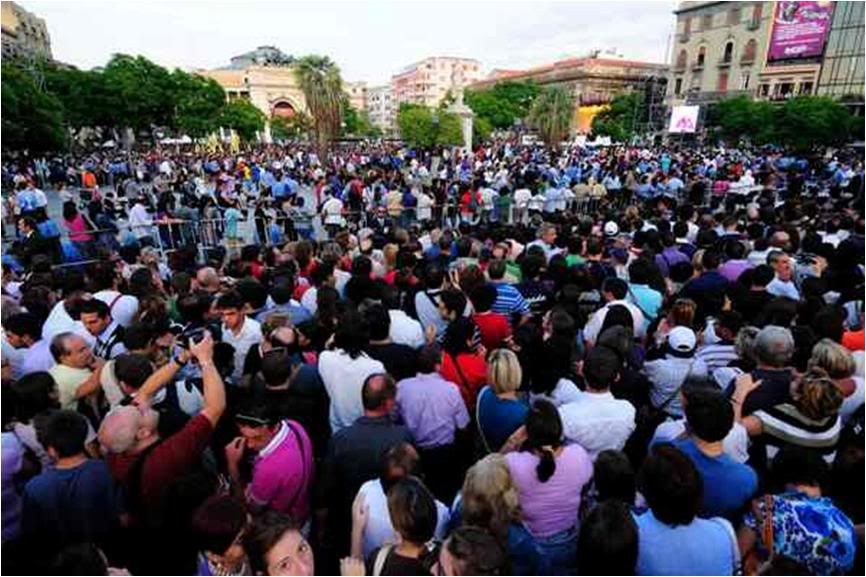 Below, the Pope thanks the youth reps David and Giorgia who spoke for their colleagues:
Below, the Pope thanks the youth reps David and Giorgia who spoke for their colleagues:
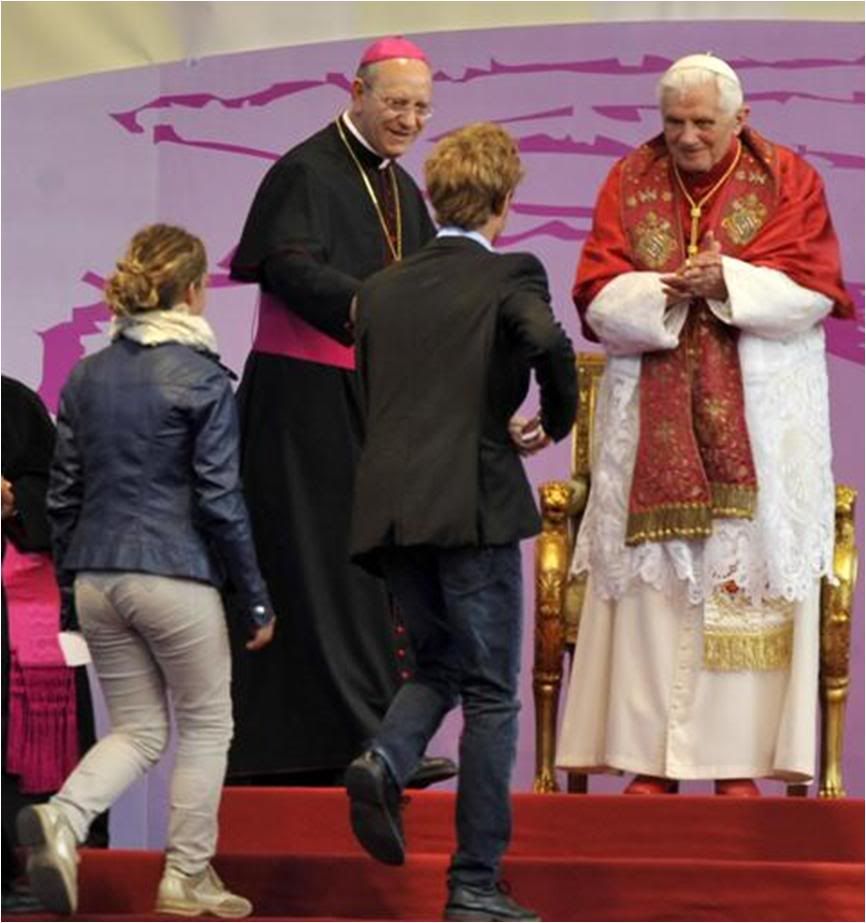
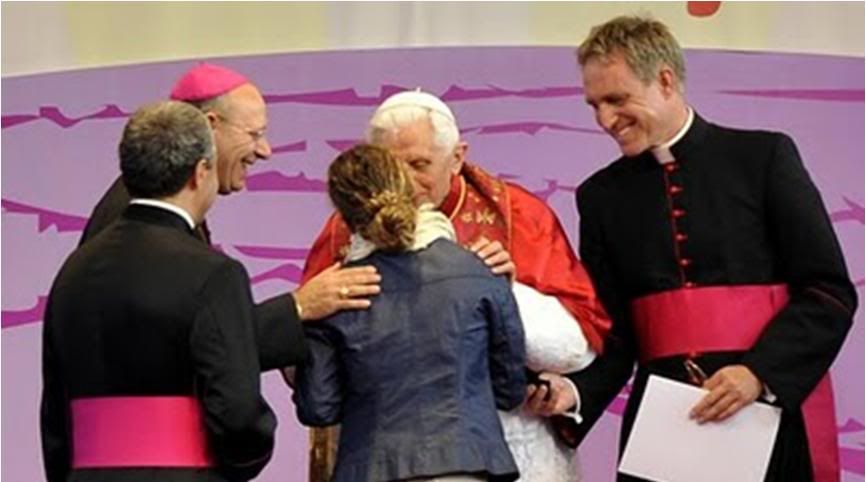
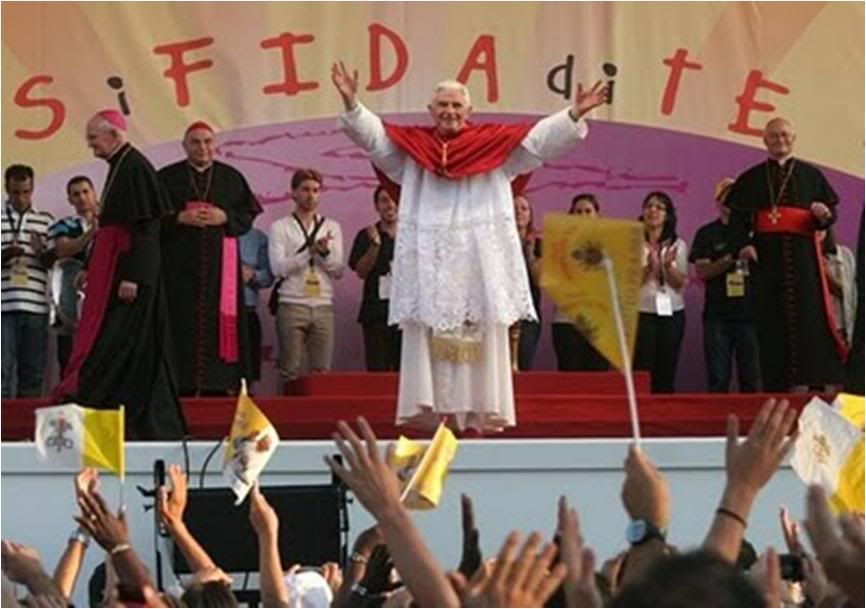
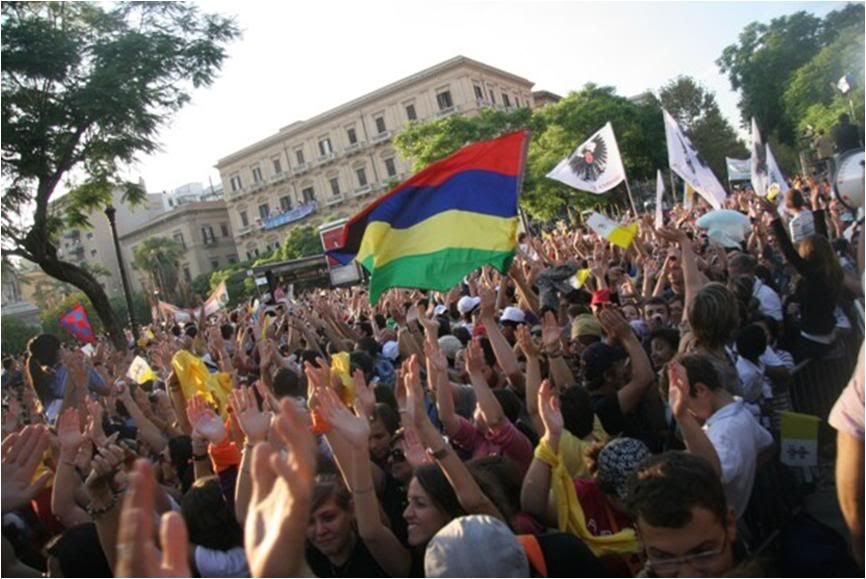
[Modificato da TERESA BENEDETTA 04/10/2010 15:45] |
| |
 04/10/2010 02:08 04/10/2010 02:08 |
|
| | | OFFLINE | | Post: 21.145
Post: 3.782 | Registrato il: 28/08/2005
Registrato il: 20/01/2009 | Administratore | Utente Master | |
|
 Pope makes unscheduled stop
Pope makes unscheduled stop
to lay flowers at monument to
a judge killed by the Mafia
Translated from

October 3, 2010
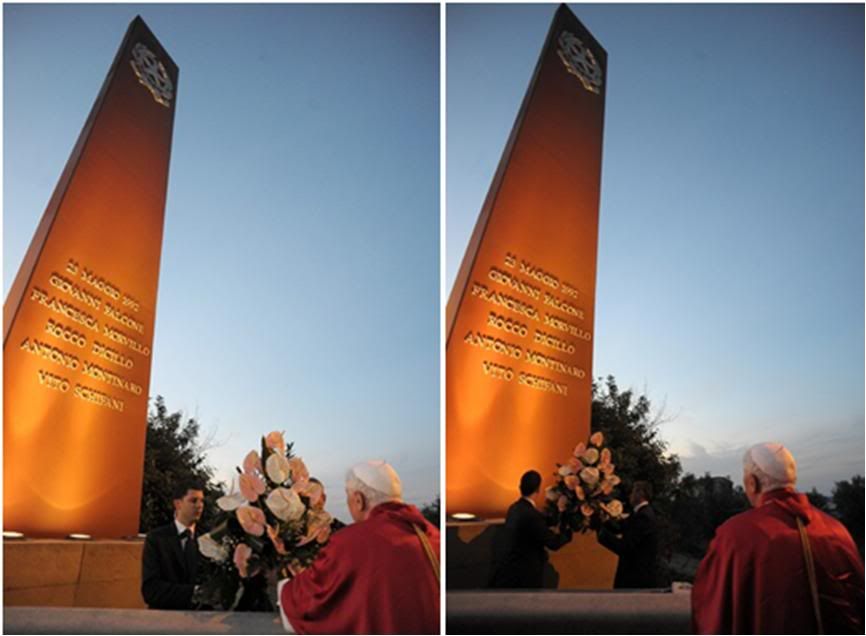
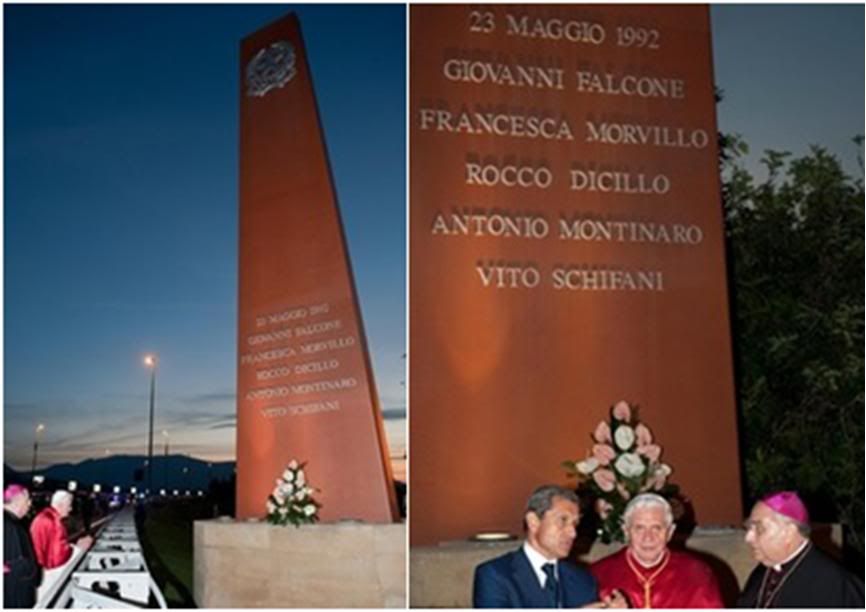
During the ride from Palermo to the Falcone-Borsellino airport in Punta Raisi, the Pope asked that the motorcade stop at Capaci, at the point where Judge Giovanni Falcone and his escorts were assassinated in 1995.
He left the car to place a bouquet of flowers on one of the marble steles ercted to commemrorate the victims and offered a prayer for all the victims of the Mafia and other forms of organized crime.
The motorcade then proceeded to the airport and the flight back to Rome.
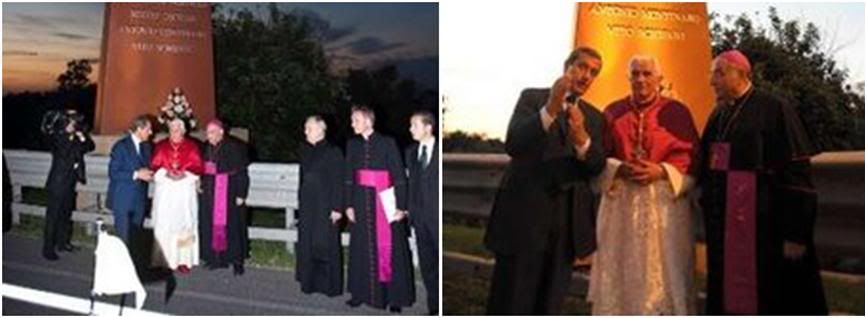
The Falcone-Borsellino airport is, in fact, named for Judge Falcone and one other judge who was also assassinated by the Mafia.
 Salvatore Izzo, in his excellent pre-visit story posted earlier on this page, already referred to Cardinal Ratzinger's previous visit to Palermo in 2000. Here's a bit more detail... Too bad I can't find any photos to go with it.
Faith, words and art:
Salvatore Izzo, in his excellent pre-visit story posted earlier on this page, already referred to Cardinal Ratzinger's previous visit to Palermo in 2000. Here's a bit more detail... Too bad I can't find any photos to go with it.
Faith, words and art:
Joseph Ratzinger's previous
visit to Palermo
Translated from

It was Benedict XVI's first visit to Palermo as Pope. But not his first. When he was the Prefect for the Congregation for the Doctrine of the Faith, Cardinal Joseph Ratzinger flew to Palermo for a visit that remains in the annals of the city.
It was March 13, 2000 - during the Grand Jubilee Year, no less - and he had been invited by Cardinal Salvatore De Giorgi, then Archbishop of Palermo, to inaugurate the 'Week of Faith' in Palermo Cathedral.
The bioethical challenge, inter-religious dialog, the task of Catholic missions, and of course, God-become-man, were the themes that the cardinal spoke about to an audience of 1,500 who well remember his lecture, even if at the time, it was farthest from anyone's mind that the lecturer would be Pope in five years!
His hosts also remember how fascinated he was, looking up enrapt at the magnificent mosaics of the Cathedral in Monreale. He was impressed by the beauty and fidelity to Scripture of the scenes depicted in the mosaics and stunned by Monreale's great Christ-Pantocrator on the dome, just as he was utterly enchanted by the jeweled wonders of the Cappella Palatina in the Palace of the Normans.
It was a taste of Sicily which must surely have stayed in his heart.
 I was wondering how I could work in Monreale into this coverage, but this gives me the opening. Forgive the indulgence, but one cannot go to Palermo and not visit Monreale, which is a short trip by public bus outside the city.
I was wondering how I could work in Monreale into this coverage, but this gives me the opening. Forgive the indulgence, but one cannot go to Palermo and not visit Monreale, which is a short trip by public bus outside the city.
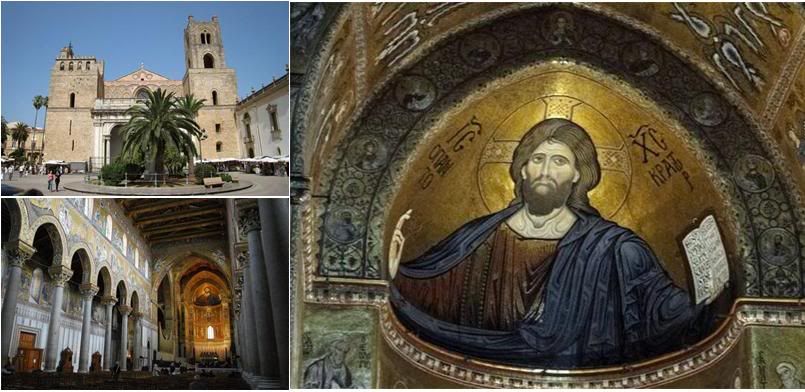 Do not be deceived by the exterior. The whole church-monastery complex was first built in the late 12th century and is considered the best amalgam of Norman, Byzantine and Arab architecture from that time. Its Benedictine cloister is arguably the world's most beautiful, best preserved and largest medieval cloister. And yet its exquisite adornment almost pales compared to the 6,600 square meters of mosaic work, representing the most extensive extant cycle of Biblical illustrations, that covers the church interior. (Only Hagia Sophia in Istanbul had a greater mosaic area, but much of it, of course, has been lost.) When one contemplates the mosaics of Ravenna, Santa Maria Maggiore and Monreale, one realizes that mosaic artists are the most under-rated in the visual arts. It is mind-boggling to think how they can manage to put together the thousands of colored glass bits to produce the seamless artistry that they do. I find the the Christ Pantocrator (Almighty) of Monreale as stunning as the Christ in Michelangelo's Last Judgment. (It's as high as a four-story building, to begin with). But, of course, Monreale is more than just its mosaics, as awesome as they are....
Do not be deceived by the exterior. The whole church-monastery complex was first built in the late 12th century and is considered the best amalgam of Norman, Byzantine and Arab architecture from that time. Its Benedictine cloister is arguably the world's most beautiful, best preserved and largest medieval cloister. And yet its exquisite adornment almost pales compared to the 6,600 square meters of mosaic work, representing the most extensive extant cycle of Biblical illustrations, that covers the church interior. (Only Hagia Sophia in Istanbul had a greater mosaic area, but much of it, of course, has been lost.) When one contemplates the mosaics of Ravenna, Santa Maria Maggiore and Monreale, one realizes that mosaic artists are the most under-rated in the visual arts. It is mind-boggling to think how they can manage to put together the thousands of colored glass bits to produce the seamless artistry that they do. I find the the Christ Pantocrator (Almighty) of Monreale as stunning as the Christ in Michelangelo's Last Judgment. (It's as high as a four-story building, to begin with). But, of course, Monreale is more than just its mosaics, as awesome as they are....
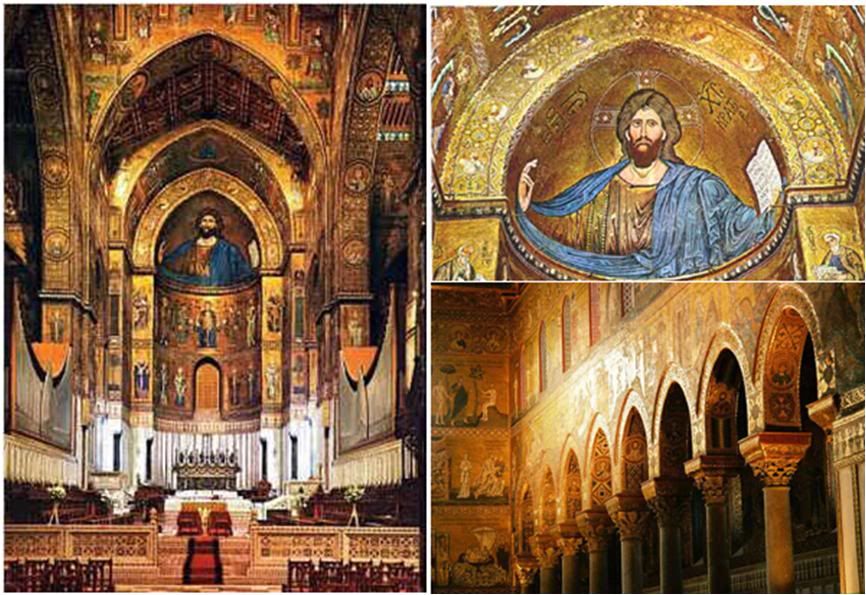
[Modificato da TERESA BENEDETTA 21/04/2013 02:25] |
| |
 04/10/2010 13:12 04/10/2010 13:12 |
|
| | | OFFLINE | | Post: 21.146
Post: 3.783 | Registrato il: 28/08/2005
Registrato il: 20/01/2009 | Administratore | Utente Master | |
|
 Monday, Oct. 4, 27th Week in Ordinary Time
Monday, Oct. 4, 27th Week in Ordinary Time
MEMORIAL OF ST. FRANCIS OF ASSISI
 Some portraits of Francis, from left: Detail from earliest known portrait, done in his lifetime, before 1224, is a fresco in the Chapel of St. Gregory at the Benedictine convent of Subiaco; Francis and the Angels, Botticelli, 1480; by Zurbaran, 1658; Francis receives the stigmata, Fra Angelico, 1440; from the Pesaro altarpiece by Giovanni Bellini, 1474; by El Greco, 1585.
SAN FRANCESCO D'ASSISI (Italy, 1181-1226), Deacon, Founder of the Franciscan Orders, Mystic, Patron of Italy, Patron of Ecologists
Some portraits of Francis, from left: Detail from earliest known portrait, done in his lifetime, before 1224, is a fresco in the Chapel of St. Gregory at the Benedictine convent of Subiaco; Francis and the Angels, Botticelli, 1480; by Zurbaran, 1658; Francis receives the stigmata, Fra Angelico, 1440; from the Pesaro altarpiece by Giovanni Bellini, 1474; by El Greco, 1585.
SAN FRANCESCO D'ASSISI (Italy, 1181-1226), Deacon, Founder of the Franciscan Orders, Mystic, Patron of Italy, Patron of Ecologists
In addition to his discourses on St. Francis when he visited Assisi in 2007, Benedict XVI devoted his catechesis last January 27
www.vatican.va/holy_father/benedict_xvi/audiences/2010/documents/hf_ben-xvi_aud_20100127...
to a saint whom he has mentioned most often next to St. Augustine during his Pontificate, perhaps because he embodies the Pope's own ideal. Calling him 'a great saint and a joyful man', he went on to note in the January catechesis: "There subsists an intimate and indissoluble relationship between holiness and joy... There is only one sorrow in the world: not to be saints, to be close to God... Looking at the testimony of St Francis, we understand that this is the secret of true happiness: to become saints, close to God!" Increasingly, Benedict XVI's message - as to the young people in Palermo yesterday - is a call to holiness. St. Francis's story is well-known, but perhaps little noted is that though he founded an order, he was never a priest himself. And yet, as Benedict XVI noted: "Francis always showed great deference towards priests, and asserted that they should always be treated with respect, even in cases where they might be somewhat unworthy personally. The reason he gave for this profound respect was that they receive the gift of consecrating the Eucharist. Dear brothers in the priesthood, let us never forget this teaching: the holiness of the Eucharist appeals to us to be pure, to live in a way that is consistent with the Mystery we celebrate".
Readings for today's Mass:
www.usccb.org/nab/readings/100410.shtml
No OR today.
THE POPE'S DAY
The Holy Father met today with
- All the bishops of Brazil's Northeast Sector 1, on ad limina visit, whom he met with individually last week.
Address in Portuguese.
[Modificato da TERESA BENEDETTA 04/10/2010 13:13] |
| |
 04/10/2010 14:19 04/10/2010 14:19 |
|
| | | OFFLINE | | Post: 21.147
Post: 3.784 | Registrato il: 28/08/2005
Registrato il: 20/01/2009 | Administratore | Utente Master | |
|

 Rome begins planning
Rome begins planning
for Irish visitation
by PADDY AGNEW in Rome

Oct. 4, 2010
PREPARATIONS FOR the forthcoming Apostolic Visitation to Ireland begin in earnest this week in the Holy See.
The "visitors", various Curia cardinals and four Irish bishops come together for a series of meetings intended to co-ordinate both the whole thrust of the visitation and various logistical arrangements.
The visitation, a highly unusual step when applied to almost an entire local church, was announced by Pope Benedict XVI in his letter to the Irish faithful last March.
It is to "assist the local church on her path of renewal" following publication of reports outlining the scale of clerical sex abuse in Ireland.
Given that the visitation will begin in the four metropolitan archdioceses of Ireland (Armagh, Dublin, Cashel and Emly, and Tuam), the bishops of those same archdioceses - Cardinal Seán Brady, Archbishop Diarmuid Martin, Archbishop Dermot Clifford and Archbishop Michael Neary - will be in Rome this week to help with the planning.
Various Vatican departments including the Secretariat of State, the Congregation for the Clergy, the Congregation for Catholic Education, the Congregation for Institutes of Consecrated Life and the Congregation for the Doctrine of the Faith are expected to be involved in the planning of the visitation which will be co-ordinated by the Congregation of Bishops.
In a three-way process, the Vatican Curia will most likely meet separately with the visitors and the Irish bishops, while the visitors may well take the opportunity to meet with the bishops to whose diocese they have been assigned.
While the visitation has obviously been prompted by the Irish Catholic Church's child sex abuse crisis, especially in the light of the revelations of last year's Ryan and Murphy reports, Vatican commentators suggest it would be reductive to see the visitation as concerned only with the sex abuse issue.
In a broader sense, the visitation is intended to "offer assistance" to the Irish bishops as they set about a process of "desired spiritual and moral renewal" in the wake of the profound damage inflicted by the sex abuse scandals not only on the victims but also on ordinary Irish Catholics.
The offers of "assistance" may take many different forms but what is clear is that while the visitors will be expected to ask many awkward and embarrassing questions of their fellow bishops, they will also be called on to do a lot of listening.
To a certain extent, the visitation is equivalent to HQ at a multi-national sending a taskforce delegation of trouble shooters to check out what went wrong at the local branch.
Inevitably, the visitation will be closely monitored as commentators assess just how far Pope Benedict wants to push what one commentator calls "the process of renewal and concrete clean-up".
In Vatican terms, too, the visitation represents the first major test of the new Prefect of the Congregation of Bishops, Canadian Cardinal Marc Ouellet, a man already being tipped as a possible successor to Benedict. [I wish Vaticanistas would stop indulging in this kind of speculation. They're forgetting that none of them even remotely dreamed before the fact that Albino Luciani. Karol Wojtyla or Joseph Ratzinger would ever become Pope!]
There's a poisonous commentary in today's Irish Independent about this visitation
www.independent.ie/opinion/analysis/there-is-no-one-to-watch-vatican-watchmen-2363...
that completely misrepresents what it is, and is written from the extremely biased and downright erroneous point of view that the structure of the Church should be democratized!
|
| |
 04/10/2010 16:16 04/10/2010 16:16 |
|
| | | OFFLINE | | Post: 21.148
Post: 3.785 | Registrato il: 28/08/2005
Registrato il: 20/01/2009 | Administratore | Utente Master | |
|
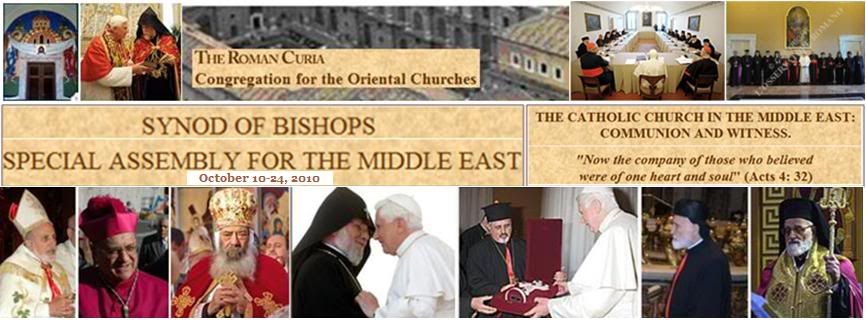 Special synodal assembly aims
Special synodal assembly aims
to boost Church presence in Mid-East
By John Thavis 
VATICAN CITY, Oct. 4 (CNS - The Vatican is setting the stage for another Synod of Bishops in mid-October, this one aimed at turning a spotlight on the Christian communities of the Middle East.
Synods are typically drawn-out affairs, requiring several years of planning and more years of follow-up. But there's a greater sense of urgency about this synod.
Pope Benedict XVI convened it rather unexpectedly a year ago, after Church leaders from the region — particularly Iraq — requested the special assembly.
The problems of the minority Christian churches in the Middle East are well-known. A short list would include the massive emigration of Christians, political and military conflict, economic hardship, travel restrictions, discrimination and interreligious tensions, especially in predominantly Muslim countries.
The Pope decided a special synod assembly was needed when he visited the Holy Land last year. The papal visit briefly turned the Church's attention to the daily struggles of Christian communities there; now the Pope wants to bring those struggles to the heart of the universal church for more systematic discussion.
The sspecial assembly will run Oct. 10-24 and focus on the theme, "The Catholic Church in the Middle East: Communion and Witness", with the epigram 'Now the company of those who believed were of one heart and soul', from the Acts of the Apostles. It reflects the unity of the early Church — something that plays into the agenda of this assembly.
As the Vatican explains it, the goal of the special assembly is to strengthen Christians in their faith, identity and deepen communion among the mosaic of particular churches that exist in the region, so that they can witness the faith more effectively in their societies.
Synod planners are underlining ecumenical cooperation as an essential aspect of credible Christian witness in the Middle East.
Representatives from other Christian churches have been invited to speak to the assembly, and so have Jewish and Muslim guests. With Catholic representatives numbering well over 150, there will be many voices to hear in a relatively short time span.
To some extent, the Christian plight in the Middle East can be seen in numbers. According to estimates provided by the Franciscan Custody of the Holy Land, there are about 16.5 million Christians in the Middle East today, representing 4.6 percent of the population. Of that number, 5.7 million are Catholics, or 1.6 percent of the total population.
Those numbers are down considerably from 100 years ago, and in some countries the drop has been steepest in recent years. In Iraq, Christians represented close to 7 percent of the population 30 years ago; now it's 1.2 percent. Lebanon was the only Middle Eastern country with a Christian majority 40 years ago, but the Christian population today is thought to be well below 50 percent.
Syria and Jordan have also experienced widespread Christian emigration, and in the Palestinian territories of the Holy Land, the Christian population is estimated by church officials at 200,000 — with only 35,000 Catholics — but many think the actual number might be much lower.
The special assembly will gather bishops and other participants from Middle Eastern countries that stretch from Egypt to Iran, as well as representatives from other countries.
In 2005, Pope Benedict modified synod rules to allow for more free discussion, but the main topics of this assembly have already been distilled in preliminary documents:
- Relations with Muslims: The crux here is religious freedom, and the synodal assembly's working document analyzed the problem in unusually blunt language. It said that in predominantly Muslim countries where Islam is the state religion or where Islamic law is applied in society, human rights are eroded.
"Islamic states generally do not recognize religious freedom and freedom of conscience, instead they acknowledge freedom of worship, which excludes the freedom to preach a religion different from Islam, much less embrace a religion other than Islam. Furthermore, with the rise of Islamic fundamentalism, attacks against Christians are increasing almost everywhere," the document said.
— Religious extremism. While being careful not to criticize Islam with too broad a brush, the preparatory documents have underlined the threat posed by the rise of a radical "political Islam" that doesn't hesitate to resort to violence. The bishops are expected to call for joint Christian-Muslim action against extremist currents.
- Regional political conflicts: In particular, the assembly will hear reports from bishops in Iraq, Lebanon, Israel and the Palestinian territories. The Israeli-Palestinian conflict will undoubtedly receive detailed discussion at the synod.
- Emigration: The assembly will examine the causes of what has been called a Christian "exodus" from the Middle East. In general, the bishops are convinced that peace and democracy, combined with economic development, will create social and cultural environments in which Christians no longer feel the need to leave.
At the same time, emigration is not being seen as a strictly negative phenomenon, because it has created a network of support around the world. Likewise, the assembly will also look at the more recent arrival of Christian immigrants from Africa and Asia, who are often subject to new forms of discrimination.
- Relations with Judaism: The assembly will discuss Catholic-Jewish relations, but in doing so will try to distinguish between the religious sentiments of anti-Judaism and the political animosity between Arabs and Jews.
- Catholic educational and social services: Education is seen as the Church's best investment for the future in the Middle East. Because its network of schools, hospitals and charity activities are open to all, they also demonstrate in concrete terms the Church's openness and willingness to find common ground with Muslims and others. The bishops are likely to remind the universal Church that these activities rely on outside assistance.
- Changing religious and cultural values: The preparatory documents have emphasized that the Middle East is not immune from the values -- or loss of values -- introduced by the mass media and electronic communications.
This "ambiguity of modernity," as synod planners have termed it, is seen as a threat to Christians and is also an issue with many Muslims, who perceive it as a cultural invasion from the West. Protecting the nature and stability of the family is viewed as a particular concern by synod fathers.
- Scripture: Finally, the assembly is expected to underline the importance of Scripture in the lands of tehe Bible, and urge Middle Eastern Catholics to read and reflect on the Bible in order to strengthen their historical identity.
[Modificato da TERESA BENEDETTA 04/10/2010 16:16] |
| |
 04/10/2010 18:37 04/10/2010 18:37 |
|
| | | OFFLINE | | Post: 21.150
Post: 3.787 | Registrato il: 28/08/2005
Registrato il: 20/01/2009 | Administratore | Utente Master | |
|

 A new idea of the Ordinariate is emerging:
A new idea of the Ordinariate is emerging:
No longer as a halfway house for disaffected
Anglo-Catholics leaving the Church of England
Editorial
By The Catholic Herald

Saturday, 2 October 2010
The plans for the Ordinariate for ex-Anglicans are gathering pace.
One of the last things Pope Benedict XVI said before leaving Britain, and one of the most important, was to emphasise that the Ordinariate is the next step towards Church unity.
It was not the step that we were led to expect during the years of negotiation with Anglicans about corporate unity. But it is prophetic – and the prophet in question is our present Holy Father, who believes that Anglicans who already accept the Magisterium of the Church should be given freedom to worship and evangelise in communion with Rome as a matter of urgency.
A new image of the Ordinariate is emerging. When Anglicanorum coetibus was first published, the media and some religious commentators depicted it as a halfway house for “disaffected” Anglo-Catholics who were “defecting” from the Church of England and other Anglican churches around the world. That language is increasingly redundant.
The leaders of the Ordinariate project have passed through their stage of disaffection. As the Rt Rev Andrew Burnham, the Anglican Bishop of Ebbsfleet and one of the architects of the scheme, made clear at an Anglo-Catholic synod held immediately after the Pope’s visit, we will soon see the formation of “small congregations, energetically committed to mission and evangelism and serving the neighbourhood in which they are set”.
Similar plans are being drawn up in other countries with a strong Anglican presence: last week, Archbishop Donald Wuerl of Washington was chosen to oversee the formation of Ordinariate parishes in America.
It is time to set aside, for the time being, the much-debated question of how many Anglicans will take advantage of the Apostolic Constitution. Let us focus instead on the core words of Bishop Burnham’s message: his flock is “energetically committed to mission and [local] evangelisation”.
Future members of the Ordinariate are offering to help revitalise the Christian mission of the Catholic Church in England and several other countries.
It is a wonderful prospect, made possible by their faithful witness to the Gospel over many years and the vision of the Holy Father. Ignore the cynics and hand-wringers who see only difficulties in this historic development: we live in exciting times.
The first anniversary of Anglicanorum coetibus is fast approaching. After the initial media hustle-and-bustle about it, little has been made of it, considering that it is an unprecedented and therefore historical document in the history of the Church and of ecumenism.
Where all the other Christian denominations that split off from the Catholic church since the Reformation have gone on to splinter into dozens of offshoots themselves, the Church of Rome has not had a single serious splinter group since the Counter-Reformation.
The nearest one can name because it has been remarkably organized and has a worldwide following, even if numerically insignificant. are the Lefebvrians who have not declared an independent Church, only that they are not in communion with Rome over objections to some Vatican II interpretations.
Surely all this says volumes about the strength of the Church as an institution compared to all the other breakaway 'churches' which now, more than ever, are likely to fragment further as they seek to adapt to every shift in the world's social and cultural mores.
Perhaps I am too naive - and all I know about Church history is what I can fact-check easily - to consider Anglicanorum coetibus as potentially the most forward-looking and original of Benedict XVI's many initiatives. Not as dramatic as John XXIII convoking Vatican II but perhaps more significant and enduring in the long run. Nonetheless, may it be so! [At least, until he springs his next surprise.]
[Modificato da TERESA BENEDETTA 04/10/2010 18:37] |
| |
 05/10/2010 04:27 05/10/2010 04:27 |
|
| | | OFFLINE | | Post: 21.153
Post: 3.790 | Registrato il: 28/08/2005
Registrato il: 20/01/2009 | Administratore | Utente Master | |
|
 The Pope in Sicily
The Pope in Sicily
Editorial
by Giovanni Maria Vian
Translated from the 10/4-10/5 issue of

Ten hours were sufficient for Benedict XVI to speak to the true heart of Palermo, of Sicily and of the Sicilians. And through them, to all of Italy, as he said in his meeting with the youth, the last event but what the Pope himself called 'the central one', in a day that was truly memorable.
It was a visit that allowed hundreds of thousands of persons - perhaps as many as half a million, if one combines those who were present at the different events and those who turned out on the streets - to welcome the Bishop of Rome to one of the most beautiful of European capitals.
He came to confirm the Sicilians in their faith and returned home confirmed in turn by the faith and hope of the Sicilians. He underscored this earlier to the young people and families at the final event, exchanging tender hugs with those who joined him on stage.
The visit was an important event, not just for Sicily. But most of the Italian media appeared to have failed to appreciate what the event truly was and what it had demonstrated - between news agencies that failed to take an overview of the whole day, and national newspapers which did not think the event merited Page 1. With the notable exception of some TV newscasts and Page 1 references in La Repubblica and L'Unita. [How ironic, considering that Repubblica is the leading anti-Church newspaper, and L'Unita is the Communist newspaper! But really, what happened to Il Giornale and Il Foglio? It's odd that neither Andre Tornielli nor Paolo Rodari have reported so far...]]
And there was the London newspaper Independent, which ignored the strong condemnations of the Mafia by Benedict XVI, making us miss the exemplary coverage provided by the British media during the Pope's state visit there. [Actually, the Independent perversely chose to stay with the one and only story filed by all the Anglophone news agencies, whose common line was that the Pope failed to mention the Mafia by name during his homily at the Mass - which was only the first of five papal texts for the day, during which he was quite explicit about the Mafia.]
The Pope condemned organized crime many times, starting with the homily at the mammoth Mass by the Mediterranean, and with unequivocal clarity. Three times he recalled Don Pino Puglisi, the priest 'killed by the Mafia' in 'a barbarous assassination', adding his voice to what the Sicilian bishops have been preaching.
And at the end of the visit, he added a symbolic gesture which will be remembered. In the dying light of day along the highway, he stopped to lay flowers and say a silent prayer at the roadside monument in Capaci in memory of judge Giovanni Falcone, Francesca Morvillo, Rocco Dicillo, Antonio Montinero and Vito Schifani - victims of a deadly ambush which has become an emblem of the Sicilians' fight against the Mafia.
In Palermo, Benedict XVI left words which will not be forgotten, bringing "strong encouragement not to be afraid to bear clear witness to human and Christian values" and raising his tone to say "We must be ashamed of evil, of that which offends God and man. We should be ashamed of evil when it infests the civilian and religious community with activities that cannot stand the light of day".
He later exhorted the young people, and certainly not just those of Sicily, not to be afraid to oppose evil. "Do not yield," he said, to the blandishments of the Mafia, which is a way of death, incompatible with the Gospel".
But how to overcome so many difficulties, the problems of daily life and its ever more urgent concerns? The Pope repeated his answer in the three major meetings he had and summarized it to the young people: By going to the roots, keeping alight in families - as the first place where children are educated - the flame of faith that is handed down from generation to generation" in a Christian land like Sicily with its ancient traditions and vitality.
And that Sicily has a future if her people imitate the men and women whom the land and its traditions had raised in sanctity albeit silently - in order to create new hope from the certainty that no one can take away the joy and the certainty of the faith. With a Church that, at the service of everyone, can and wants to help Sicily to breathe again.
AP, AFP and Reuters did not even bother to report on the Pope's other events in Palermo. Perhaps because subsequent events gave the lie quite sweepingly to their initial headline - in which they stressed how anti-Mafia activists were disappointed that the Pope had not been more forceful against the Mafia in his homily and had not, in fact, even mentioned the Mafia by name; and secondarily, comparing Benedict XVI unfavorably with John Paul II who in one of five visits to Sicily, had called on the Mafia in prophetic tones to repent because they will be judged by God.
And so, none of the news agencies saw fit to write about the Pope's unscheduled roadside stop to pay tribute to the victims of the Mafia and praying for all such victims, even if they did feed the photos of the event that were provided by L'Osservatore Romano.
Another media problem highlighted during the Palermo visit has to do with crowd estimates. The first stories in English - even those by CNA - said 'Palermo polic'e estimated the crowd at 30,000. Which stumped me because during the live coverage of the Mass, the Vatican Radio commentators started out by saying that "Organizers expected 100,000 for this Mass but clearly there are more than 100,000 present today".
Then, later on, some time around Communion, the commentator said "We have just been told by the Palermo police that they estimate the crowd at more than 200,000, perhaps as many as 250,000".
Therefore, it was quite an outrage to read the Anglophone wire stories an hour later citing 30,000 as the figure - when I had seen the TV cameras sweep over the crowd. Even the Palermo police could not have been so dumb as to say that crowd only numbered 30,000!
The above has to be borne in mind when reading the following post-visit report from CNA. In a way, it is almost condescending to the Pope, as in, "Gee, you did it again! It's a miracle!" As if it could not possibly happen unless it was a miracle. It is distressing when Catholic media itself - and even, as this story claims, the #2 man at the Vatican press office - takes this kind of an attitude toward Benedict XVI, like John Allen at his most cynical. Sorry to bring him up again - it's just that since he writes more often about the Pope than his colleagues in the Anglophone media, he is bound to be correspondingly more on record with his cynical, often unwarranted digs.]
 Pope Benedict's Sicily visit
Pope Benedict's Sicily visit
draws another 'miracle' turnout

Vatican City, Oct 4, 2010 (CNA/EWTN News).- Contrary to preliminary reports from Sicily on Sunday, the crowds attending papal events in the island's capital city were "never before seen in Italy."
According to an official from Holy See's Press Office who was on the ground at the event, this is just the latest occurrence in a continuous "crescendo" of "miracle" turnouts for Pope Benedict XVI.
The Holy Father visited Sicily for just 10 hours on Sunday, but according to press office figures, he was seen by nearly 300,000 people. Three major events marked the day's schedule, two of which were outdoors on a very hot, clear day.
Police figures originally put the figure at 30,000 people for the morning Mass on the seafront esplanade called the "Foro Italico." But the sub-director of the Holy See's Press Office, Fr. Ciro Benedettini, who was able to get the official estimates from local authorities, said on Monday that the figure was "around 200,000." [Why couldn't the CNA reporter in Palermo ask the Palermo police himself for the figure??? Why get it second-hand?]
From his vantage point at the altar, he said, there were people as far as the eye could see, and accompanying the Pope's every movement across the city there was a robust line of people to greet him as he passed.
Of these and the "at least 30,000" young people and families that showed for the afternoon encounter with the Holy Father in a city square, Fr. Benedettini said that for a pastoral visit in Italy, "they are the highest figures we have ever seen."
A "consistent crescendo" of interest has followed the Pope recent trips, he said, which include the U.K., where the Pope was also seen by hundreds of thousands of people. An estimated 500,000 attendees joined the Pope for Mass at the Marian shrine in Fatima, Portugal, during his visit there last May.
He also referred to the reverent silence of the crowds during events at which the Pope presides as a “miracle.” The same total silence was observed on Sunday in Sicily, just as it was at Mass in Glasgow's Bellahouston Park, at London's Hyde Park during the prayer vigil and also at Blessed Cardinal Newman's beatification Mass in Birmingham.
Not wishing to make a comparison with turnouts for celebrations during John Paul II's five visits to the island, Fr. Benedettini emphasized his positive impressions to journalists in the Vatican press office on Monday, asking, "Did you see the enthusiasm of the young people? They were as happy with Pope Benedict and more."
OR devotes its usual Monday-Tuesday double issue to the Sunday visit to Palermo, limited this time to the Papal texts and Vian's editorial. No wrap-up story, strangely enough. And the choice of pictures was not exactly stellar. And, of course, one wishes they could post more online (I somehow think the paper edition does contain more pictures):
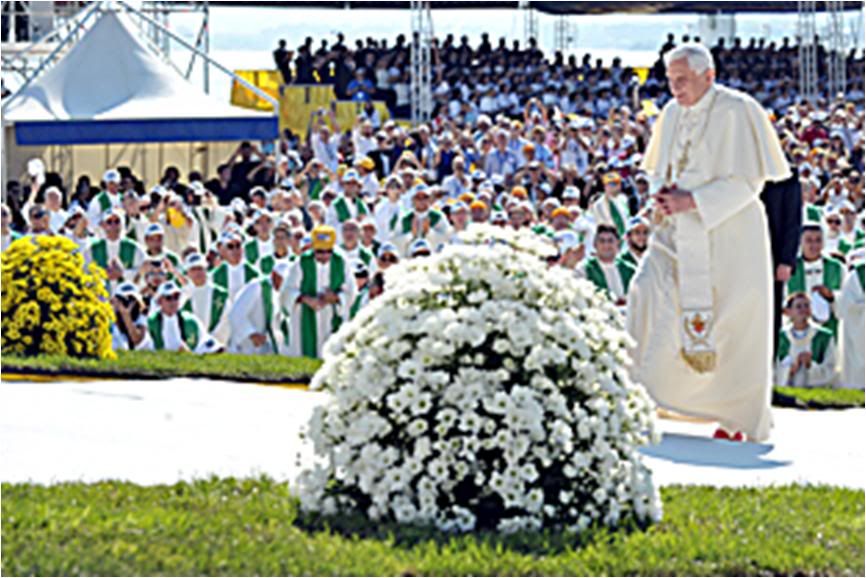
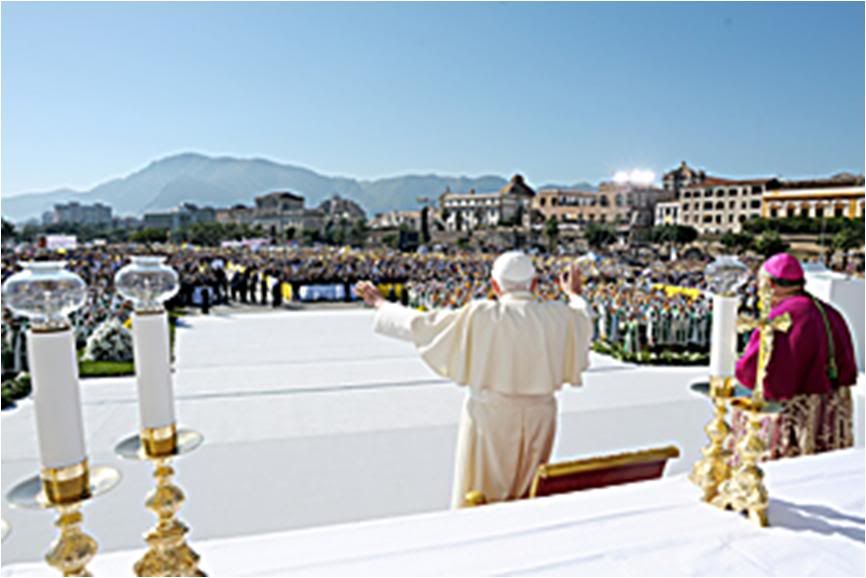
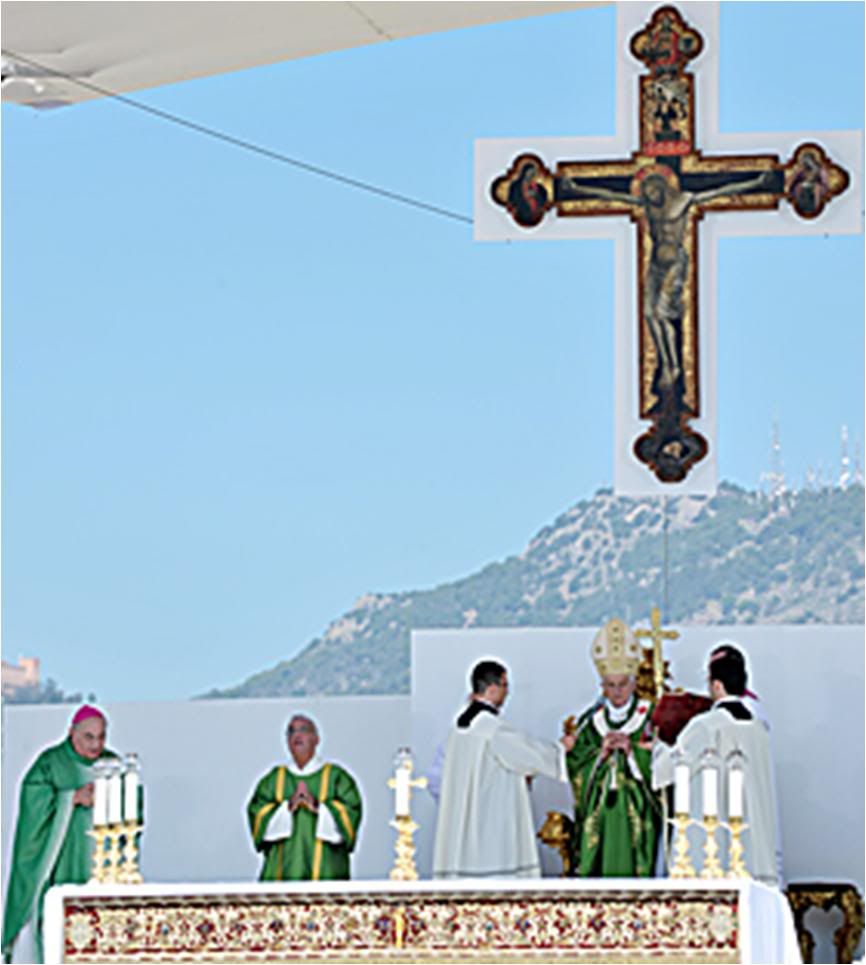
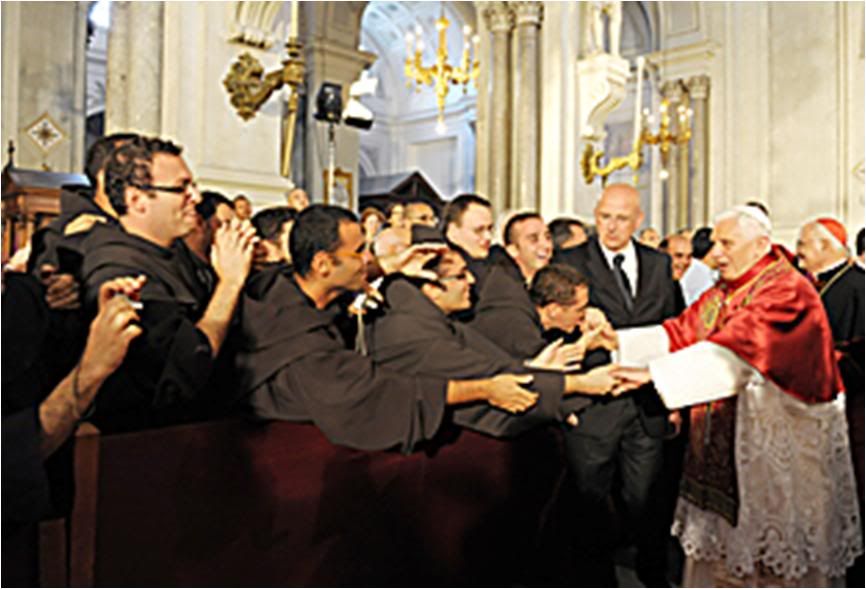
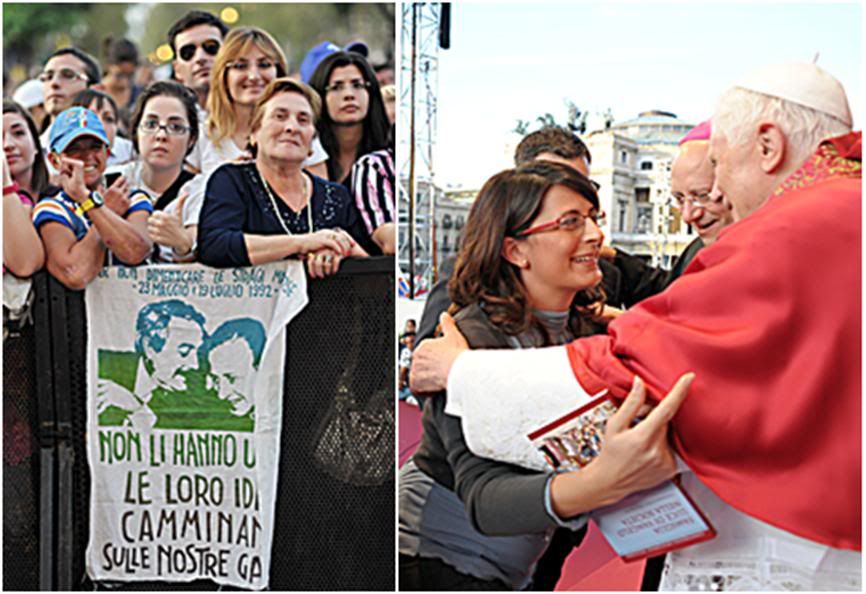
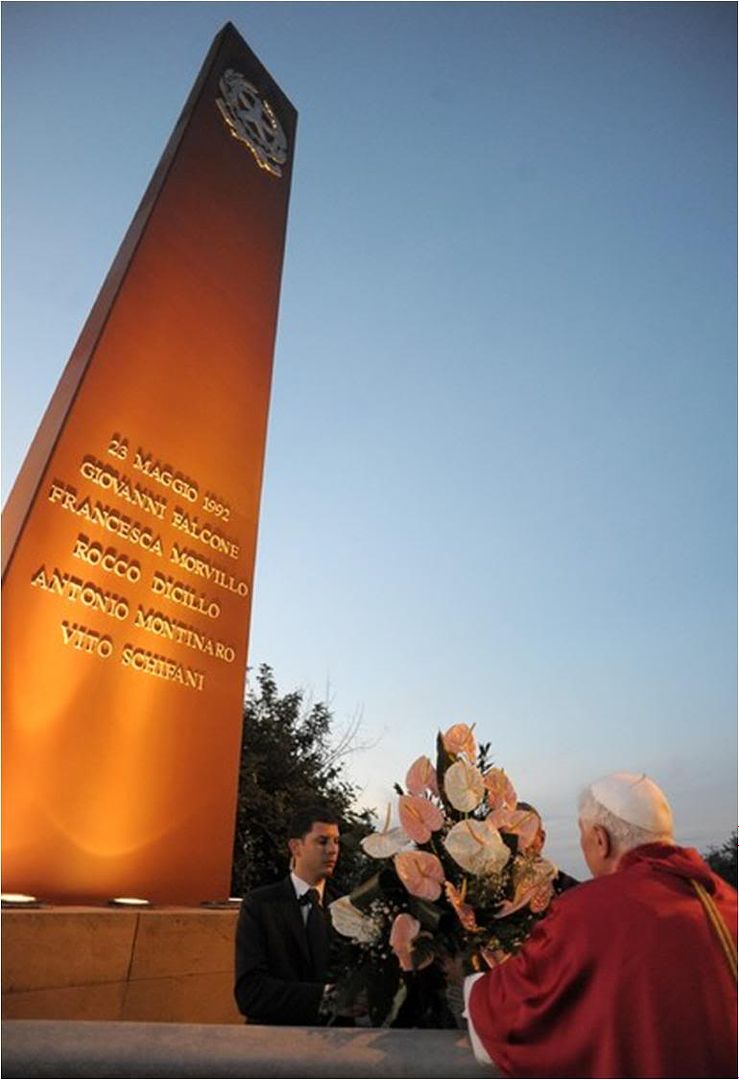 This is the picture they chose for Page 1.
La Stampa's Vaticanista Giacomo Galeazzi has written for his blog for what obviously his editors could find no space in their news pages. Once before, I remember Galeazzi doing this - during the Pope's visit to Genoa. similarly under-covered and under-rated in the Italian press. Galeazzi does not muzzle his personal reactions in his blog entries. His title states a fact that the Vatican press official earlier would not commit himself to, in the CNA story.
For Benedict XVI, crowds never
This is the picture they chose for Page 1.
La Stampa's Vaticanista Giacomo Galeazzi has written for his blog for what obviously his editors could find no space in their news pages. Once before, I remember Galeazzi doing this - during the Pope's visit to Genoa. similarly under-covered and under-rated in the Italian press. Galeazzi does not muzzle his personal reactions in his blog entries. His title states a fact that the Vatican press official earlier would not commit himself to, in the CNA story.
For Benedict XVI, crowds never
seen before in Palermo


Oct. 4, 2010
250,000 faithful at the Mass at Foro Italico, 500,000 all in all during the visit to Palermo. Even in Sicily, Benedict XVI surpassed the most optimistic expectations for attendance, as he did in the recent trip to the United Kingdom (600,000 turned out to see him in a nation with 6 million Catholics).
"The people appreciate and understand his message which is simple and strong," according to some in the Secretariat of State.
Never had so many people gathreed in Sicily for a religious event. And Benedict XVI's strong words against the Mafia and in favor of a moral rebirth for the island were welcomed as liberating.
"In Palermo, as in all of Sicily, there is no lack of difficulties, problems and concerns. I think especially of those who live their cexistence concretely in precarious conditions, because of lack of employment, uncertainty about the future, physical and moral sufferings, and because of organized crime".
For Papa Ratzinger, in such a situation which is humanly despairing, the Christian should not allow himself to be defeated. "The temptation to be discouraged, to be resigned," he pointed out, "comes to those who are weak in faith, who confuse good with evil, to those who think that in the face of evil, nothing can be done. On the contrary, he who is firmly founded on faith, who has full trust in God and lives in the Church, is able to bring forth the explosive power of the Gospel".
"Jesus invites us to be humble," he said earlier, "but not to be cowardly", citing Paul in his letter to Timothy, who wrote: "For God did not give us a spirit of cowardice but rather of power and love and self-control".
Let us dare, was the German Pope's challenge to the Catholics of Sicily. And for him, this means Sicilians should put everything into the proper formation of the younger generations. That is why, he said, both the Church and civilian authorities should support the family.
"Each of us needs fertile ground in which to root ourselves, rich soil with nutritive substances which make the person grow - Christian values, above all, love and faith, knowing the true face of God, the awaresness that he loves us infinitely, faithfully, patiently to the point of giving himself for us".
 Pope's surprise gesture:
Pope's surprise gesture:
He pays tribute to slain judge
and other Mafia victims
by MARCO ANSALDO
Translated from

"He who commits evil must be ashamed. I am thinking of the problems of Palermo and particularly, the physical and moral suffering caused by organized crime".
It was no furious cry as that made by Pope John Paul II at the Valley of the Temples in Agrigento 17 years ago ("Repent! One day, the judgment of God will come!").
But during his ten hours in Palermo, Papa Ratzinger, with his restrained style, likewise denounced - and in an unexpectedly powerful way just before leaving Palermo - the Mafia and its affiliates, accompanied during his visit by at least 250,000 persons - more than twice the expected attendance at the big Mass event, on a hot day that marked his first visit to Sicily as Pope.
A visit that turned out to be almost completely marked by his firm opposition to the Mafia. In the afternoon, before the young people of Sicily, the Pope said the words that many had been waiting for, that were not said during his homily at Mass.
"Do not yield to the blandishments of the Mafia," he said, enunciating the word well to a burst of applause and fist-waving, "which is a way of death, totally incompatible with the Gospel, as your bishops have told you so many times".
And to the 30,000 young people and families from all parts of Sicily who had come to this meeting, Benedict XVI cited models to be followed, from the Focolari member Chiara Badano who died of cancer at 19, beatified last Sunday, to Rosario Livatino, a judge killed by the Mafia at age 38.
"In Sicily," he said, "there are splendid examples of young men and women who have grown like beautiful, luxuriant plants. Often they do not make the news, because evil makes more noise, but they constitute the strength and the future of Sicily. Do not be afraid to oppose evil! Together you will be like a forest that grows, silently, but capable of bearing fruit, of bringing life and of profoundly renewing your land".
In the evening on the road to the airport at Punta Raisi, Papa Ratzinger made an unscheduled stop in Capaci, to leave flowers and offer prayers at the spot where Judge Giovanni Falcone, his wife and three security men were ambushed and killed by the Mafia.
John Paul II had made five trips to Sicily in his 26 years as Pope. At times yesterday, Papa Ratzinger echoed words said earlier by his predecessor, in the morning when he urged Sicilians not to be afraid or organized crime, and not to yield to being resigned, recalling heroic figures like Don Pino Puglisi.
The example of that parish priest, who was killed by the Mafia in 1993, and whose cause for beatification is in process, was first recalled by Benedict XVI in his morning homily.
"Those who are firmly founded in the faith, who have full trust in God and live within the Church," he said, "are capable of summoning the explosive power of the Gospel. That is how they acted - the saints, male and female, who flowered in the course of centuries, in Palermo and all of Sicily, as well as laymen and priests in our day who are well known to you, like Don Pino Puglisi. "Imitate his heroic example," he would urge priests, religious and seminarians later, when he met them in the Cathedral of Palermo.
"In Palermo, as in all of Sicily, there is no lack of difficulties, problems and concerns. I think especially of those who live their existence concretely in precarious conditions, because of lack of work and uncertainty about the future. I am among you today to bear witness to my nearness and that I remember you in prayer. I am here to give you strong encouragement".
Many were happy at the Pope's words. From European Parliament member Rita Borsellini, sister of another Mafia-assassinated judge ("A clear and strong message against the Mafia, which gives hope and warms the heart of every honest Sicilian"), to representatives of the
Junior Commission of Addiopizzo ['Goodbye to bribes and contracts'), an association active in denouncing organized crime ("After listening to the Pope's words about fighting organized crime," said one of their counselors, "the young people are very encouraged and will write the Pope a letter of thanks").
The enthusiasm among the people was great, literally engulfing the Pope in a collective embrace during an intense day in Palermo. There were a few streamers critical of the Church but the police moved them away.
Said an old cabdriver, watching the Popemobile leave the city, "This blessed man should come here every month, so that our streets are cleaned and people will stop double parking anywhere!"

[Modificato da TERESA BENEDETTA 05/10/2010 06:45] |
| |
 05/10/2010 15:45 05/10/2010 15:45 |
|
| | | OFFLINE | | Post: 21.154
Post: 3.791 | Registrato il: 28/08/2005
Registrato il: 20/01/2009 | Administratore | Utente Master | |
|
 Pope to Brazilian bishops:
Pope to Brazilian bishops:
Mission is the essence of the Church

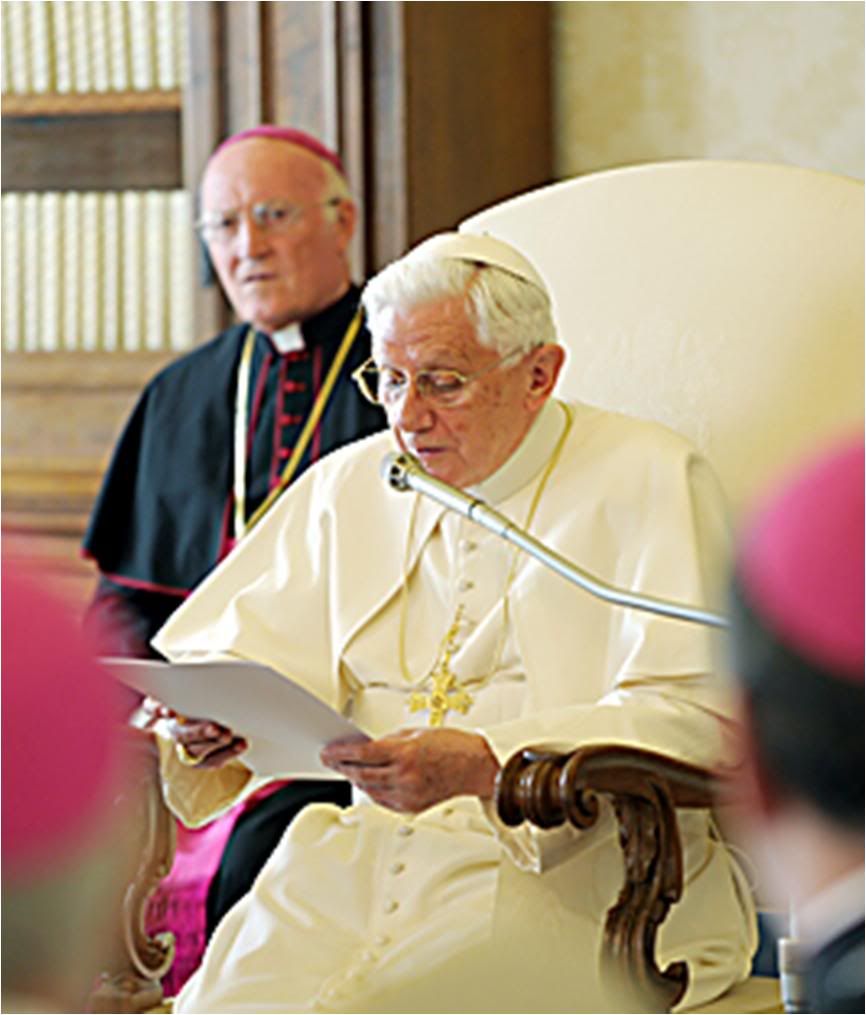
4 OCT 2010 (RV) - Pope Benedict has met with bishops from Brazil’s, North-1 and Northeast regions, who have just completed their "ad limina" visit.
In his address the Pope praised the efforts made by the bishops who, "often lacking the necessary means", bring "the Good News of Jesus to all corners of the Amazon jungle, in the knowledge that God wants all mankind to be saved and to know the truth".
"God can achieve this salvation in extraordinary ways that only He knows. Nonetheless, if His Son came, it was to show us, through His word and life, the ordinary ways to salvations, and He told us to transmit this revelation to others with His authority. And so we cannot avoid this thought: man may be saved by other ways, thanks to God's mercy, without the announcement of the Gospel. But can I be saved if through negligence, fear, shame or erroneous ideas, I fail to announce it?"
"Sometimes we hear the objection that imposing the truth - though it be the truth of the Gospel and of salvation - can be a violation of religious freedom", said the Holy Father, in which context he quoted words of Paul VI:
"It would, of course, be a mistake to impose anything on the conscience of our brothers and sisters, but propounding knowledge of the truth of the Gospel and the salvation of Jesus Christ, with absolute clarity and full respect for the free choice of conscience (hence without coercion or dishonest persuasion), ... far from being an attack on religious freedom, is a homage to that freedom, which can choose a route that even non-believers consider noble and edifying. ... To present Christ and His kingdom in a respectful way, more than a right, is a duty of evangelisation".
"The call to mission", the Pope went on, "is not directed exclusively to a restricted group of members of the Church; rather, it is an imperative addressed to all the baptised, an essential element of their vocation".
The Pope also referred to the Fifth General Conference of the Episcopate of Latin America and the Caribbean which he attended in the Brazilian city of Aparecida in 2007 and which had among its goals the recovery of the missionary dimension of the Church.
"The challenges of the current time could lead to a reduced view of the mission", the Holy Father observed.
"Yet mission cannot be limited to a mere search for new ways to make the Church more attractive and capable of overcoming the competition of other religious groups or relativist ideologies.
The Church does not work for herself. She is at the service of Jesus Christ and exists to ensure the Good News is accessible to everyone. The Church is catholic precisely because she invites all human beings to experience new life in Christ.
Mission, then, is neither more nor less than the natural consequence of the very essence of the Church, a service of the ministry of unity which Christ wished to achieve in His crucified body."
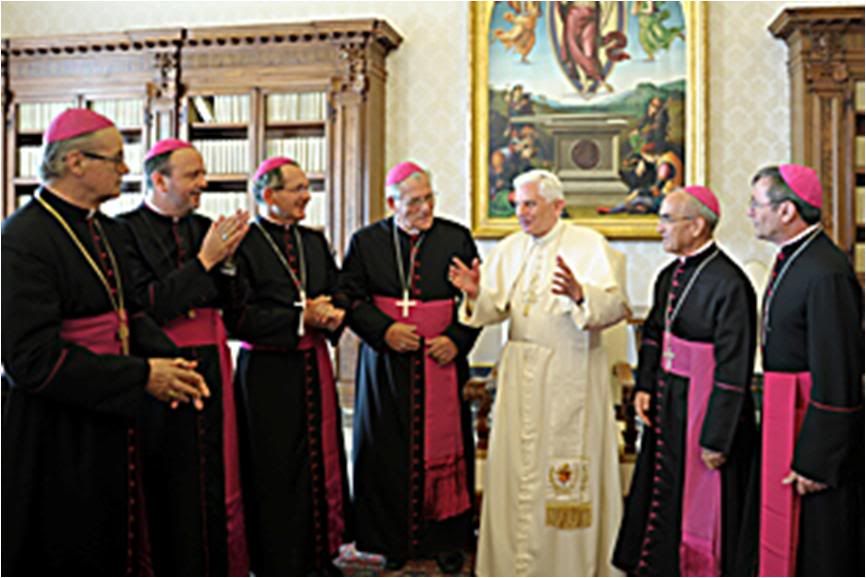
|
| |
 05/10/2010 15:55 05/10/2010 15:55 |
|
| | | OFFLINE | | Post: 21.155
Post: 3.792 | Registrato il: 28/08/2005
Registrato il: 20/01/2009 | Administratore | Utente Master | |
|
 Barcelona's archbishop expects
Barcelona's archbishop expects
500,000 for the Pope's visit

Barcelona, Spain, Oct 4, 2010 (CNA/Europa Press).- Cardinal Lluis Martinez Sistach of Barcelona said last Friday that the archdiocese is expecting “nearly half a million people” to show up for Pope Benedict XVI’s visit to Barcelona, where he will consecrate the 'Sagrada Familia' or Church of the Holy Family.
The prelate noted that the visit will be an expression of the Holy Father's affection for Spain. “I think the city wants to see him,” he said, adding that hundreds are expected to welcome Benedict XVI on November 6, outside the archdiocesan cathedral.
Cardinal Sistach said 30,000 chairs will be set up outside the Church of the Holy Family for the celebration and that 300 priests, as well as 1,500 volunteers, will distribute the Eucharist to the faithful. For security reasons, he explained, only 6,500 people will be allowed to inside the church.
Television screens will be set up throughout the interior of the church to help those present follow the ceremony, as the structure's 52 columns will make it difficult for many to see the main altar.
Asked about the papal motorcade route from the cardinal’s residence to the Sagrada Familia, Cardinal Sistach said details will likely be announced during a press conference on October 6.
The Holy Fahter will arrive in on the evening of Nov. 6, after spending the day in Santiago de Compostela as a pilgrim to the tomb of the apostle St. James the Greater on the current Ano Jacobeo, or Year of St. James.
|
| |
|
|
|
|